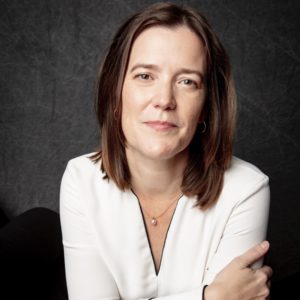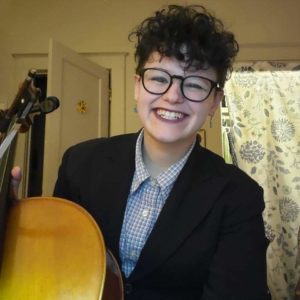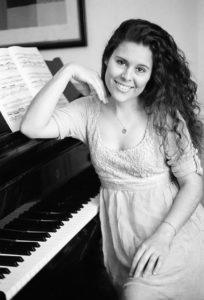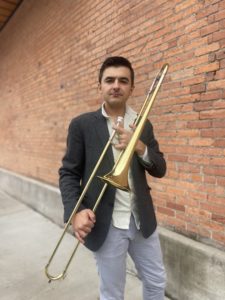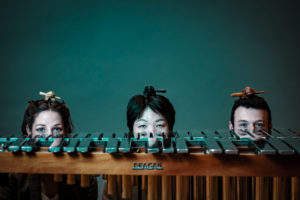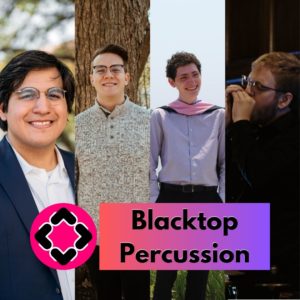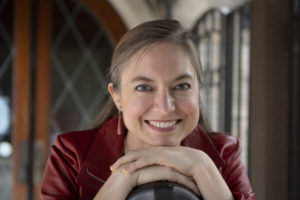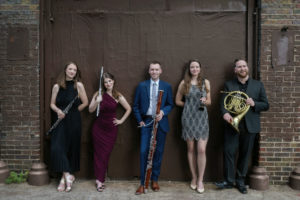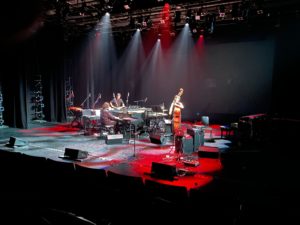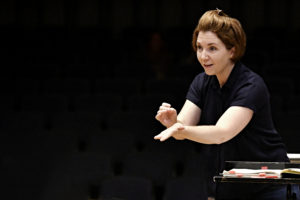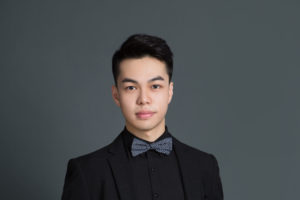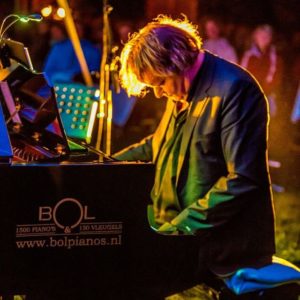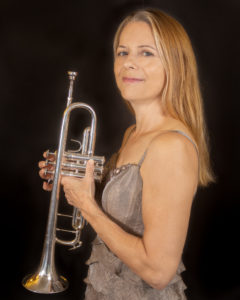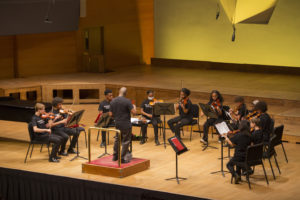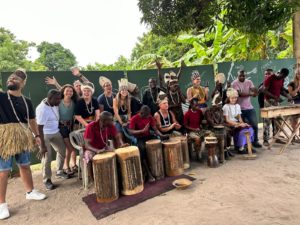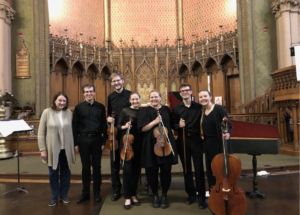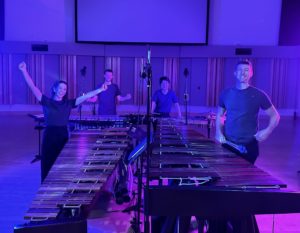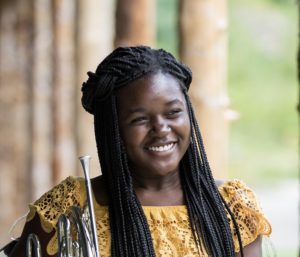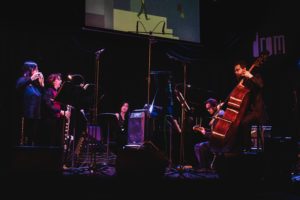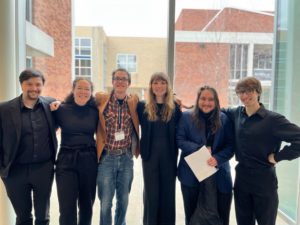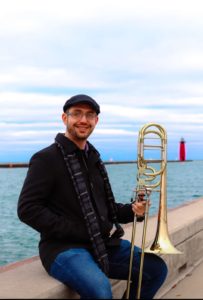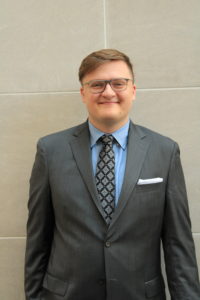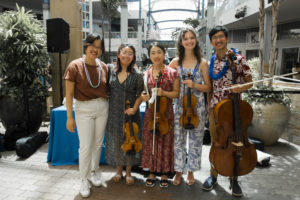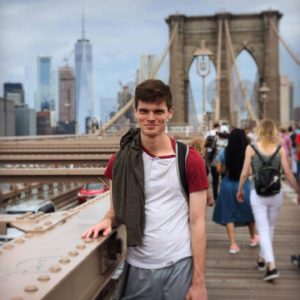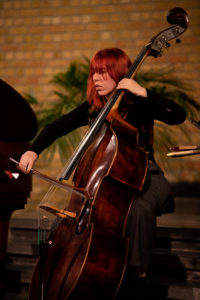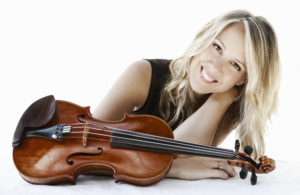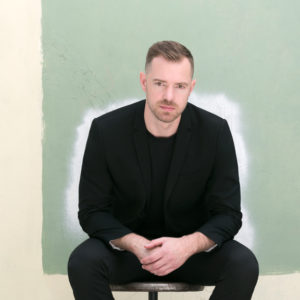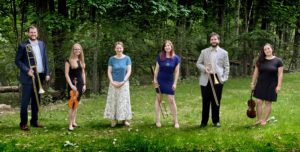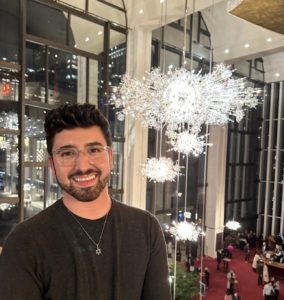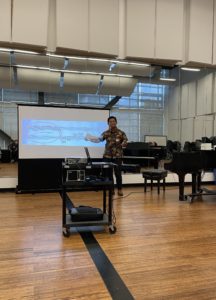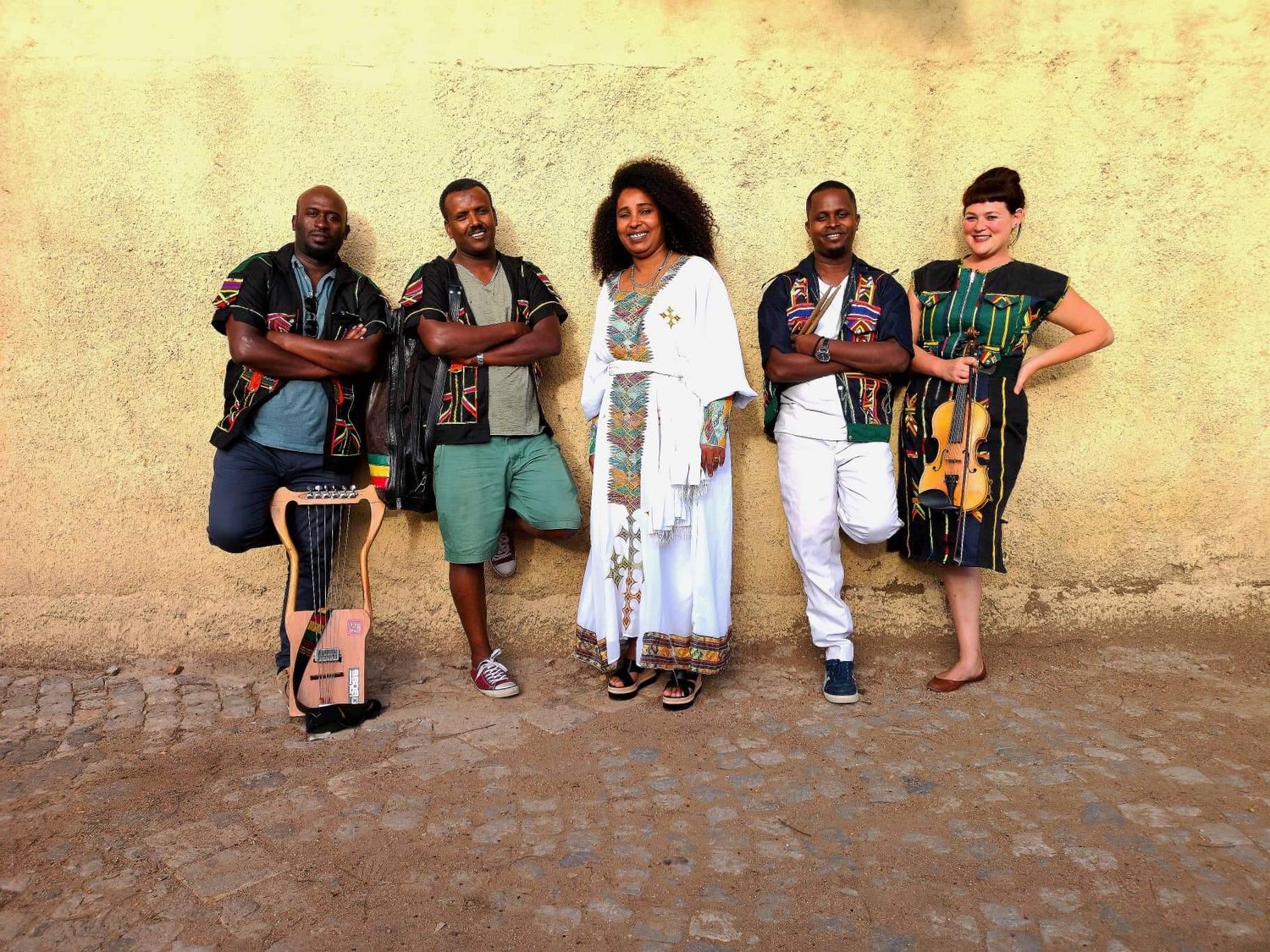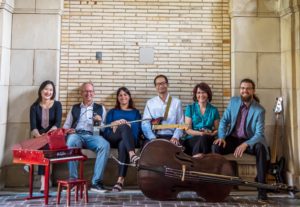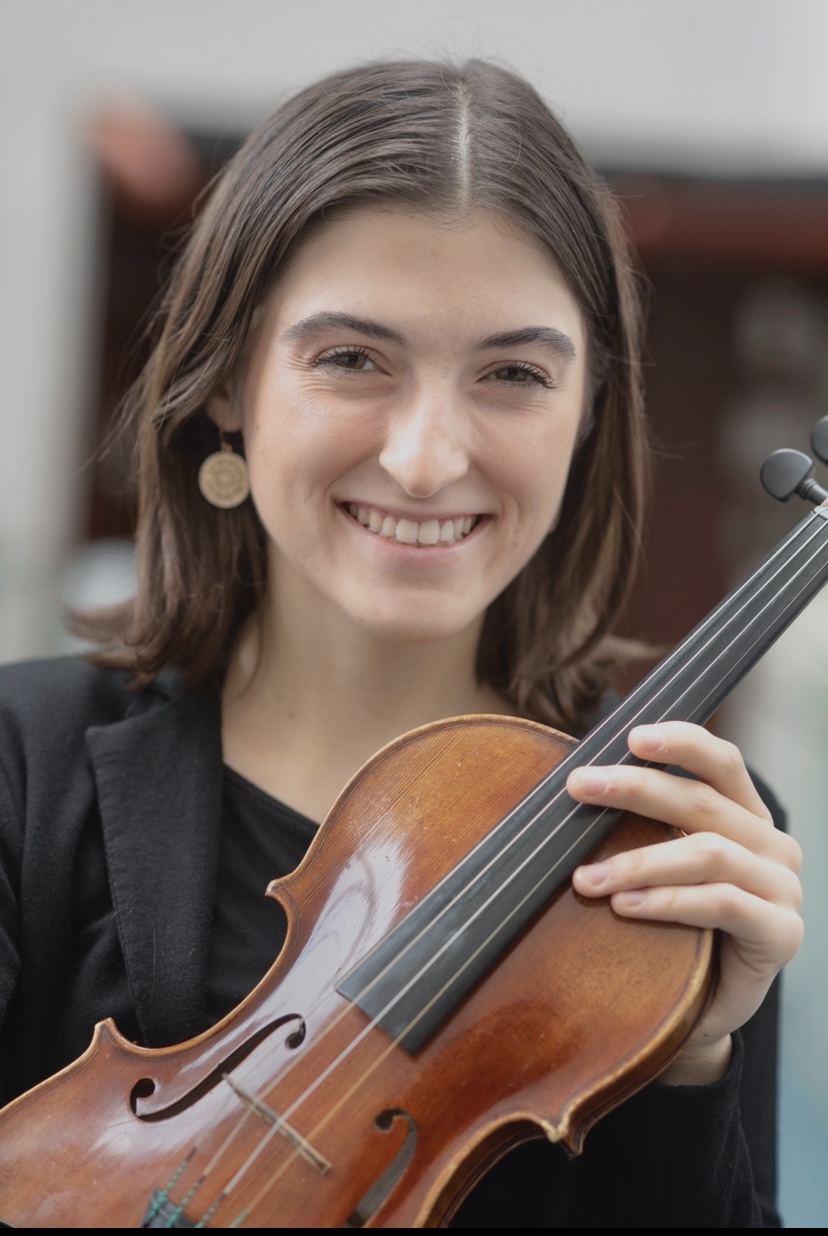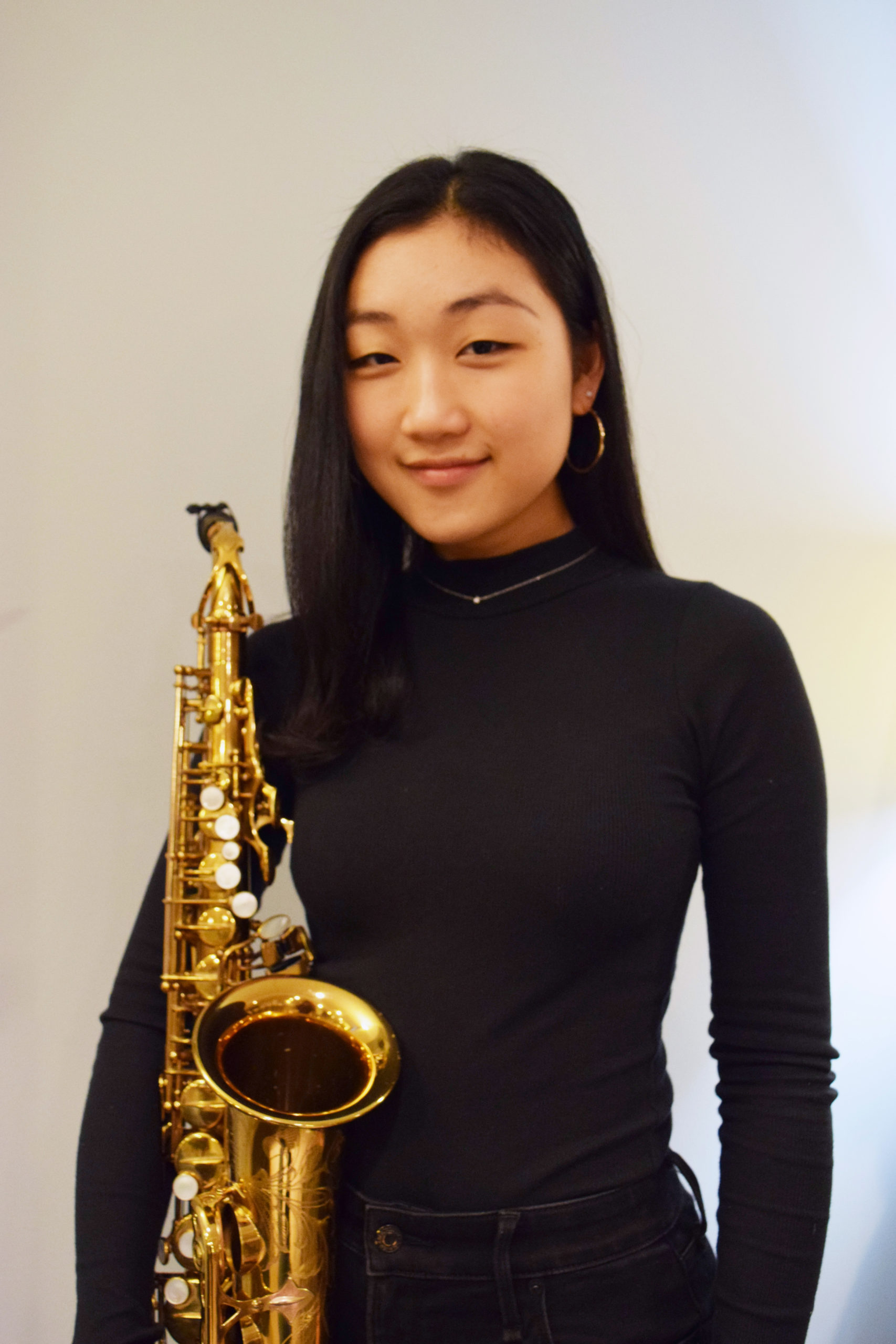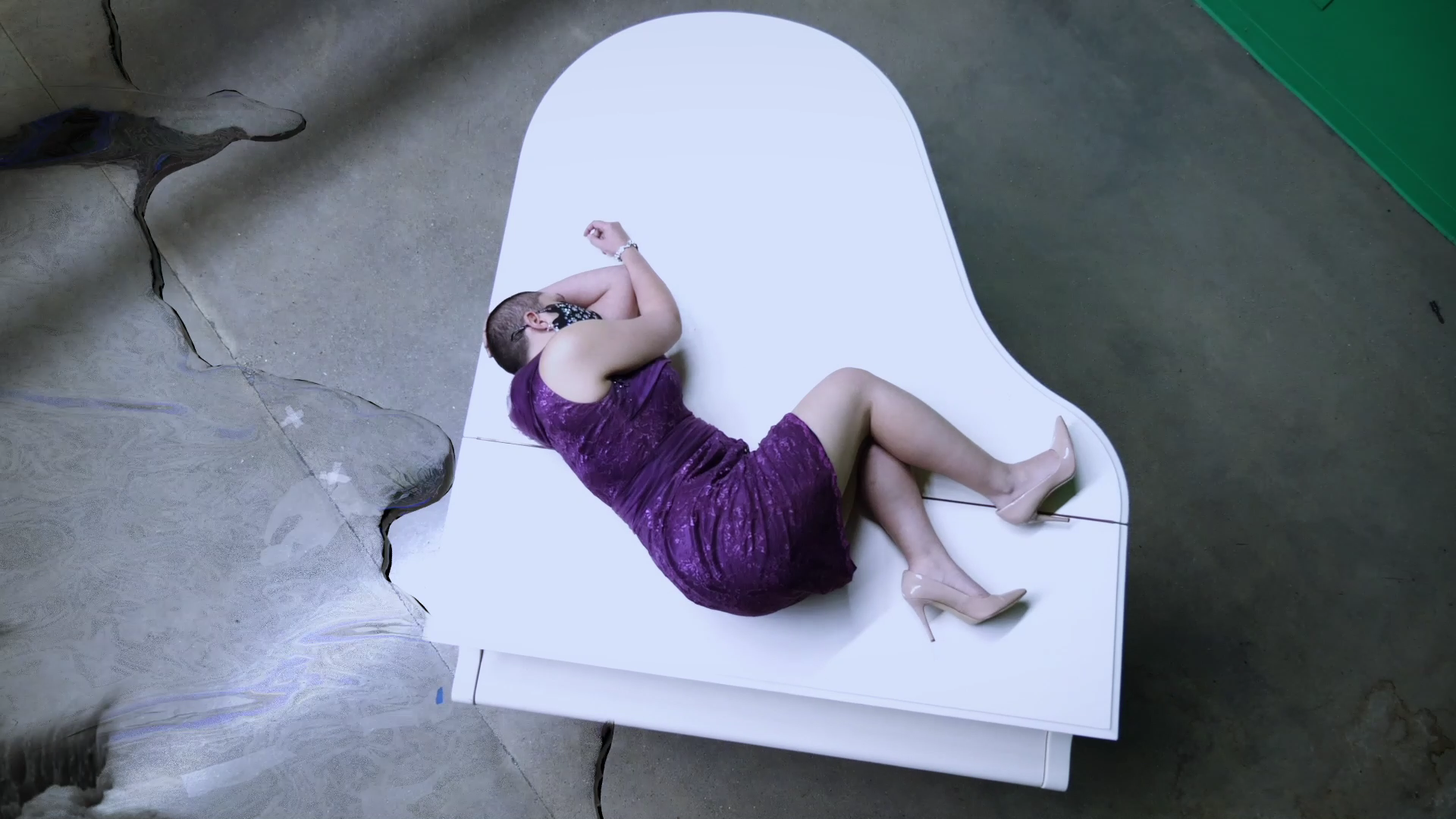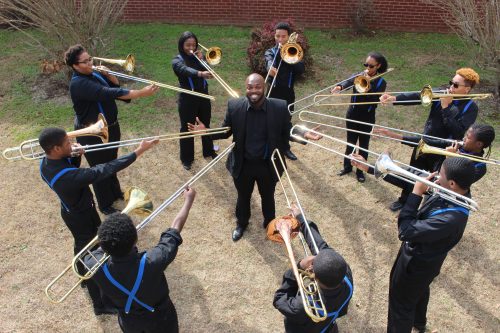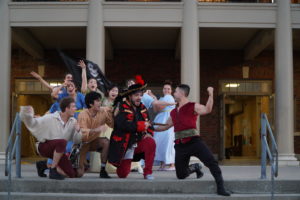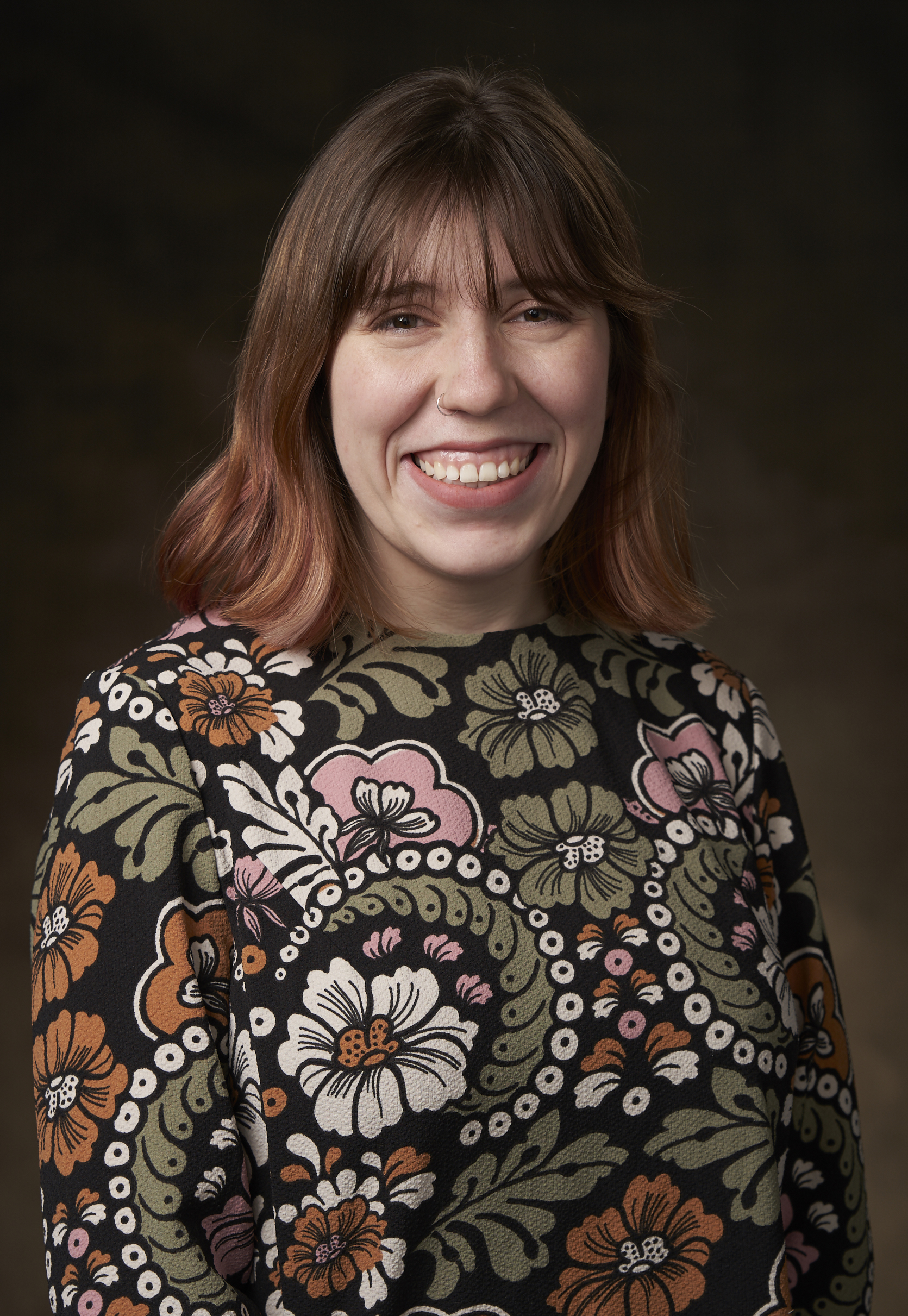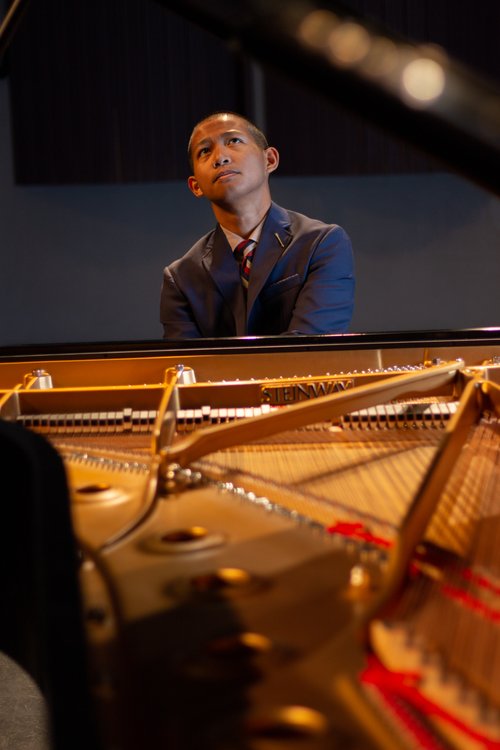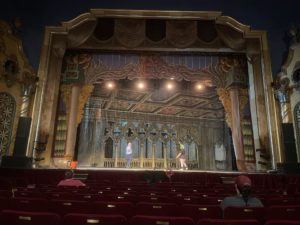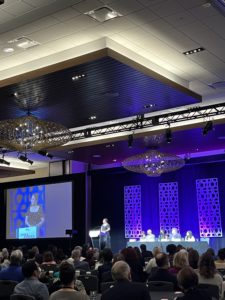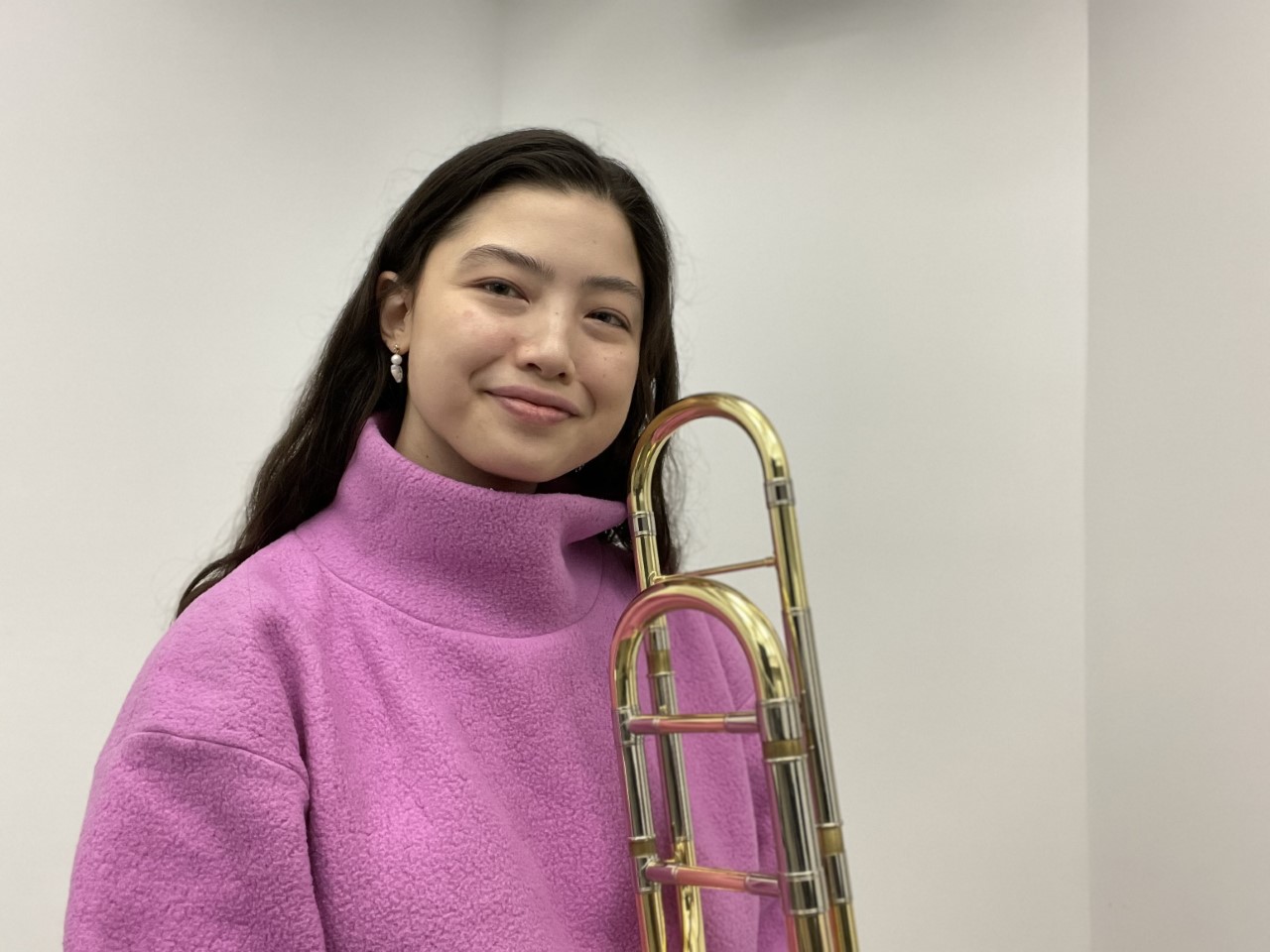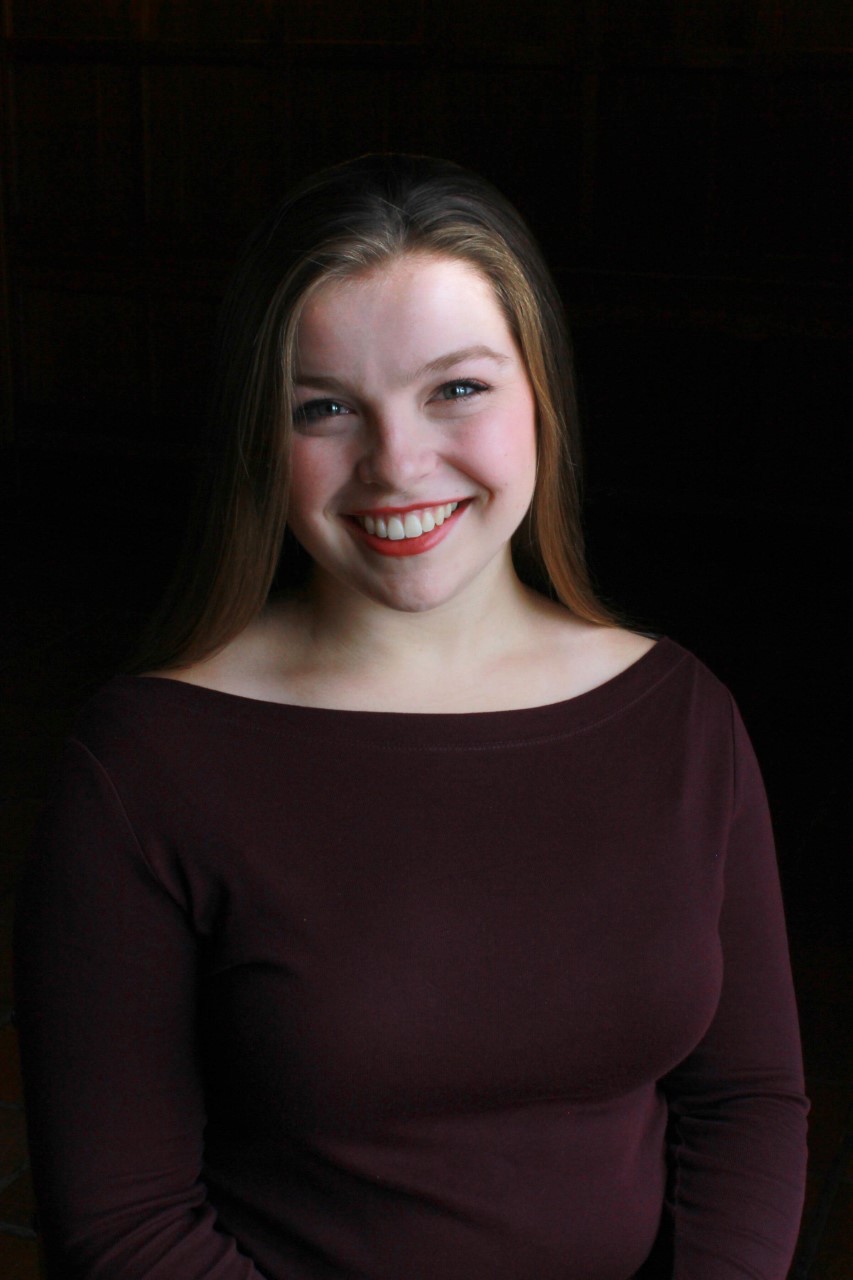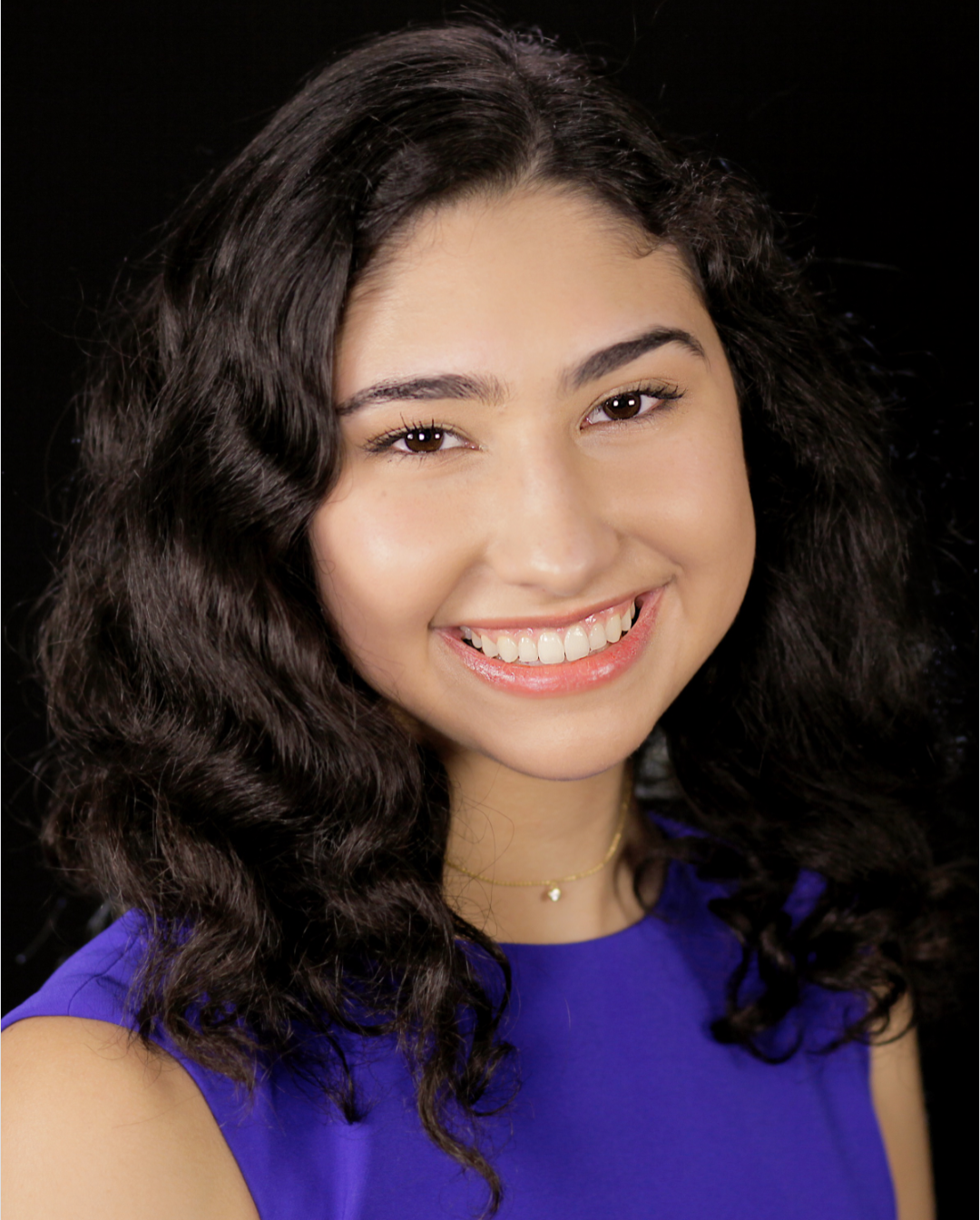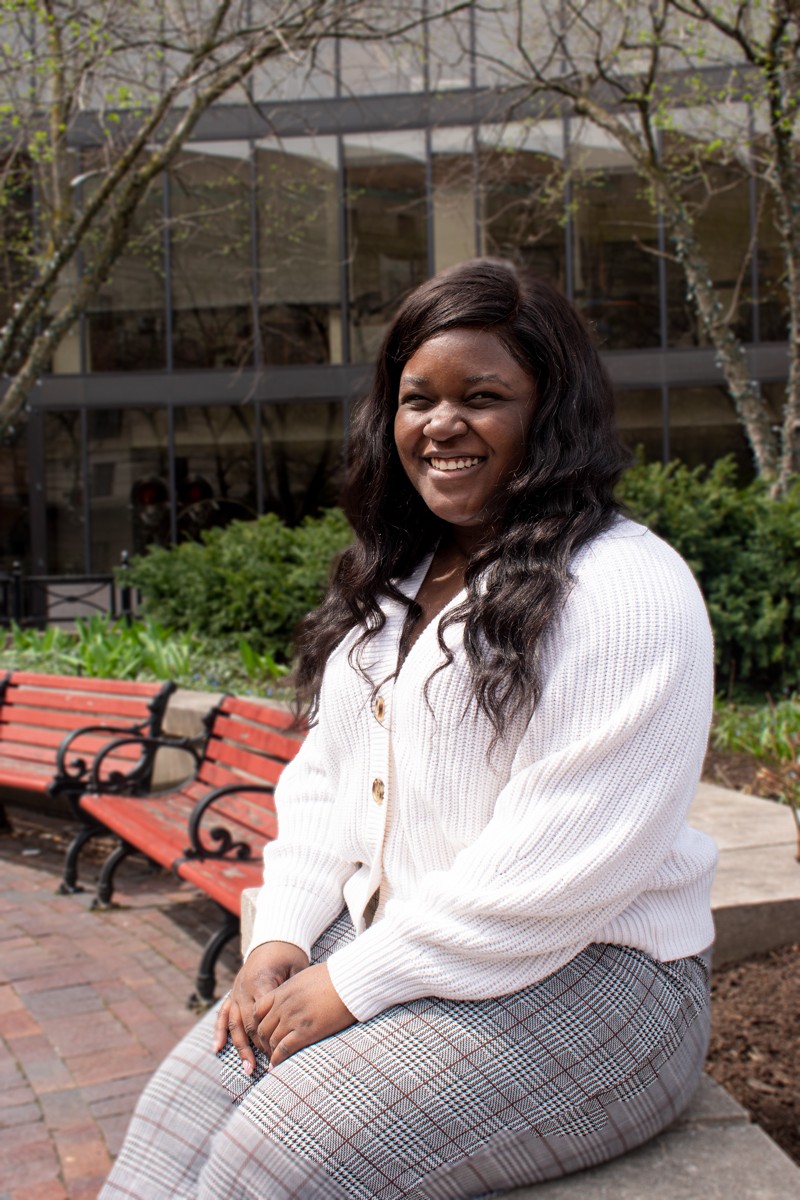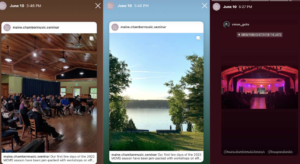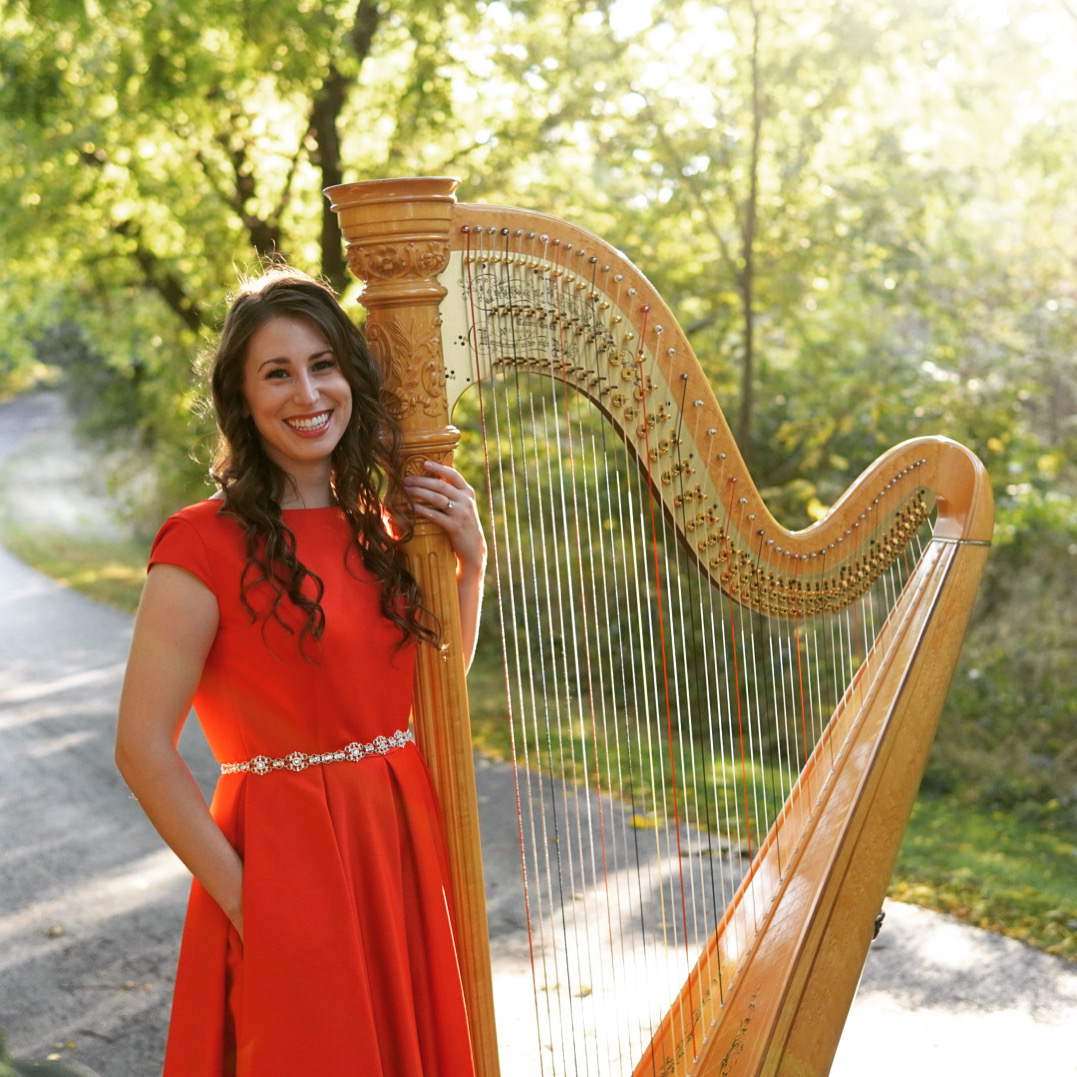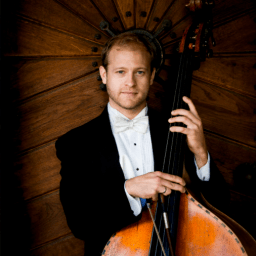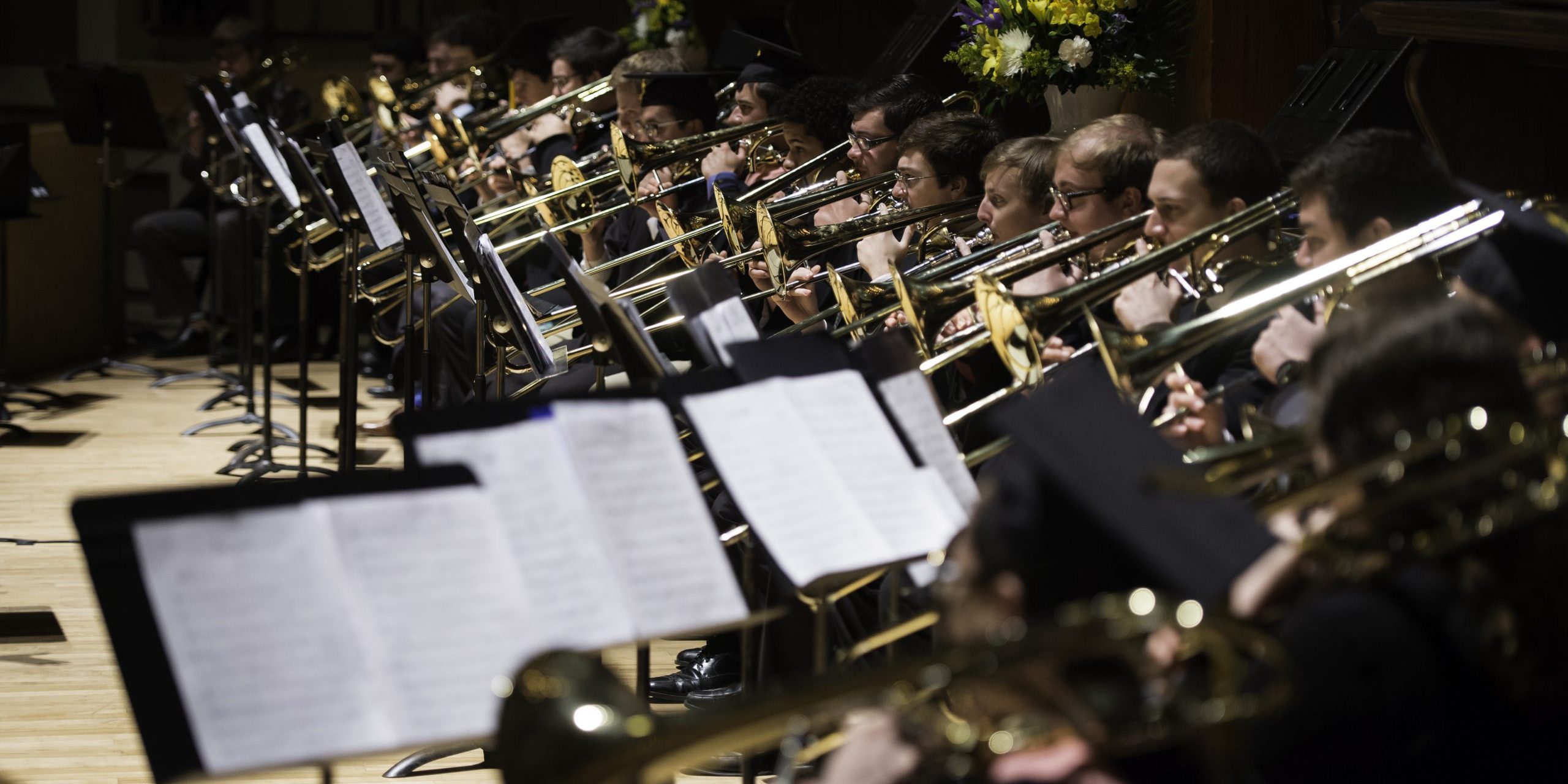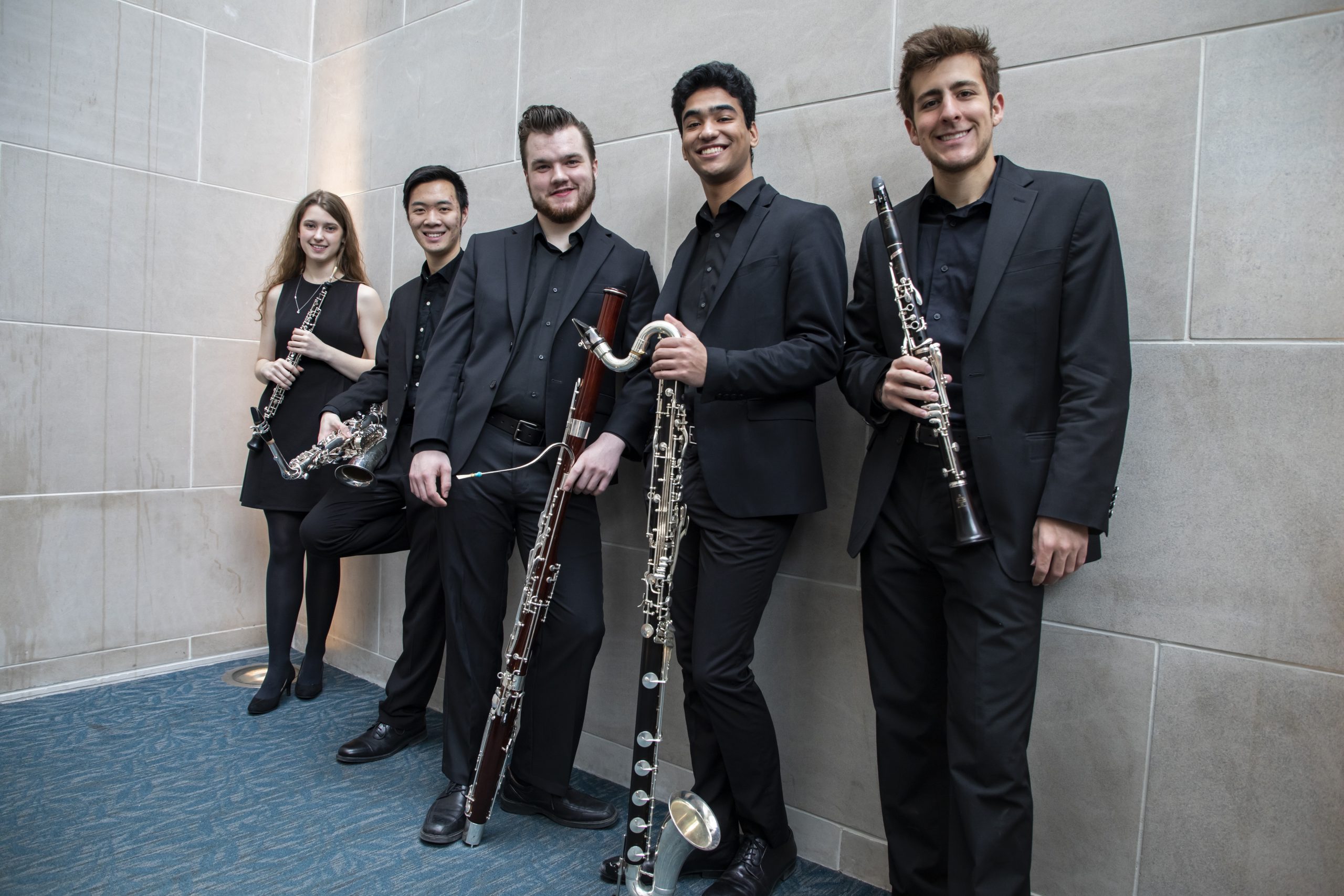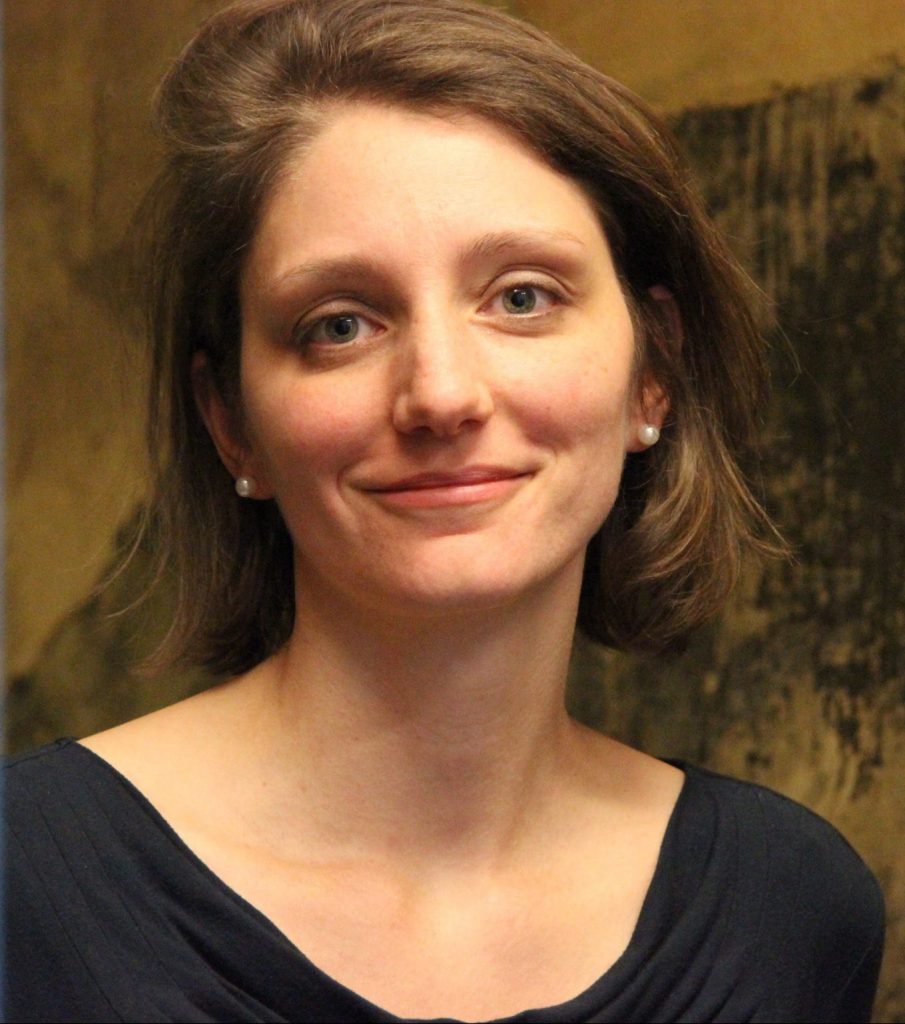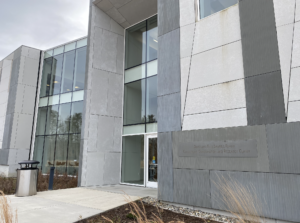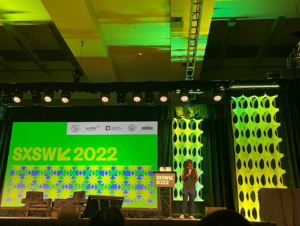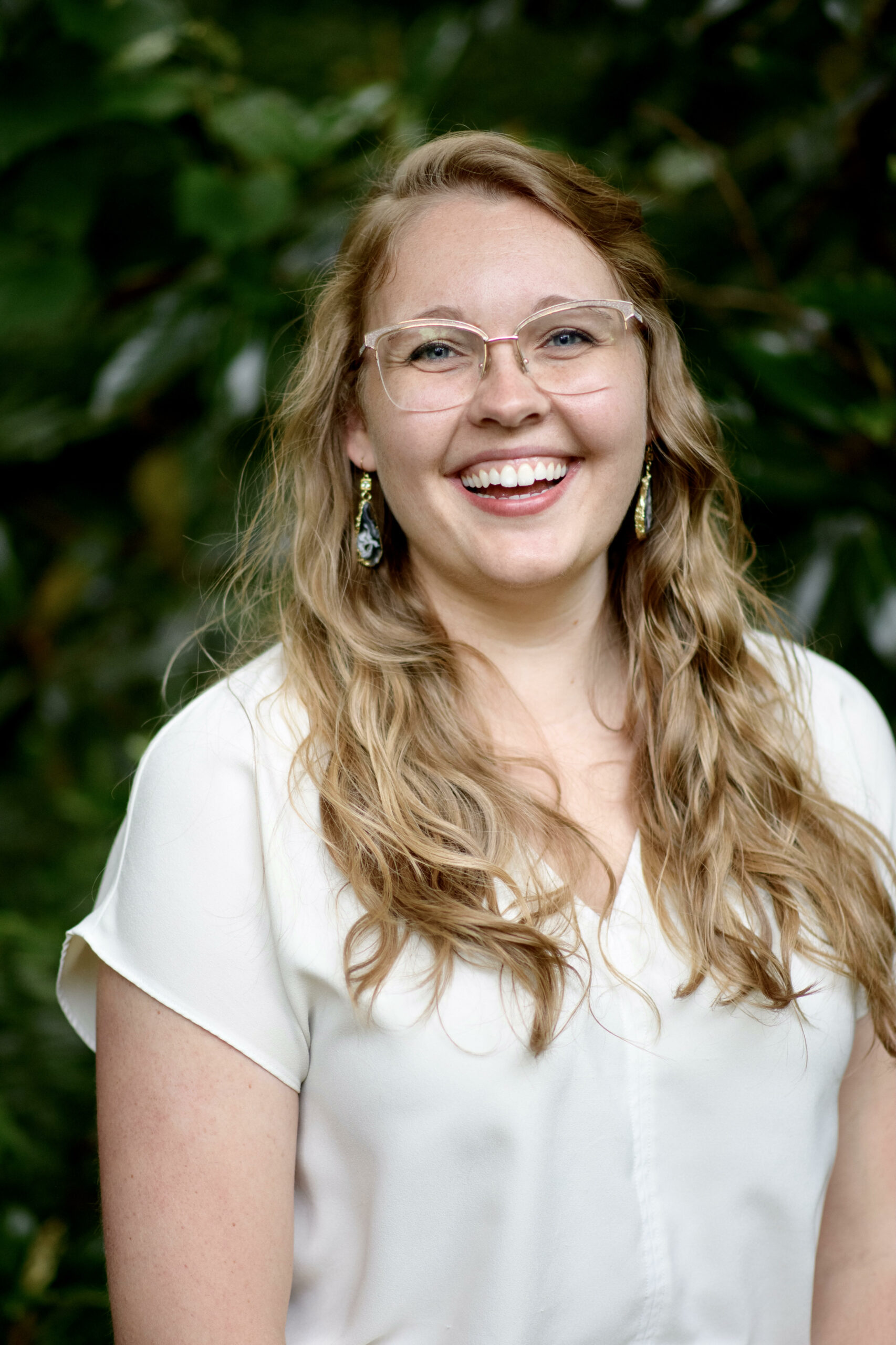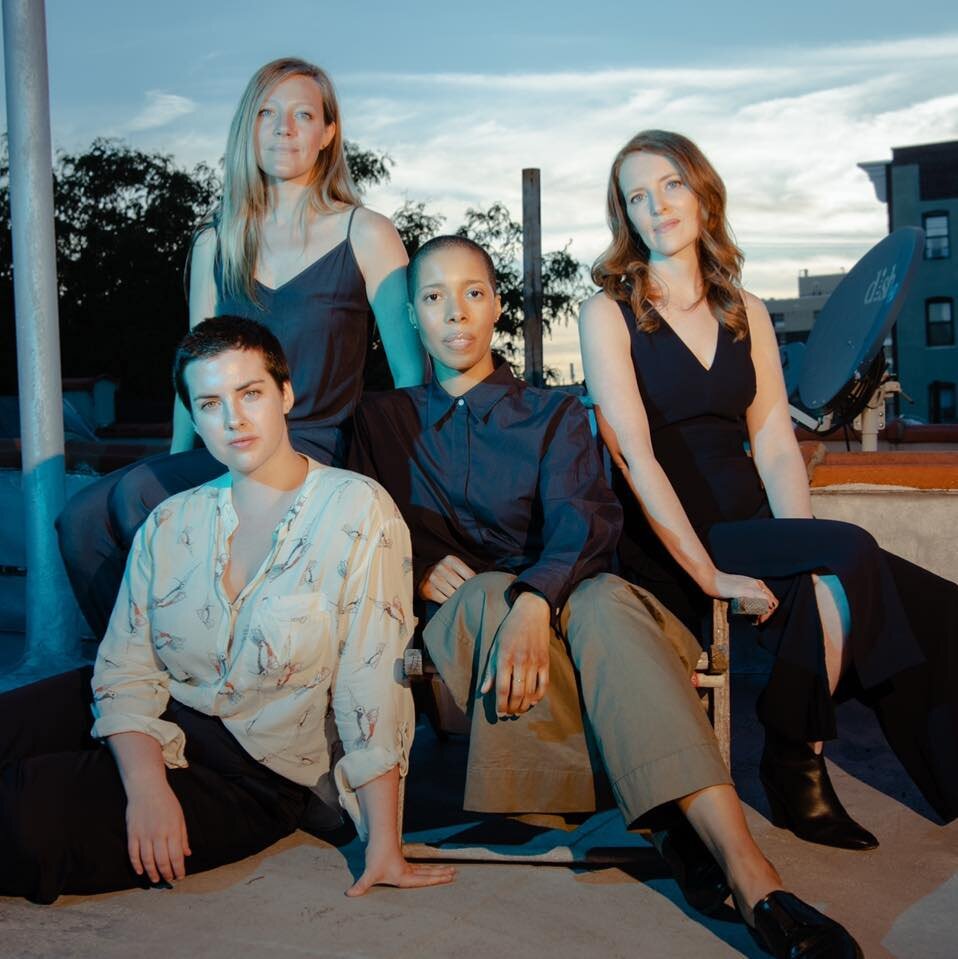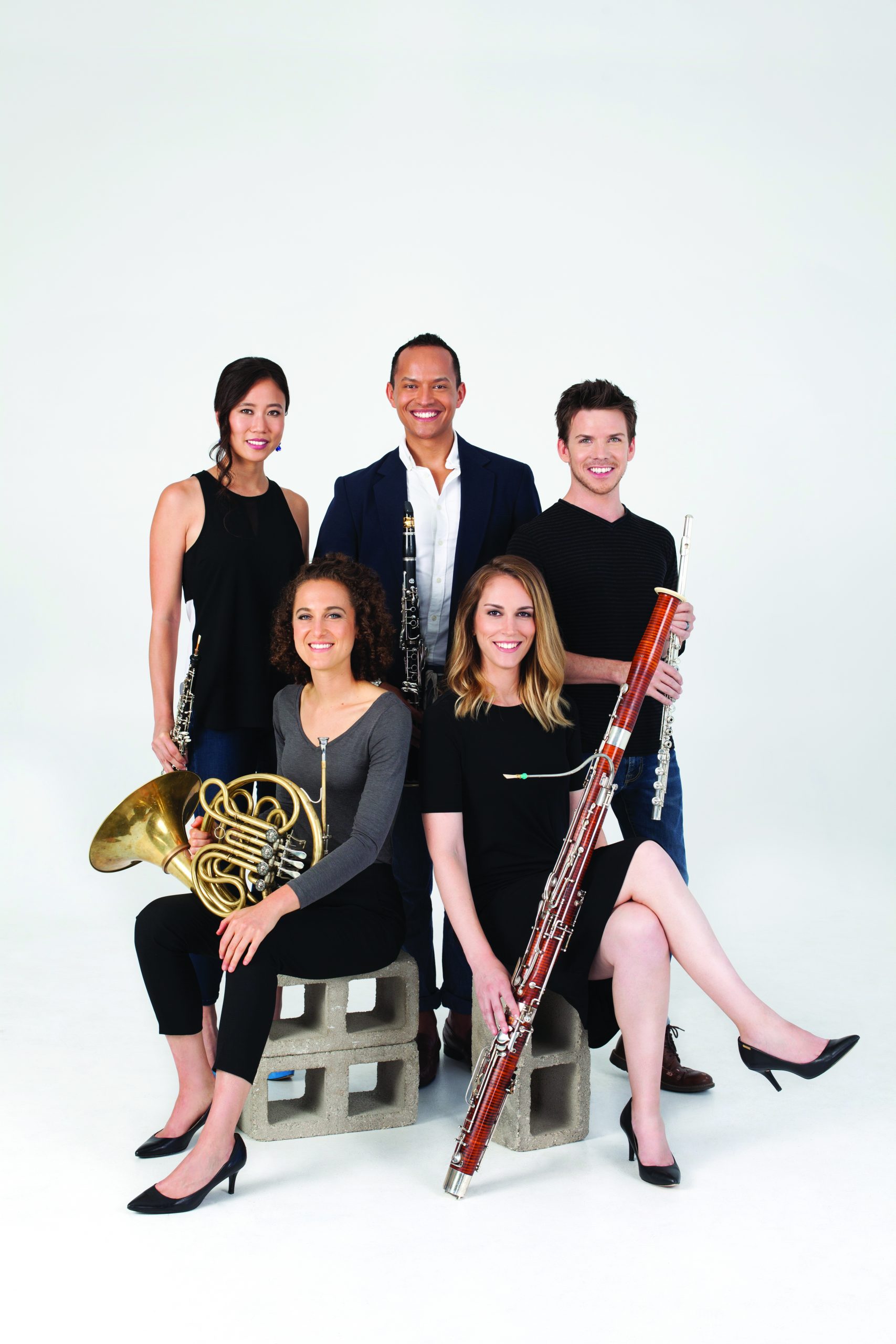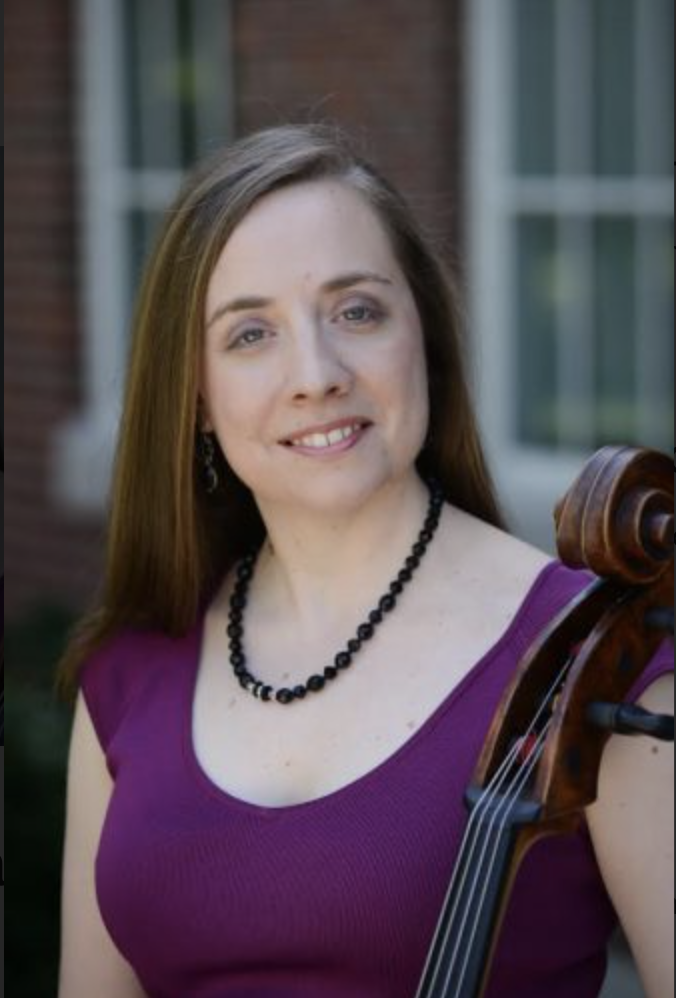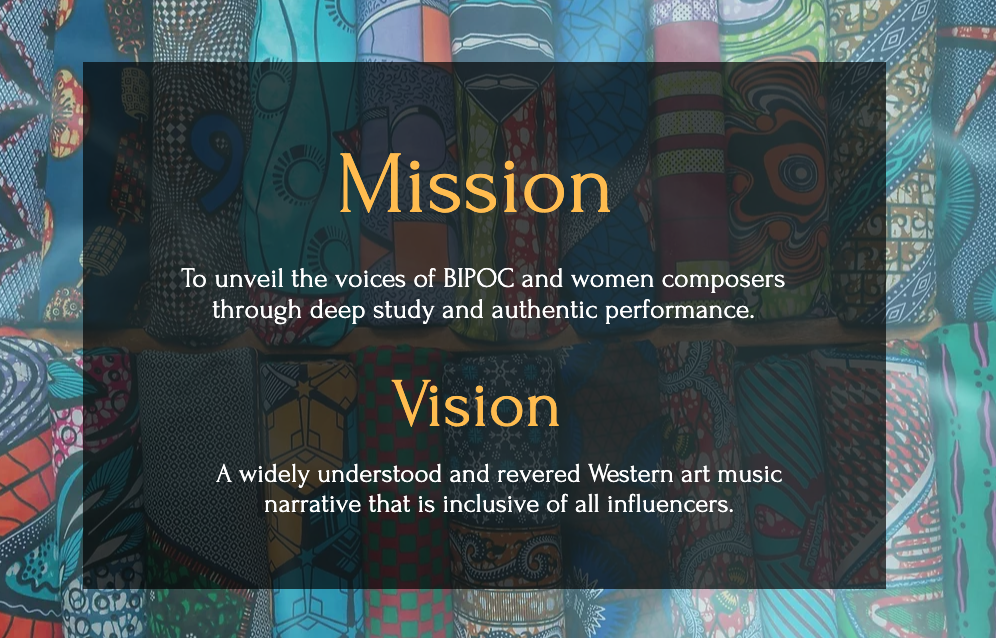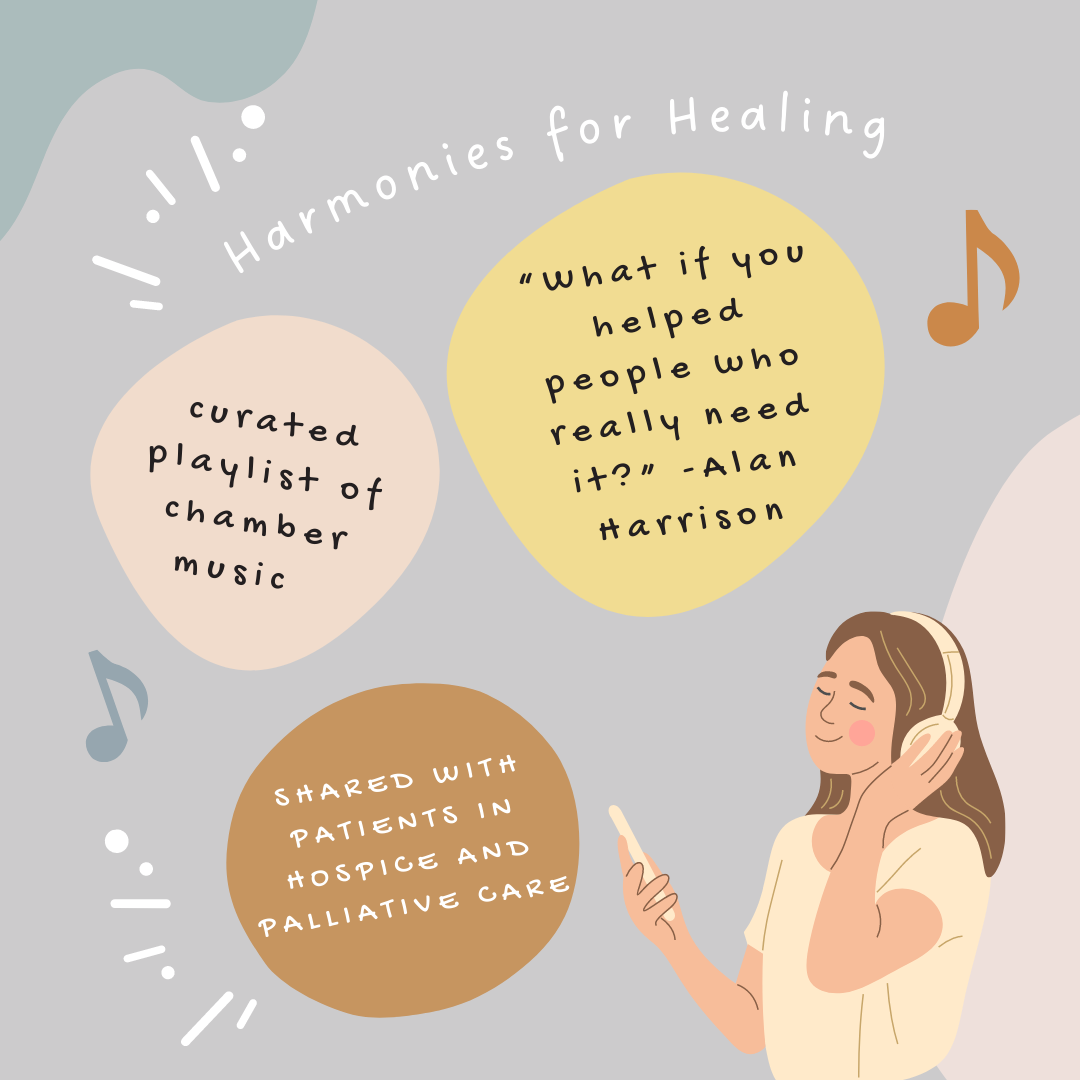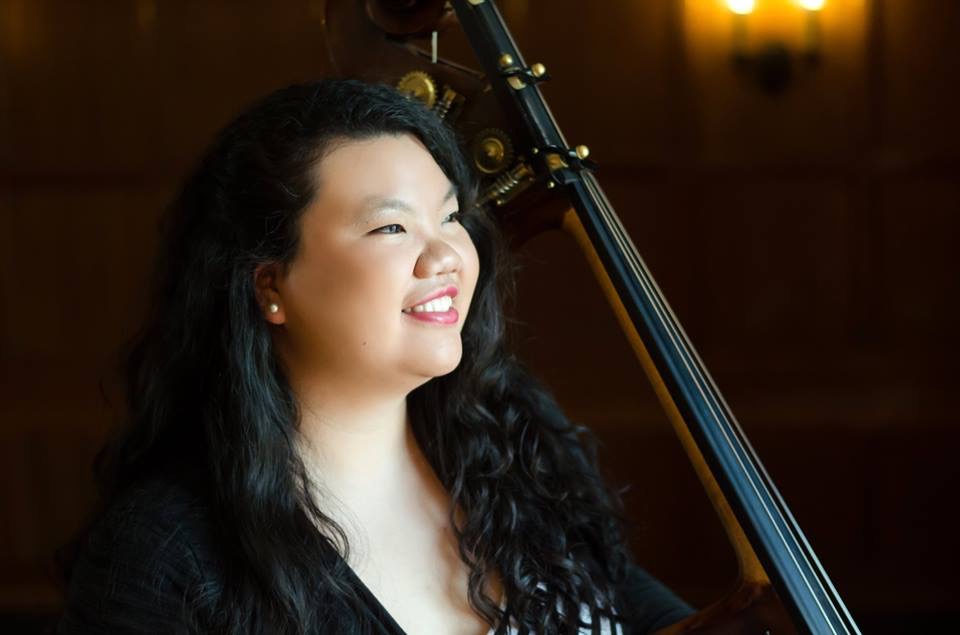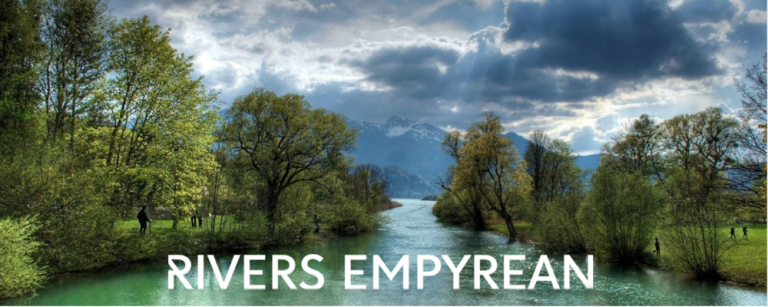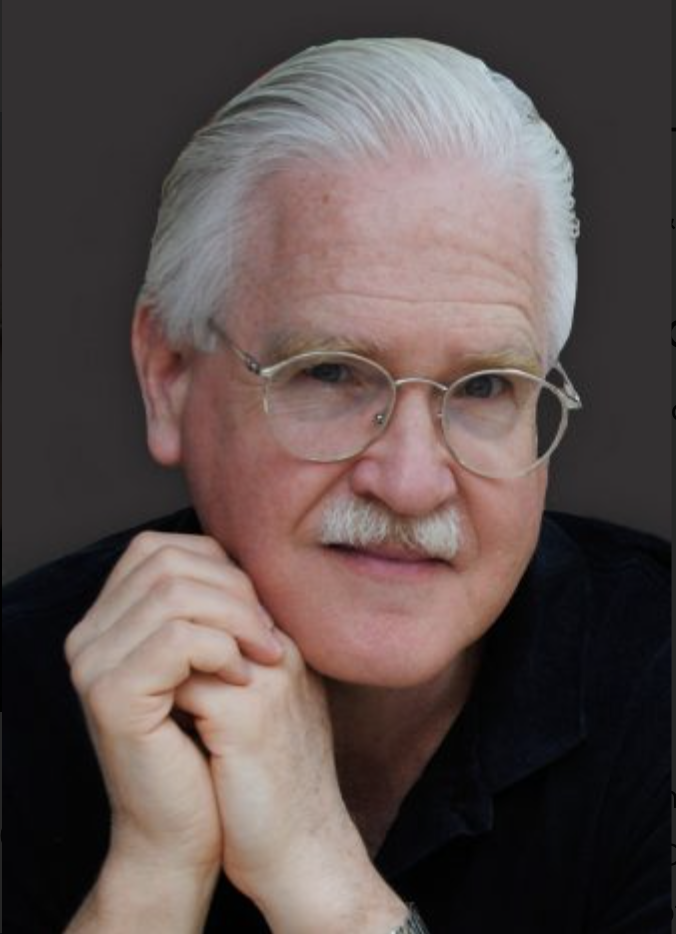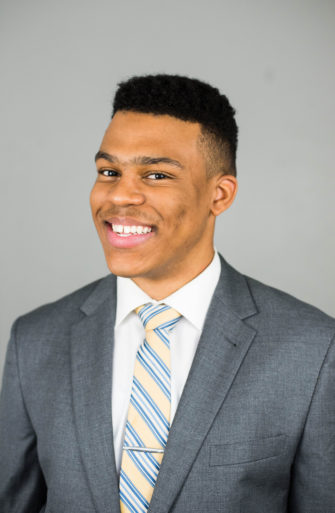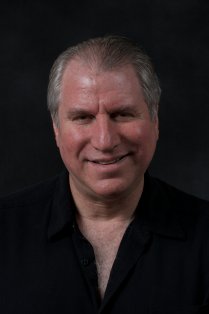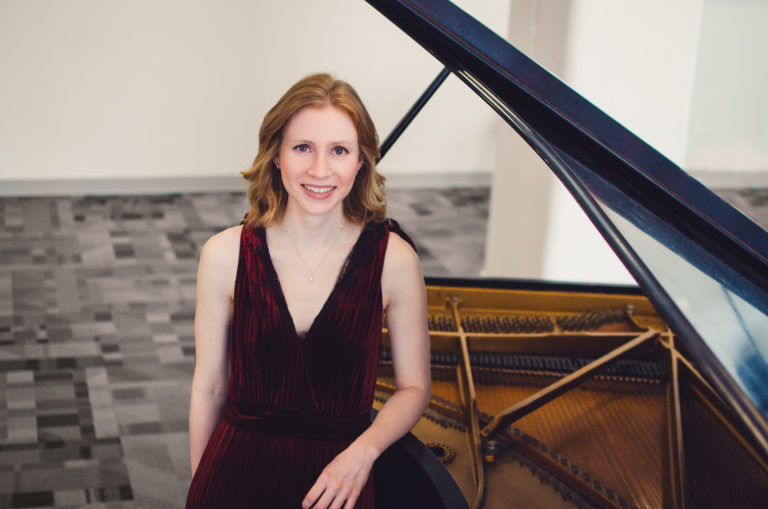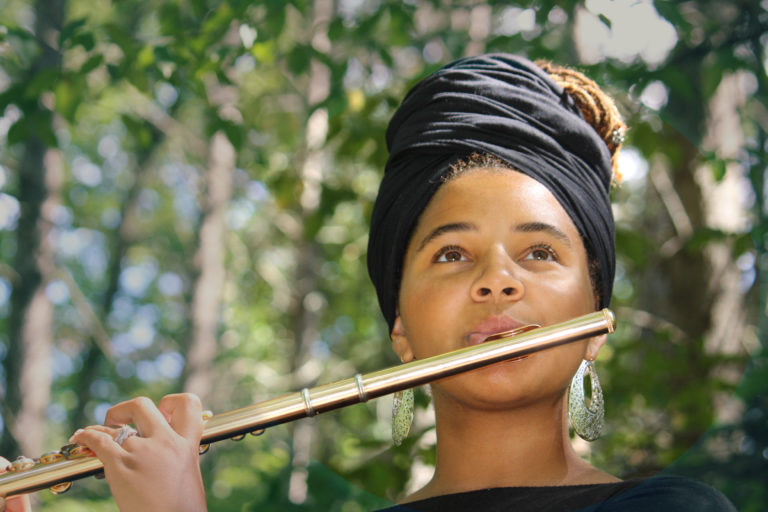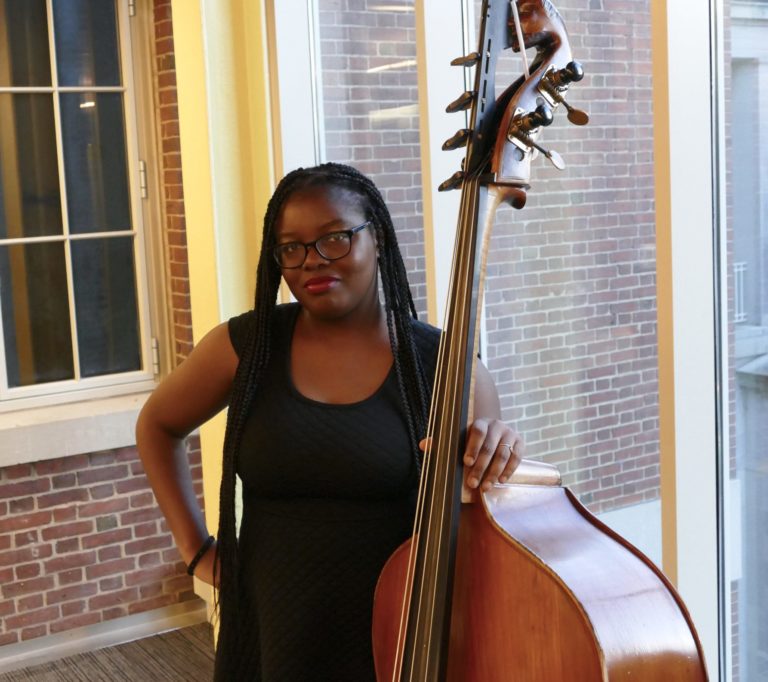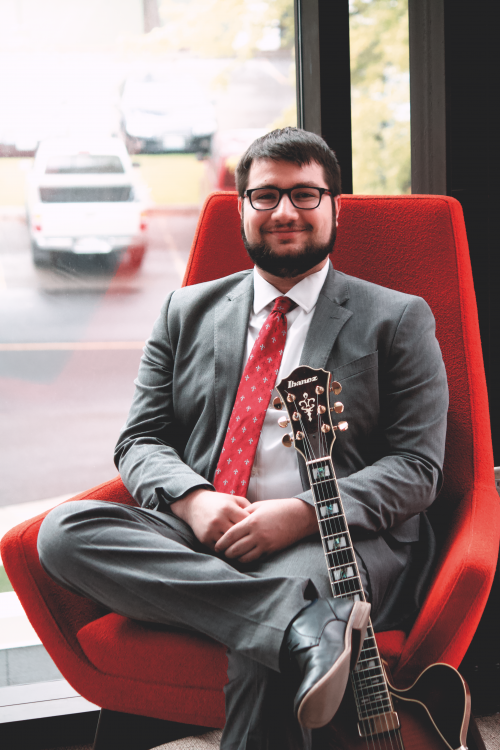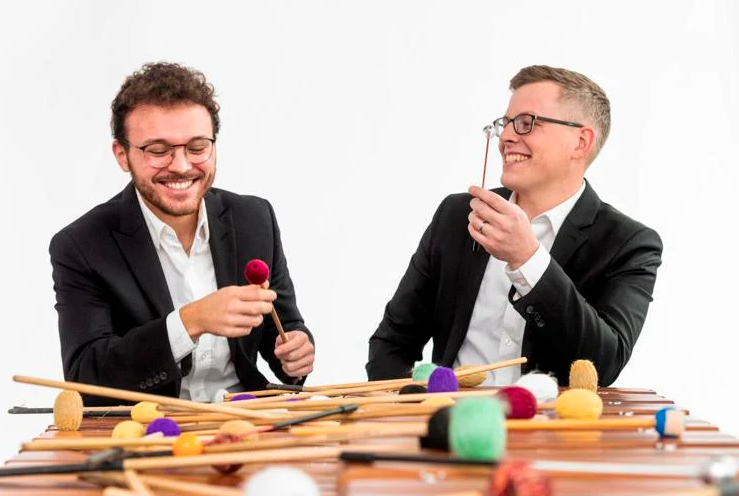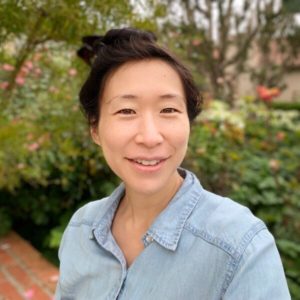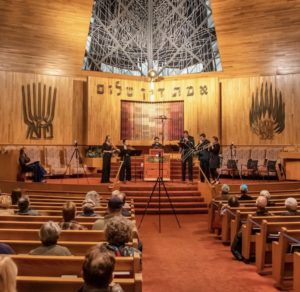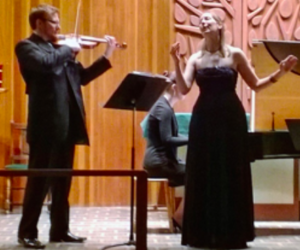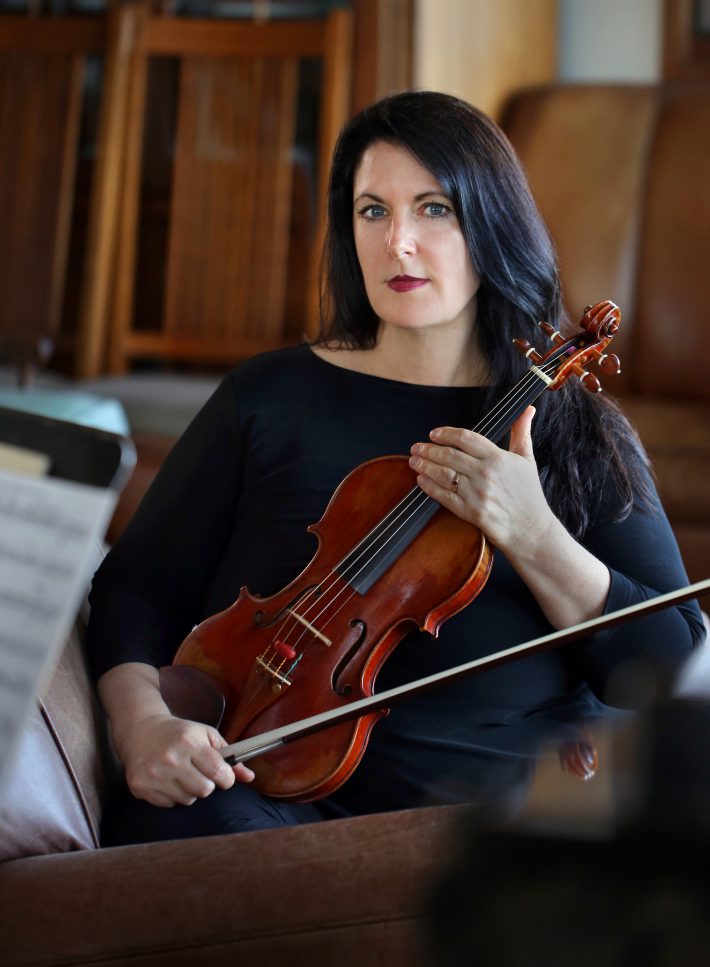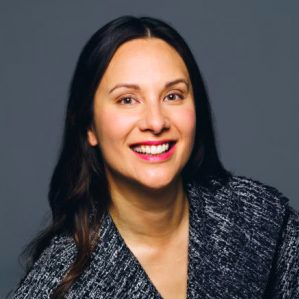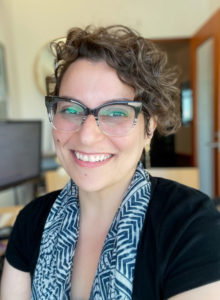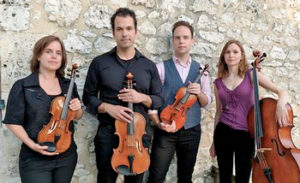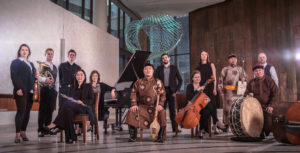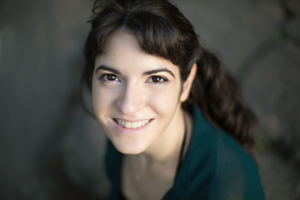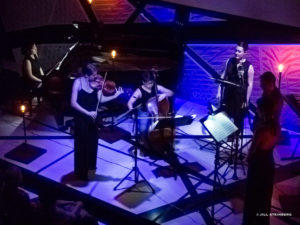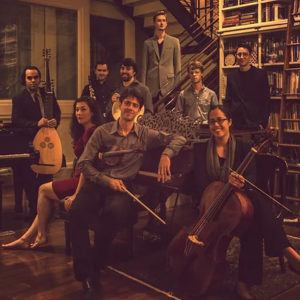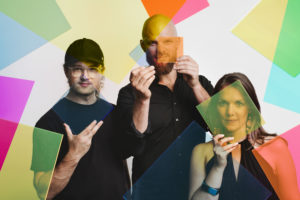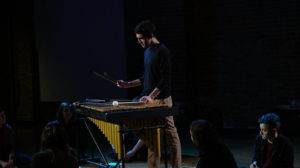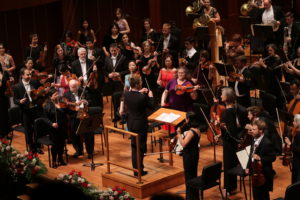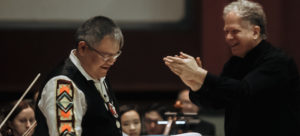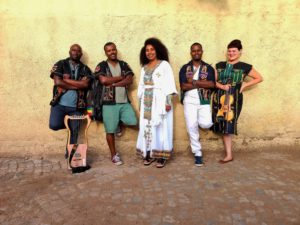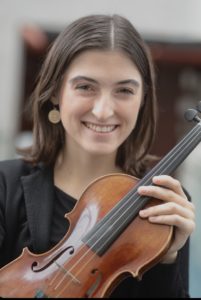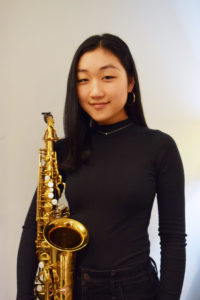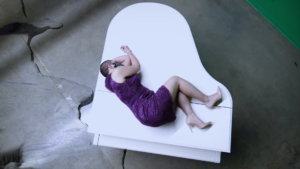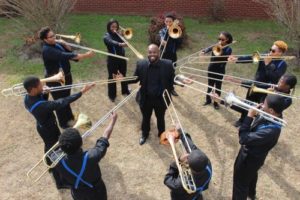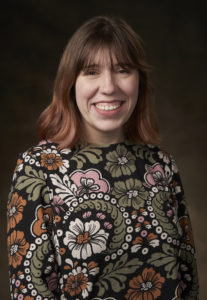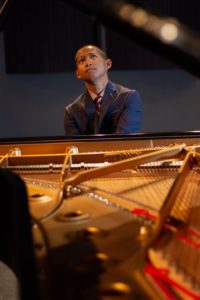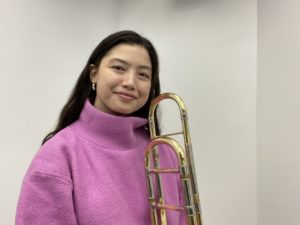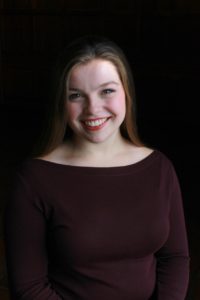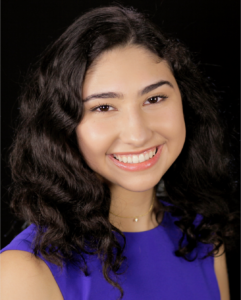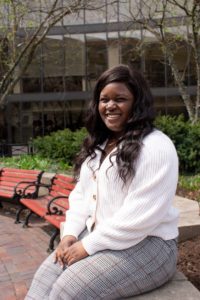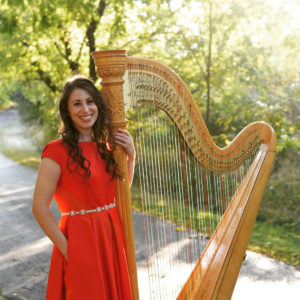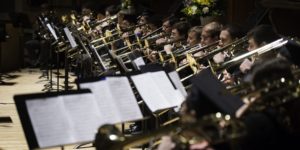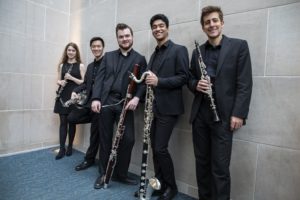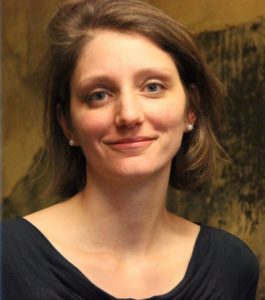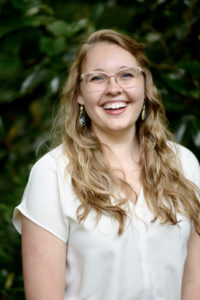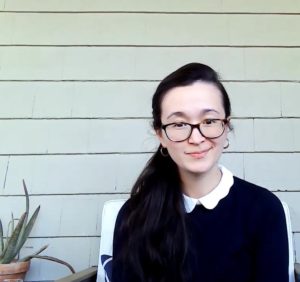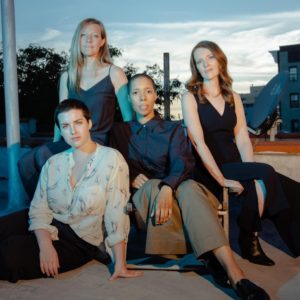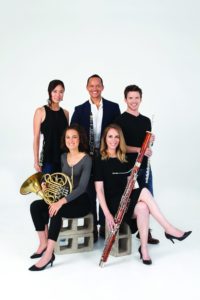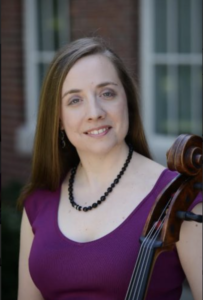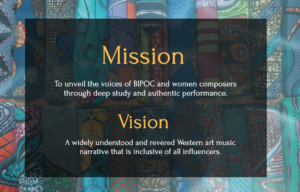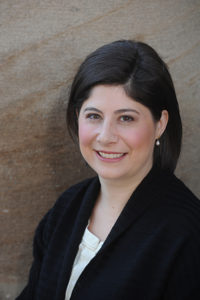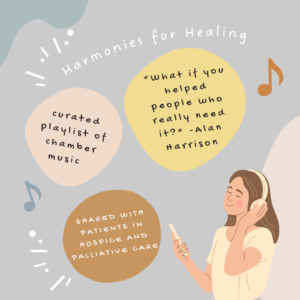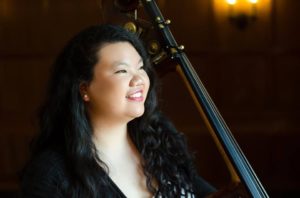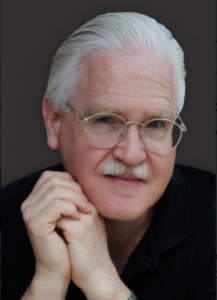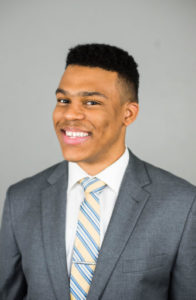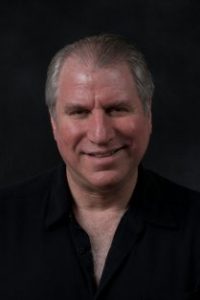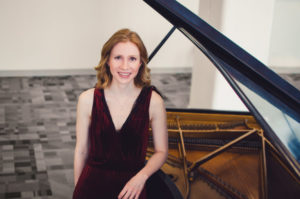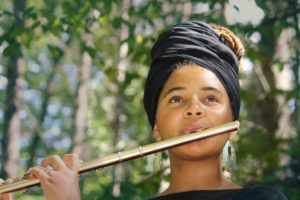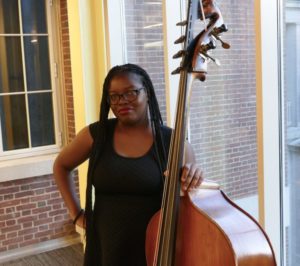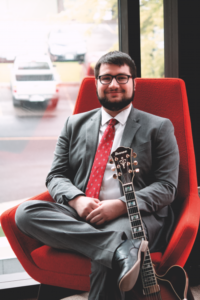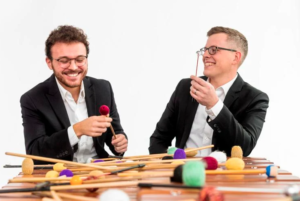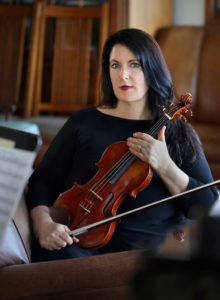Choose from dropdowns to filter results
Erika Switzer, along with baritone Tyler Duncan, came to Eastman to judge the 42nd annual Jessie Kneisel Lieder Competition. As part of their multi-day residency, Switzer met individually with students to discuss her journey and Sparks and Wiry Cries, a organization she co-founded that curates opportunities for art song creators, performers, and scholars through innovative initiatives that capture the stories of our diverse communities.
Harpist Andrew Chan came to Eastman for a three-day residency alongside Catherine Michel. Chan presented a class “Succeed in the New World” about his journey starting Harps on the Hill, which was an interactive discussion about the challenges and opportunities that diversity offers musicians in the 21st century.
As a passionate piano teacher, Yang has observed challenges in advanced piano studies stemming from foundational misconceptions, leading to inefficiency and discouragement. The high cost of quality piano education in both China and the U.S. has led to inconsistent foundational music education. While online music educational content has becoming an increasingly powerful tool for music learning, its fragmented nature often requires payment for full access. This is unlike subjects like math, where online educational resources often exist in a more systematic and accessible manner. This project aims to create professional, systematic, free, and high-quality educational content, extending Yang’s commitment to inclusivity in music education. Her experiences leading a teaching studio establishing special teaching projects and scholarship for disabled students, children of migrant workers, and leading numerous female retirees for successful music career post retirement has reinforced her commitment to diversity and accessibility in music education. This project will align with her ongoing dedication for music accessibility and inclusion.
Cori Trenczer won a grant to support “Smorgasbord for your Fingerboard: A Sequential Collection of Pieces for Solo Cello Volume 1: Songs for the Beginning Cellist.” Cori will be researching and developing a cello book with pieces in level-order for beginners. The composers in the book will be primarily made up of pieces written by female, non-binary, LGBTQIA+, BIPOC, and AAPI composers. Cori notes, “I have an online teaching studio of 14 cello students, many of whom are included in the groups above. Both my students and their parents have submitted requests for pieces we could learn in lessons. I have found it very hard to find arrangements of these pieces for solo cello. The book would help students have the chance to see pieces by composers who look like them.”
Musicologist and pianist Hannah Harnest won a grant to support “A Yom HaShoah Remembrance Concert: Celebrating Jewish Culture through Classical Liturgical Music and Yiddish Art Song.” Yom HaShoah was observed in 2024 on May 6 as the Jewish day of commemoration for the Holocaust. In a unique fusion of faith and peoplehood, synagogues hold memorial services on this day that integrate traditional prayers with contemporary poetry and song. Throughout the 20th and 21st centuries, Jewish congregations in America have been actively involved in creating new settings, and the Shoah has been a recurring theme for composers and lyricists. This lecture recital showcased compositions by Cantor Samuel Rosenbaum from Temple Beth El in Rochester, who was a prominent figure in the American Cantorate. It also included a world premiere by Eastman alumnus Michael Isaacson, Eastman professor emeritus Samuel Adler, and Lazar Weiner (1897-1982). The recital featured Eastman students, local artists, and Argentinian Guest Cantor Jonathan Kohan from Beth El.
Jazz trombonist Haik Demirchian won a grant to support his album “Call to the Ancestors.” This album is an accumulation of Haik’s musical discoveries in his homeland of Armenia as well as the recently lost land of my ancestors, Artsakh. During the Armenian genocide in which over 1.5 million Armenians were killed, much of the archival work that was done to preserve Armenian music was burned. This work is still not safely preserved due to the continuing genocide of Armenians that is brewing today. Haik’s goal is to preserve Armenian folk music by arranging and recording music discovered during his time at Eastman and possibly Haik’s last journey to what remains of his homeland.
3D Percussion is curating an immersive concert program, “Refract,” to create an experience with new music and supplemental technology. This concert will be headlined alongside Pax duo, who is a new percussion duo from the midwest. Through this collaboration we are presenting new works for duo and trio in the percussion repertoire to new audiences. 3D Percussion will be premiering a new piece by composer Matt Curlee for percussion trio and tape which will be the one of the first of its kind.
Tubist Josh Budziak won a grant to support research on brass mouthpieces along with Masters student Jack Earnhart. Musicians and manufacturers claim that acoustic and sensory percepts are direct results of mouthpiece geometry. These claims are often anecdotal, and lack support from objective or controlled testing. This research is a quantitative study that examines relationships of mouthpiece mass and spectral components, and will evaluate if observed spectra are the result of the player’s perception and bias of the impact of mouthpiece mass on timbre.
Brandon Berlanga won a grant for his team at Blacktop Percussion for “The SCINTILLATIONS Recording Project.” The ensemble will record SCINTILLATIONS by Sebastian Zhang, an advanced 10-15 minute percussion quartet inspired by hip-hop and rock music, commissioned by Blacktop Percussion. The SCINTILLATIONS Recording Project is meant to play a large role in the Blacktop Percussion’s newest initiative: The Scintillations Project. The Scintillations Project is a mission to promote inclusivity within the music community by working with composers of diverse racial, gender, and LGBTQIA+ backgrounds to create exciting music that will serve as a vehicle for our message.
Hilary Glen and a group of cellist educators won a PRJC grant to support Resonance: A Multicultural Cello method. These method books will offer a sequential approach to learning the cello from beginner to advanced levels using primarily Latin, African, Asian, Native American, and Middle Eastern music. The final product will include cello parts, piano accompaniments, ensemble parts, piece descriptions, audio and video recordings, and an interactive website.
“The QUEEN-tet Project: a Symphonic Drag Story Hour” is a collaboration between Tara Hoot, an award-winning DC-based drag queen, and District5, a wind quintet committed to promoting new works. This story hour creates a novel exploration into unconventional storytelling through the melding of drag and classical music. The show includes readings of banned books and centers around the commission of a work for wind quintet + drag queen by composer Christen Taylor Holmes depicting Hoot’s life advice from a drag queen’s perspective.
Sammy DeAngelis used their Special Opportunity Grant during the Summer of 2024 to support 3D Percussion’s first recording and materials for a website! The group, under DeAngelis’s direction, used funding to design a website, buy a domain, hired someone to make a logo, paid for headshots, commissioned a composer, and recorded audio and video for the same newly commissioned work. While much of the behind-the-scenes of this project were spearheaded by DeAngelis and 3D Percussion themselves, the experience helped them put together a project of their own, for which they had to learn essential marketing and networking skills. As of this time, 3D Percussion has two confirmed residencies – University of Arkansas Fort Smith, and Oklahoma City University.
“The special opportunity grant helped 3D Percussion launch our initial project of collaboration by providing us the funding to record materials for future residencies. We’re so thankful for the opportunity and will use this experience to better future projects to help launch our career. Thank you!”
Students Hannah Reich, Dykeem Cervantes, and Joyce Tseng were thrilled to be able to work closely with the Rochester Summer Opera (RSO) CEO, Anna Lousie Martin, during the Summer of 2023. Founded in 2021 during the Covid-19 pandemic, RSO aims to create free experiential learning opportunities for Eastman Voice & Opera students. In an effort to expand their knowledge of non-profit management, administrative work, grant writing, and networking with corporate sponsorship candidates, these three students worked in a hybrid environment (remotely and in-person) to expand their diverse skill sets. While each student directed their focus to their different interests (marketing and social media, non-profit management, and general behind-the-scenes support) the experience provided by the mentorship at the RSO was unmatched and have provided these individuals with the invaluable knowledge they need to navigate their individual paths in the arts industry.
Zoe Markle found their involvement at the Banff Centre’s Evolution Classical 2023 program to be an unexpected journey of growth, both musically and personally. Led by the Gryphon Trio, Evolution: Classical brings participants together with international performing artists, thought leaders, and creative innovators. As a community they work towards creating a series of collaborative, curated final performances, and in the process explore the challenges and choices that musicians encounter as they continue to develop their artistic practice and pursue career advancement. For Markle, the most powerful aspect of this program were the genuine relationships she cultivated with like-minded colleagues and industry professionals; they became mentors and potential collaborators. Over the course of their attendance, Markle faced unexpected challenges, all of which they mention, have prepared them for the unpredictability of a career in music and have instilled in them resilience and versatility that will be essential in navigating the field. Beyond honing musical skills, it encouraged Markle to welcome new and transformative experiences, of which they cannot recommend enough.
“Evolution Classical 2023 was more than a program—it was an initiation into the multifaceted world of a professional musician. To any aspiring musician seeking a transformative experience, I cannot recommend it enough!”
Reggie Bowens had a spectacular time at the 2024 Jazz Education Network (JEN) Conference, as part of his Spring 2024 ALP Grant opportunity. An educational and performance nonprofit founded in 2008, JEN is a program dedicated to building the jazz arts community by advancing education, promoting performance and developing new audiences. Bowens’ intention of shaping their personal brand and preparing for a life and career in arts leadership and the music industry, was wonderfully complimented and supported at the JEN Conference. In conversation with industry professionals, Bowens reflected that through networking at such a prestigious conference, their perspective of being an entrepreneur has reshaped their approach to the performance community tremendously. A business owner, freelance composer, arranger, performer, and educator, Bowens was excited to attend the educational sessions at JEN on vocal health, inclusion, technology, research, and pedagogy so that his return as teacher in the classroom after his Eastman studies will be far more well informed about current practises and insights into the music industry.
“Attending the 2024 Jazz Education Network (JEN) Conference was one of the highlights of my Winter Recess. In addition to enjoying the flavorful cuisine of the region, I made many meaningful connections with amazing professionals, including Alison Crockett and Bailey Havnes. I was also reintroduced to John Clayton and Tia Fuller, ran into Darmon Meader of the New York Voices. and attended the African American Jazz Caucus (AAJC) events, for which I am also becoming a member. The networking was incredible and I am forever grateful to have experienced JEN, and attended many workshops to further my career and professional development.”
Floris Van der Veken was thrilled to be able to attend the XIX World Saxophone Congress in the Fall of 2023. Both in an effort to expand their professional network and have an active voice in the Saxophone community, this opportunity allowed Van der Veken to enrich and grow their individual artistic practice and stay tuned-in to the latest repertoire developments. While the Congress was not a new creation, the program – like many – was forced on a hiatus during the pandemic. After five years of tireless behind-the-scenes work, the Congress was finally picked up again; its first year back was the year in which Van der Verken was in attendance. Their biggest insight for this experience was the skill of which networking itself demands. Hesitant at first to make the first move, by the end of their program Floris made life-long connections with industry professionals.
“The saxophone community has waited five years for another congress like this one, and it enables you to connect with almost every single famous player out there. I saw the premieres of new major concertos, tried out the latest instrument-technical developments, made promises for future projects, and so much more. It felt as if I saw the future of the instrument being shaped, and more importantly, I can take part in it.”
Catherine Baek invested their time during the Summer of 2023 to complete an internship with the Kent Blossom Music Festival, based in Cleveland, Ohio. Baek set out with a desire to understand the importance of finding balance in a highly organizational and leadership driven environment, while understanding that those skills must coexist with their demanding routine as a performing artist. While in residence at KBMF, it was insightful for Baek to witness the elements which bridge together a higher institution (Kent State), presenting institution (Blossom Music Center), and a tier one orchestra (The Cleveland Orchestra). Baek’s understanding of the partnerships and collaboration between different bureaucratic bodies with various goals was subsequently deepened. A festival proud of promoting a rich community history, Baek engaged in conversation with the director and staff, discussing the advantages of long-standing education and community engagement, and how strong outreach can effectively engage local community members. This opportunity with KMBF was powerful for Baek, and has given them alternative perspectives in equity and inclusion, education, and archival work in arts organizations; an important approach that fosters a stronger holistic picture of what it takes to run a multi-level organization.
Kayla Sconiers dedicated her Summer 2023 internship with the Rochester Finger Lakes Opera Company to understanding the professional creation and production of opera as approached through a diverse and cultural lens. An organization which prioritizes diversity, equity and inclusion in their programming, work environment, and outreach initiatives, the Finger Lakes Opera supported Sconiers’ career aspirations as she continues to set out to be a figure of black and female representation in spaces which historically have maintained barriers for individuals in similar circumstances. In interview and collaboration with industry professionals, Sconiers’ made huge strides in her own professional development, particularly as relates to programming and planning, and managing donations within artistic spaces. The supportive environment that the Finger Lakes Opera shared with Sconiers, was instrumental in allowing her the flexibility to be creative, and eventually led her to spearhead new ideas and programming initiatives which continue to have impacts within the arts communities and primarily within The Black Student’s Union.
“What goes on on-stage is just as important as what goes on behind the scenes. From event-planning to fundraising, everything is done with care and value that is beneficial to everyone. The Finger Lakes Opera Company has taught me that!”
Marlies Hollevoet traveled to Amsterdam and Antwerp, Netherlands in the Spring of 2024 to play an active part in the CD release and premiere concert of the Lilith Ensemble. Amsterdam based, the Lilith Ensemble’s mission is to promote female exposure in the music world, especially in the areas of composition and creation. Through performances and one-on-one work with young and professional female composers (such as Hollevoet themself), the work of this organization ensures the development of performers that are not best represented in the classical music industry and the visibility of female composers through much needed platforms and collaborations. As an international student, finding a balance and strong support network in both the USA and Europe was important for Hollevoet. Their work with the Lilith Ensemble provided them with ample networking experience, as well as mentorship from the ensemble collective which will provide Hollevoet with the resources to be able to navigate a career in music performance, production, and media marketing. In their time overseas, Hollevoet joined industry professionals for rehearsals, meals and coffee outings, and table discussions; helpful avenues which they hope will seed their desire to continue to make connections internationally.
Uday Singh traveled to Zurich, Switzerland in the Fall of 2023 to enhance his understanding of the music industry and its responsibilities as explored through conversation and interview with industry professionals. Situated near Zurich University of the Arts for the duration of his experience, Singh immersed himself within the Swiss arts community, a core of richness which spans the disciplines of Arts Education, Design, Film, Fine Arts, Music, and Theatre. Interested in the diverse and unique pathways that are constructed and approached within the music industry, Singh sought to define and determine the carefully curated careers which so often navigate a grey area between teaching, administration, and performance. In discussion with musicians, educators and arts specialists – Lars Mlekusch, Lucas Niggli, Joan Jordi Oliver, and Harry White – Singh collected a cohort of industry knowledge which will act as an impetus from which he can confidently move towards his goal of being an active voice in the new music world, both on and off the stage. He is excited to capitalize on what he has learned from his time in Zurich, Switzerland, and share his findings with interested colleagues, those similar to himself.
Grammy-nominated musician, singer, songwriter, and producer, Kendall Nesbitt is one of America’s most sought-after musicians. To date, Kendall has assisted in completing 50+ gold and multi-platinum albums for some of the world’s greatest artists R. Kelly, Jay Z, Britney Spears, and Jennifer Lopez. Kendall spent a multi-day residency at Eastman in collaboration with the George Walker Center, where he worked with students in the Beal Institute, and presented an open Q&A about his experience with “cancel culture.”
Rebecca Bryant Novak, a DMA candidate in Orchestral Conducting, received an IML Mentorship Grant for her project, ad hoc, a flexible chamber ensemble. The group will be performing concerts at Christ Church Rochester and the Harley School in January 2024.
Doctoral candidate Vincent Huang ’22E (MM) received an IML Mentorship Grant for his project Golden Tiger International Music Festival – Trombone Seminar. He will be launching a weeklong trombone festival located in Nanjing, China in the summer of 2024.
Elinor Freer received a Department Matching Grant in support of Henry Kelder’s guest residency at the Eastman School of Music. As part of these events, Kelder gave a workshop entitled “Becoming a Musical Entrepreneur,” detailing his work with MatchingArts. Kelder is an active pianist and composer, and a Professor of Piano at Utrecht University of the Arts.
One City Jazz from the VanderCook College of Music won a $5,000 grant to support their new drumline. One City addresses systemic inequity in music education by providing high quality instruments and expert instruction at no cost to children from underserved BIPOC neighborhoods where instrumental music is not provided in the public schools. Those who stick with the program until the end of 8th grade get to keep the instrument to use in high school and beyond. Over 120 children attend every Saturday and play in 1 of 3 jazz ensembles, our Suzuki violin program, or the new drum line. Our world-class, majority BIPOC artistic leadership team composes original repertoire for the program that draws on the rich musical heritage of our neighborhood Bronzeville. Currently, the drumline students are using drum pads to develop basic drumming technique, rhythm reading skills, and build a warm, welcoming ensemble rapport where high standards and expectations are supported and nurtured. Congratulations to Eastman alumna Leah Schuman ’96E (MM) ’01E (DMA) on her leadership of this program (pictured)!
Walker West Music Academy won a $5,000 grant to support Stringocracy! Call and Response as Social Activism from Vivaldi to Hip Hop – Stringocracy! In conjunction with the national election and the energy from young people to engage in social justice efforts to foster social impact, this project culminates in a 90-minute concert that explores social activism through a “call & response” approach from a cross-section of music genres rooted in the African/African American cultural experience. The ensemble of high school string students will explore improvisation, a highly democratic dialectic form, as expressions of identity through their music performance.
In Summer of 2023, Liz Jackson went to Tanzania, Africa with the Outer Loop Theater as part of their Humanity Project – a program that uses storytelling to create positive change in communities. The team makes an annual visit to the villages of Mloka and Msona to connect with the community and ask them of their needs. Since 2016, the Humanity Project has helped to build fertility clinics, water reserves, a food market, and establish an education scholarship for girls. To raise funds for these needs, the organization collaborates with the local villagers to tell their story through art – such as dance, music, and theater – recording it, then sharing it with potential donors and funders from around the world. During her two weeks in Tanzania, Liz worked with the local children on how to tell their story through the creation of a play, composition of a song, and writing of a monologue. Reflecting back on her experience, Liz acknowledges that it has “solidified my desire to work with arts organizations that make an impact.”
The Boston Early Music Festival (BEMF) is a 7-day early music extravaganza in the heart of Boston, Massachusetts and is co-directed by Eastman’s own Paul O’Dette. On the performance side, the festival includes an historically-accurate production of an opera, one chamber opera, small ensemble concerts by world-renowned early music groups and up-and-coming students, and a month-long Young Artists Training Program for baroque singers. In addition, there are various symposia, lectures, masterclasses, dance workshop and the largest Early music trade show exhibition in North America. Rachel Smith used her Special Opportunity Grant to collaborate with Prof. Thielman as the “impresario” of Eastman Collegium Ensemble at BEMF. Some of Rachel’s responsibilities included assisting with raising money for travel expenses, organizing instrument access, and the logistics of the performance.
Two Catherine Filene Shouse Fellows, Sammy DeAngelis & Emma Gierszal, used the Special Opportunity Grant to support the professional growth of their chamber group, 3D Percussion. They used the funds to develop a professional brand including designing logos, website creation, and creating recordings a newly commissioned work for their portfolio. These marketing materials were then used to organize residencies at various institutions for Fall 2023, including University of Arkansas Fort Smith and Oklahoma City University.
Seiko developed a personalized program around opera, health and holistic wellness, and career guidance through individualized advising and training. Through sessions and discussion with industry professionals Carol McAmis, Christopher Zemliauskas, and Darrell Babidge, Seiko was able to connect their interest in music wellness, vocal pedagogy and vocal science to their aspirations of exploring future career options.
The Young Artists Vocal Academy at Houston Grand Opera is a week-long career development and performance academy. The academy’s main goal is to introduce young singers to a breath of information required for the career path in addition to excellent training. Meg Brilleslyper used the Special Opportunity grant to attend the program and receive training in subjects such as characterization and score preparation, resume workshops, and round table discussions about professional development from HGO administrators and artists. Presenters included Kristen Burke (Director of Production), Natalie Barron (former Director of Marketing), Jamie Gelfand (Assistant Director of YAVA), and Q&As with Patrick Summers (Director), Alisa Magallón (Director of Programming and Engagement), and Lindsay Kate Brown (Soprano).
Based in Harlem, NY, Sugar Hill Salon Chamber Music is one of the first chamber music series and artistic collectives that centers on black and brown woodwind artistry in classical music. Through commissioning chamber works and monthly concerts featuring artists on the scene, Sugar Hill Salon is decolonizing classical music for a more equitable future for black and brown artists and their communities. PRJC funding is supporting Sugar Hill Salon’s interdisciplinary Jackie Robinson Park concerts in Harlem from May – July of their 2023-2024 season.
The heart of the Sampaguita Filipino Flute Project is to create visibility for and raise cultural awareness of Filipino classical music, as well as demonstrate the power of creating community through music. The recording of the Sampaguita Filipino Flute Project, and recital tour, will showcase classical music written and inspired by Filipino composers. This album is intended to bring attention to an underrepresented community and the culture of Philippine artists.
Will Pyle, through active networking with known colleagues and industry professionals, secured a spot in the Chamber Music America National Conference (CMA), as part of their Spring 2023 grant project. Pyle worked closely as an assistant with the innovative music ensemble, fivebyfive, a 2023 CMA featured performing ensemble. Hailed as an award-winning, artist-led ensemble known for its impeccable musicianship and adventurous spirit, fivebyfive is dedicated to inspiring audiences and forging creativity within the music industry. While in attendance at the Conference, Pyle helped the ensemble to organize their showcase performance, in addition to Pyle personally expanding their network pool within the chamber music community. In particular, they talked with Astral Artists, an agency that recently began managing saxophone quartets (an endeavor Pyle is pursuing in their career).
Yi-Ning Lo’s composition “Marbles in the Wok”, for piano and electronics, was showcased at CAMPGround23, an international contemporary music festival in Tampa, Florida. The event consisted of a conference format featuring 4 concerts, total of 27 composers and the Tampa City Ballet. The concerts showcased multisensory performances: dances, installations, electronic and electroacoustic music, ensemble works, and solo instrumental pieces. While at the festival, Ms. Lo collaborated with and interviewed Eunmi Ko – festival Co-founder, President of CAMP, and pianist.
The Penn State International New Music Festival and Symposium is a bi-annual event that features the work of composers and scholars selected through an international call for scores and research proposals. Composer participants attend the festival, work with musicians, and hear their compositions being performed by faculty, student, and guest performers. Arts Leadership Certificate candidate Tucker Johnson was selected to be one of 70 composers to participate in Spring of 2023. While he was there collaborating with musicians on his piece, he also networked with scholars active in computer music and music journalism – both of which he sees being part of his future career.
The Sacred Heart Chamber Music Summit is a tuition free week long chamber music camp held at Sacred Heart Catholic Church in Oberlin, OH for high school band students in the north east Ohio region.
The Zephyr Ensemble is a new ensemble that aims to bring together the aspects of the modern wind ensemble and mold it into a chamber setting. Similar to the goals of Frederick Fennell, this ensemble emphasizes flexible instrumentation that allows for the performance of diverse and dynamic chamber works. This ensemble model is an approachable and versatile way of performing wind repertoire that can inspire both student and professional wind musicians.
The Hana Hou Music Program’s mission is to develop, advocate, and provide music education in Maui, Hawai’i, and to serve as a free musical resource to the community regardless of background, artistic ability, or economic circumstance. The Hana Hou Music Program is currently compiling materials to apply for 501(c)3 non-profit status. Achieving non-profit status will help increase our funding opportunities as well as increase our organization’s legitimacy. Through the IML’s mentorship and financial support, we will be able to successfully file for 501(c)3 non-profit status.
“Electro/Acoustic” is a collaborative project involving Barrett, three composers, and three instrumentalists involving learning and presenting three pieces for solo instrument and electronics, culminating in a series of produced and edited audio and video recordings. Ultimately, this project aims to enrich the field of electroacoustic music by bridging the gap between composers, performers, and technology.
This research project aims to investigate the governance, decision-making processes, revenue streams, and finances of a range of artistic nonprofits, collectives, and cooperatives. Through conducting interviews with various organizations, the researches hope to gain insights into their structures and practices. The project goal is to develop a structure for arts organizations that uses a cooperative model to combine the aspects of both nonprofit and for-profit businesses, while prioritizing fiscal sustainability and social equity.
In collaboration with the strings department, Victoria Paterson ’93 visited Eastman to work with students individually and present a workshop about her career on performing in Broadway pits. Paterson also discussed the other parts of her career with students, including creating and managing the Mostly Modern Festival.
As part of a residency to coach Musica Nova, Eastman alumnus John Pickford Richards ’02E, ’04E (MM) presented a workshop on ensemble development and management. John spoke with students about different business structures that can support chamber music ensembles, individual roles, and funding opportunities. He also led a rehearsal with Musica Nova on repertoire by Helmut Lachenmann.
The Chamber Music Department collaborated with the IML to support a residency by Incantare, a consort of violins and sackbuts that strives to highlight the musical and cultural connections of under-explored musicians from the Renaissance and early Baroque periods, especially music by composers, singers, and instrumentalists from marginalized communities in early modern Europe. The ensemble presented a panel discussion about forming and operating their ensemble, met with students, and presented a concert and masterclass in an open studio class.
ALP Certificate alum, Noah Sesling, accepted an internship at the Metropolitan Opera in the Media Department as part of his Special Opportunity Grant opportunity. Sesling spent three-and-a-half months working closely with a team of administrators at the Metropolitan Opera company to provide support to the staff in charge of Met Opera On Demand and the Digital Recording Archives. In reflection, one of their most important takeaways from this profound experience was being able to work at a large artistic institution in the midst of a cybersecurity breach. For Sesling, this demonstrated the downfalls of outdated software and the dangers of storing too much information on one server. They hope to take what he has learned from this grant opportunity, and apply it to a career in music and large scale technology.
ALP Certificate alumni Tyler Ramos presented a “Lightning Talk” at the New York State Music Teachers Association State Conference in Fall 2022. He was selected as one of 5 presenters to give a five-minute presentation to an audience of music teachers from New York State, followed by a two-minute Q&A. His topic was “Ornamentation Improvisation within a Classical Sonata Allegro Movement.” Through this experience, Tyler continued to gain public speaking skills and received sample materials to utilize in faculty job applications.
Anaar Desai-Stephens used the Department Matching Grant to support a workshop by QWANQWA while on their international tour. The members of QWANQWA shared their story about forming the ensemble, the instruments traditional to Ethiopian music, as well as information about the music and musical culture in Ethiopia. The group fielded great questions from the audience, and shared their journey of planning and carrying out an international tour, and gave some highlights from their travels.
Rochester based ensemble fivebyfive engaged in a fall residency on Campus, working with several departments at Eastman. This included a grant writing workshop, individual advising sessions with students, a Composition Department symposium, and a public concert.
Emilie Tupper (B.M. Applied Music, violin) won a grant for her project “Storytellers: A Student Composition Workshop.” Emilie’s quartet, the Kilbourn Quartet, will be working with 2ndand 3rdgrade students at the Children’s School of Rochester No. 15 to create a collaborative composition along with Clayton Trumbull (B.M. Composition). Performances will be held at the school and the Winton Public Library. The Kilbourn Quartet also includes Chloe Yofan (B.M. Applied Music), Wednesday Hsu (B.M. Applied Music and B.A. Digital Media Studies) , and Noah Janowicz (B.M. Applied Music).
Stephanie Tateiwa (B.M. Jazz Performance, saxophone, and B.M. Music Education) won a grant for her project “Journey in Passion.” Stephanie and her colleagues will be recording an album of Stephanie’s original music based on blending non-Western compositional techniques. Her album will serve as a model for female leadership in the jazz community.
Guerilla Opera of Boston, Massachusetts, Aliana de la Guardia, Artistic Director, was awarded $10,000 from the Institute for Music Leadership to support the production of Her | alive.un.dead. This opera, written by Emily Koh with direction from Mo Zhou, is a surrealist, sci-fi drama about two Chinese-American women who meet in the afterlife and discover a deep familial connection. Guerilla Opera (GO) is a BIPOC and feminist organization, Boston’s only experimental chamber opera ensemble, and one of only a few in the world with a mission to exclusively present new experimental works of opera theater.
Larry Zalkind used the Department Matching Grant to support the Morris Trombone Institute and their directors travel to Eastman and activities on campus. These young people from Stephenson High School (Stone Mountain, GA) performed a joint concert with the Eastman Trombone Choir and spent time connecting with current Eastman students. Along with the Music Teaching and Learning department, the grant supported a question and answer session for Eastman students by the teachers, Quentin Goins and Calvin Morris.
Tik-Yan Joyce Tseng spent the summer of 2022 as an administrative assistant with the Rochester Summer Opera (RSO), as part of her Special Opportunity grant acceptance. A student run opera company dedicated to providing affordable and educational opportunities to those who endeavor to go into opera performance and production in their future, the RSO has made long-lasting impacts in the Rochester community since its creation in 2021. Tseng fit the role of Administrative Assistant well, working at a high level to coordinate program design, PR and marketing on social media, as well as communicating with performance venues regarding contracts and scheduling. Additionally, Tseng organized audition scheduling and advertising, and also managed contact between the cast and creative team. For them, this experience was unmatched and has played an integral role in influencing their career moving forward.
Zoe Markle, member and co-founder of the dynamic Else, if Else trio, received a Special Opportunity Grant to attend the Evolution: Classical artist development program with her trio at the Banff Centre for Arts and Creativity in Alberta, Canada. Designed especially for musicians who are in the early stages of developing their career, the Evolution: Classical program provides ensembles with coachings by the prestigious Gryphon Piano Trio and workshops on career development, public speaking, collaboration, professional relationships, and diversity, equity, and inclusion in music. Young ensembles are immersed in an inspiring and supportive environment in which participants working in both traditional and non-traditional collaborative entities investigate and reconsider the “why” that motivates their artistic choices and reflects the depth and authenticity of their work. The Else, if Else trio was given the opportunity to collaborate with international performing artists, leaders of thought, and creative innovators to collectively explore the challenges and choices that emerging, entrepreneurial artists encounter as they make the decisions that determine their way forward.
In an effort to continue the rigorous task of creating and maintaining important professional connections and networks, Tyler Ramos attended the Music Teachers National Association’s Group Piano and Piano Pedagogy Forum at the University of Arizona, where he earned his MM in 2019. While in attendance, Ramos was able to connect with piano pedagogy professors, piano teachers, and other professionals from numerous colleges and conservatories, and gather valuable information about the current trends in the fields of piano pedagogy and group piano lessons.
The Impulse New Music Festival (INMF), a registered non-profit organization committed to re-imagining classical music training for the 21st-century, is where composing graduate Marlies Hollevoet spent the duration of their Summer, networking and learning valuable career skills. The program’s workshops and activities combined with traditional musical training and groundbreaking techniques, feed directly into reshaping the field of composition today. The program also directly provides young musicians with the practical tools to navigate the critical early stages of their career. Hollevoet, under the mentorship of INMF’s leadership team, was given the opportunity to participate in the intensive summer program, where they gained insight into building their own career as a composer. They are excited to have made important new connections with world-class faculty members, established professionals, and fellow participants.
Andrea McGaugh worked intimately with the Geneva Light Opera (GLO) as Production Manager; a newly created position for the summer of 2022. In this role, Andrea served as a liaison between the artistic staff, crew, and cast to facilitate a successful summer season, and assisted the Artistic Director with remote administrative duties such as scheduling, advertising, contract creation and distribution, and other vital communications. Eager to broaden and develop their experience in opera administration, Andrea was excited to be able to gain proficiency in working directly with all the personnel involved in opera productions, build on their recent internship experiences, and invest in new professional connections.
OPERA America’s annual conference is the largest assembly of opera administrators, artists, trustees, and associates in the world. Hosted by a different opera company in a new location each year, the conference is a major site of industry discussions, networking, and performances that seek to progressively move opera forward. Madeleine Snow used the Special Opportunity Grant to attend the 2022 Conference, which required travel to the Minnesota Opera in Minneapolis, MN. The focus of this conference is to affirm the collaborative strength of the opera community and ask the question, “What is the mission of an opera company in today’s world?” Snow reflects that their experience with this project was deeply constructive and an opportunity that they are incredibly grateful to have received.
Isabella Lau was thrilled to have the support of the Special Opportunity Grant funding to be able to attend the 2022 International Women’s Brass Conference. Dedicated to the education, development, support, and promotion of women brass musicians within the music industry, the annual Conference serves as a space for these voices to be uplifted and celebrated. Through a series of presentations, performances, and volunteer projects, Lau was able to connect to other female brass players in what has traditionally been a predominantly male dominated field. They learned how to advocate for themself and their career, alongside inspirational colleagues seeking to do the same. Participants also had the opportunity to compete in a solo competition and receive feedback on their playing. This conference balanced emphasis on performance skills with career development, leaving participants with skills to shape their unique futures, and indulge in a network of women in similar professional fields.
Rochester Summer Opera is a student run opera company that seeks to provide educational opportunities to those who endeavor to go into opera performance and production in the future. It also seeks to provide accessible opportunities for the Rochester community to interact with opera. Gwyneth will work in PR & Marketing where her work consists of social media, coordinating scheduling, and communicating with performers, venues, and other staff people.
Madelin Morales, a voice major at the Eastman School of Music and business minor at the University of Rochester, joined the student-led Rochester Summer Opera’s production team as Development Assistant in the summer of 2022. In this position, her responsibilities included the management of budgets and funding, coordinating payment, and other tasks associated with arts development within an organization. Madelin was excited to have the opportunity to explore her interests in the intersection of music and business, gain valuable experience in arts administration, and prepare for her upcoming internship with the Rochester Philharmonic Orchestra in their Artistic Operations and Planning sector.
Brianna Garcon interned at the Imani Winds Chamber Music Festival as an Administrative Assistant, and was also appointed to work as a Resident Advisor at the Joffrey Ballet School’s summer intensive program. At Imani Winds, she was responsible for personally assisting the Imani Wind Quintet with the day-to-day tasks of the festival, and her Resident Advisor position at the Joffrey Ballet School afforded valuable experience in Student Life and other administrative work. Brianna was thrilled to be able to expand her skills and experience within the field of arts administration, and make important steps toward her future career aspirations.
The Maine Chamber Music Seminar is a two-week summer intensive for college and graduate-level musicians passionate about pursuing leadership and service through music. A second-time participant, Ju Young was appointed to the positions of social media assistant and librarian through the duration of the seminar. She was responsible for their social media presence on Instagram and Facebook through Instagram takeovers, live-streams, and photos and videos of performances and rehearsals. As a librarian, she helped organize and schedule chamber groups, compile and distribute music, and prepare scores for the annual sight-reading events. Ju Young was excited to utilize and expand skills she learned from ALP classes and on-campus jobs at Eastman, and to further her career path in music administration through real-world experience.
Focused on understanding more about musician mental and physical health, Elizabeth Mayo chose to attend two of Eastman’s summer course offerings: Alexander Technique + Mobile Body Alignment for Musicians and Music Educators, and Peak Performance Skills. Oriented around health-related topics that are common to musicians, these classes serve as developmental tools to educate students on the topics of physical awareness to improve posture, coping strategies for performance anxiety, and learning techniques to reduce the possibility of playing injuries. Through this opportunity, Mayo has acquired new skills that will benefit them as a future leader in the arts.
This event brought together professionals from the Rochester area for an important conversation on the topic of music teacher self-care and resilience. Panelists will share their varied experiences and expertise on the topic and provided practical suggestions for current and future music educators.
James VanDemark use the Department Matching Grant to host Eastman alumni Eric Steffens as he discusses his career in Europe. From touring with the Vienna Chamber Orchestra to becoming Principal Bassist of Philharmonie Sudwestfalen, Eric will offer insight on how American musicians can pursue a successful education and careers in Europe. This is event is presented by the Eastman String Department with support from the IML Department.
Eastman’s Trombone Choir has performed numerous times throughout the current year, however, this concert wasspecial because it served as the 80thbirthday party for the ensemble. Emory Remington founded the choir in 1941 as trombone professor and is a legacy at the university today. Today, Mark Kellogg and Larry Zalkind are responsible for continuing this tradition. The concert also featured two Trombonists, Donald Hunsberge and Michael Davis, to play with and conduct the choir but also to represent the various generations of the choir. Through this concert, they are able to honor the past but also look towards the future.
Gwendolyn used the IML grant to fund her and her quintet’s collaboration with the Memorial Art Gallery (MAG). This collaboration consists two performances including an educational program for young children, a pre-concert talk, and a full-length public concert. The feature piece was based off paintings of five women in the Memorial Art Gallery and addresses the topics of the composer’s (Ben West) mental health and their journey with anxiety. This quintet of reeds (oboe, clarinet, alto saxophone, bass clarinet, and bassoon) is still considered a new genre of chamber music. So not only did the new repertoire expand the music available to this genre but also explore important topics of mental health. This opportunity gives Gwendolyn and the Sequoia Reed Quintet a chance to explore new reed repertoire, strengthen the connections between Eastman and the Memorial Art Gallery, and bring awareness to mental health issues through music.
The world of commissioned art and music can be seemingly straight forward but dangerous. Oftentimes large institutions are concerned about the financial risks associated with a “new” commission. Some of these negative associations come from the lack of dialogue, information, or planning. When combined with new types of artists entering historically white, male spaces, it can leave larger room for error or miscommunication. Vanessa and her team will use the PRJC grant to create a playbook to cover various questions about contracts, alignment of goals, how to propose your ideas, equitable pay, encouraging future performances and more. This resource also encourages more dialogue as it acknowledges there is not a “one-size fits all” for commissions and examples are provided as well.
Raffi Wright, with the support of the Special Opportunity Grant funding, created a Musical Arts project to narrate the story of their great-grandmother’s survival during the Armenian Genocide, in which over 1.5 million Armenians were killed. This project featured five song compositions using their great-grandmother’s unpublished memoir. The project required extensive research of Wright, which sought to not only expand the borders of this powerful project, but also highlighted new and important skills which Wright felt lucky to have experienced. To conduct this research, they used the Special Opportunities grant to visit the U.S. Holocaust Memorial Museum in Washington D.C. which has archival resources that were essential to the authenticity of Wright’s work; photos, testimonials, artifacts, and more are currently on display at the museum. These resources helped enrich their understanding of the Armenian Genocide, and subsequently their great-grandmother’s difficult experience. Wright’s final presentation occurred in Spring 2022 but to learn more, you can visit their website here: (https://raffiwright.wixsite.com/vocalarts).
William Pyle was pleased to be able to attend the South by Southwest (SXSW) 2022 Conference as part of their Special Opportunity Grant experience. Composed of panels, discussions, meetups, and keynote speakers, Pyle was eager to explore the intersection of popular music with the “classical” world. While in attendance at the conference, William attended sessions on mental health, maintaining authenticity, touring alternative venue spaces, and more. In addition to attending sessions and paneling events centered around various topics in the arts leadership industry, Pyle also made certain to connect with professionals, all of whom were either rising in their respective fields or who already had some extensive background in research and arts administration. Pyle reflects that his experience was “eye-opening”, and one that he will never forget.
Megan worked with Professor Alden Snell to develop a resource for band teachers that helps them effectively work with students to develop their musicianship. For example, some strategies include teaching songs by rote, using solfege and beat function to develop tonality and meter, developing improvisation, using movement, and then connecting these activities to playing in ensembles and working on personal repertoire. These skills and resources are important because they are widely applicable and strengthen the player’s connection to the music. Megan tested these resources out with a piece called “Joy Revisited” in which she wrote out her teaching strategies as well as creating YouTube links. Finally, she plans to share these techniques at state music educators’ association conferences in the future.
In the past 10 years the musical academic job market has been on a decline. There are many graduates who are unable to find work and are forced to pivot at the last minute leaving them feeling stressed and unprepared for their next steps. To address this issue, Pallas and her colleagues have created a podcast, “Working PhDs,” to be a resource and provide pathways for those with humanities degrees. Each episode is interview style with different humanities PhD holders that discuss paths outside academia. The podcast highlights the skills and training developed in academia and how that is widely applicable for many different fields and study. Additionally, the podcast engages the community with the humanities and ties into a large effort to reconstruct graduate school for non-academic careers.
The Overlook is a string quartet that uses chamber music to amplify the music of Black composers historically and in the modern era via commission. Their hope is to expand the classical music canon to better represent the accomplishments of all. “If the Stars Align” was the second of a three-part free concert series. This three-concert festival represented four centuries of string quartet music by Black composers, with a spotlight on a living composer. Additionally, each concert featured a guest composer, historian, or storyteller, allowing the audience to experience a deeper connection with each piece, each performance, and the community at large. Finally, each of the quartet’s members spoke about the pieces presented by offering information about each composer’s inspirations and influences, and creating a more personalized experience between the audience and the performance.
WindSync used their PRJC grant to host a multigenerational concert to motivate and retain beginning music students, encourage families to feel welcome to attending, and to begin students’ musical lives with a feeling of representation. To make this concert happen, WindSync partnered with Houston Youth Symphony, elementary schools, and programs promoting youth music education. Additionally, WindSync visited schools during their after-school programs to rehearse, provided free transportation, and presented the program in both English and Spanish to increase accessibility. Finally, their concert included a commissioned work, Two Steppin’ by Mason Bynes, who is an emerging Black composer from Houston. With all these components, WindSync hopes to draw future musicians to the stage and connect the dots for young people and provides racial equity through their artistic representation.
While diverse music resources are being increasingly acknowledged as an essential part of music curriculum, there remains a strong emphasis to teach Western classical music, primarily in beginning and intermediate instruction. Lisa Caravan and colleagues have worked to enhance a cultural understanding within the American music industry by increasing repertoire that celebrates the diverse ethnic, cultural, and gender identities. Currently P-12 music education standards focus on the processes of creating, performing, responding, and connecting. Through pilot studies on both Western classical music and diverse classical music, students focused on each of these steps equally, instead of solely focusing on performing. The PRJC has allowed Caravan and colleagues to commission new pieces to generate a more diverse collection of repertoire and enrich music education.
Vó·ce Veläta (“veiled voice”) was founded in Fall 2020 to address systemic racism within the music education. Currently, the youth ensemble of Vó·ce Veläta is focused on the exploration of the music of BIPOC and women composers. They aim to use anti-oppressive approaches and principles that recognize the hierarchies based on power and privilege. Some of these specific activities include researching composers, student-led rehearsals, performance, and arts leadership development. Additionally, they developed music educator resources which will help will shaping the musical curriculum so that educators can consistently work towards unlearning unconscious biases.
While developments are being made, the classical music industry still holds a tradition of operation and support that is predominantly white. Historically, classical music was approached as a means to status, hierarchy, and social class; the industry, as a result, has been slow to acknowledge how these forces have shaped the racial landscape of classical music. Ayden Adler used the PRJC grant to conduct archival research in Boston to use in their book titled Orchestrating Whiteness: Arthur Fiedler, Serge Koussevitzky, and the Boston Symphony Orchestra. This research will enhance Adler’s understanding of the history of the Boston Symphony Orchestra and focus on diversity, equity, and inclusion. With this knowledge, Adler can contextualize the thinking of the Boston Symphony Orchestra and how it has supported systemic racial favortism in orchestral settings up and through the 20th century.
The Street Symphony (SS) in conjunction with The Midnight Mission (TMM) hosts the annual “Messiah Project” to celebrate the resilience of the Skid Row and how it is a lifeline to the community and humanity. In 2021, the project was expanded into a festival where 12 outdoor workshop events were present in addition to the Messiah Project. Some of the ensembles and events included a reggae ensemble, a West-African drumming group, a community choir, an all-female Mariachi ensemble, and more. This festival and project aligned with the SS mission to uplift the stories of resilience and community through music and relay everything that was overcome.
“What if you helped people who really need it?” a quote by Alan Harrison, a leader in the nonprofit sector, really struck a cord with Erica so much so that she, in conjunction with Professor Freer, decided to create a project together. This involved curating and recording a playlist of chamber music for hospice and palliative care patients in Rochester. From there, the playlists were uploaded to 5 portable music players that would be distributed to three different care facilities. Her mission was to reach audiences of all socio-demographic backgrounds and connect Eastman to the various local healthcare institutions. Finally, she sent out a qualitative survey to access the impact of her project.
The Chicago Arts and Music Project (CAMP) used the PRJC grant to support a composition residency at the Ear Taxi Festival. Historically orchestras have only served the white, educated elite so much so that it was almost impossible to find evidence of racial diversity. Now many schools require some form of the arts however, many lack the resources to include music. Therefore, students of color lack the opportunity to study instrumental music until it is too late. CAMP aims to remove these barriers by providing an opportunity for students in Chicago to work on compositions with professionals and have their music performed.
Many journalists and music critics have described female conductors as hitting a glass ceiling where as it could better be described as a leaking pipeline. When pursuing a conducting career, many women consider their experience, mentorship, knowing they can be in leadership roles, seeing female role models, and having female mentors all to be important aspects of their decision-making process. These results are then compounded when racial and ethnic differences are considered as they can affect opportunities or act as barriers in a career as a conductor. To research this, Tanatchaya and Chaowen conducted interviews with women of color to learn about their interests in conducting and their experience with the profession. Thus, they are able to better understand what resources are needed to flourish professionally and what aspects of the profession can be reformed.
Sonic Murals was created in response to the police shooting of Jacob Blake, a 29-year-old black man in August of 2020 in Kenosha, which sparked protests of the excessive use of force by law enforcement against people of color. Fifth House Ensemble (5HE) and Kenosha Creative Space worked together to create Sonic Murals, a large public art project rooted in the voices of Kenosha citizens and combined storytelling through visual and performance media. Additionally, a series of virtual community conversations were started to create debate, dialogue, and action. In essence, this mural was aimed to share the experiences of the community, connect with one another, and build that agency and empowerment.
Rich used the Departmental Matching Grant to host Grammy-winning trumpeter and composer Nabaté Isles in a guest speaker eventto discuss how you can combine your love your music with your other passions. Nabaté focused his talk on factors to emphasize while self-producing your own album or artistic endeavor; how to create game-plans for yourself (and stick to them); and how you can learn to converse with anyone at any time. He also shared stories from his own career showcasing performing highlights, unique opportunities he’s had to work in TV and film, and explained how he had time to start a sportscasting career on top of everything else.
It is important that musicians are represented in the music they play. Travon aimed to accomplish this through the lens of BIPOC composers and musicians. He and the other musicians developed a program that featured music written by Black, Indigenous, and people of color. Then he reached out to school in the Rochester City School District with high populations of students of color and schools with high populations of white students. Each school performance included the music itself, online Zoom discussion, and presentations about the importance of representation in music. The goal was to give students a sense of belonging in classical music, develop student’s cultural enrichment, and strengthen the sense of community in the school and with Eastman. Due to COVID, all performances had to be online but Travon hopes that this can become an annual tradition and in the future the performances can be in-person so that the school children can meet with the students of Eastman.
The Black Lives Matter movement had spotlighted the lack of diversity in professional symphony orchestras where only 1.8% of the musicians are Black. Additionally, the New York Times noted that a lot of classical music is not relevant to Black audiences because historically orchestras were staffed by almost only white men and the repertoire also reflects that. To address these issues, the Texas Chamber Symphony looks for ways to integrate the orchestra with the community and adopt the Brooklyn Model, a music model developed by the Brooklyn orchestra. To continue their efforts, the Texas Chamber Symphony staged a concert and appointed a local popular music in-state artist and included selections from living black and/or woman composers. This concert is the first step in lowering some of the barriers and creates connections between symphony orchestras and their communities to try to attract a more diverse audience.
SOLI Chamber Ensemble is an internationally recognized award-winning chamber ensemble that used the PRJC grant to fund a collaboration between Laureate Andrea “Vocab” Sanderson and Darian Thomas. Together they worked on a 30-minute work for SOLI, electronics, vocalist (singing, rapping, and narrating), and dancer. This project shared the BIPOC experience in the past, present and future, and served as a means of education and a pathway for the future citizens and leaders. The completion of the project included video documentation of the rehearsals, workshops, and premier to be shared in a documentary for film festivals and beyond.
Margaret’s project included poets, composers, and performers that were in various places in their creative process. Each part of this project focused on a different part of the creation process. The first focus was on the creation of the three interdisciplinary ensembles (poet, composer, vocalist, and pianist); the second was the creation of new poetry and music; the third was a podcast focused on the process, and the fourth was a virtual concert focused on the poem, score, and recording. In addition to being mixed media, the central theme of the project was inclusion in terms of the participants but also the direction of the projects. Each ensemble featured BIPOC individuals and their projects explored topics such as racism, immigrant experiences, LBGTQ+ experiences, disability inclusion, and more. Finally, the audience was able to experience the ensembles creative processes as they created their final project which is unusual for these types of media.
The Umoja Flute Institute (UFI) is a summer series that provides its members workshops, performances, and professional development opportunities. The institute has the following goals; providing flutists of African descent with the tools needed to succeed and thrive at all levels of music-making, foster an international community, celebrate flutists from African descent, and expose flutists to diverse experiences and opportunities. UFI used the PRJC grant to launch a website and use a virtual event management software for the institute’s hub for applicants and participants. This grant allowed UFI to focus on creating an inclusive space and give Black student access to education resources and become a foundation for Black children to enter the flute world. In sum, the UFI aims to strengthen the Black flute community and increase representation in field.
When Dalanie Harris transferred to the Eastman School of Music from the University of Rochester, they found it difficult to transition. Coming from a community that was mostly Black and 95% people of color, they found no opportunities to study with Black professors, a lack of Black classical artist representation, and no Black Student Union. It was their African American Studies at the University of Rochester that kept them grounded and led them to question the duality of their college experience and if there was a way to combine it. This inspired the creation of the Classically Black Podcast, a weekly podcast that blended humor, classical music, Black history, and culture. To expand on their podcast, Harris used the PRJC grant to complete a research project that focused on the contributions of Black musicians to American music in the racialized society we know today. By focusing on Black artists, Harris highlights the role in which Black culture has contributed to music today and the relationship between race and music.
This ten-movement suite is inspired by the events and consequences of the atomic bomb from the 1940s. Denin’s piece includes both historical texts and poetry as well to guide the narrative and photos and videos to be displayed for each movement. On. August 6th, 2020, the 7thanniversary of the nuclear attack, the album was released and on August 7th, 2020 the performance was played at the Hanford REACH Museum committed to the preservation of the U.S. nuclear history. In essence, this piece aims to support unity and peace. Inspiring people to speak out in support of denuclearization and to think about the effects of war and violence. This piece balances differences between jazz and classical and expands the bounds of what “art music” can be. Funding for this project would help establish Denin as a performer and will be key in booking performances in the future and sharing his musical journey.
Tristan wants to change the narrative of what a percussionist does. To do this, he organized a percussion concert in his hometown to show his community what percussionists can do. This percussion concert will highlight different pieces from classical and contemporary music while also highlighting the percussive arts. Tristan advertisedthrough social media, word of mouth, and newspaper ads. He hopes that this will inspire young kids to join percussion programs and he hopes by seeing teachers and friends on stage that kids will be even more excited to join. Additionally, the Detweiler Swihart Duo will donate all the money from the ticket sales back to the local percussion programs and this will serve as their first duo concert which will help with booking venues in the future.
Instruments are not cheap. Amick Percussion aims to provide an affordable source of high-quality timpani mallets for college students, young professionals, and professors. Mallets typically cost anywhere from $78-$95 per pair whereas Amick Percussion charges a flat rate of $50 per timpani mallet pair. With the IML grant, Christopher formalized his business by becoming the sole proprietor, creating an online storefront, and running ad campaigns on various social media platforms. Expanding this way allows Christopher to extend beyond the people he knows and gives his business the potential to grow beyond just timpani mallets. He is planning to tackle more projects such as self-publishing, programing recital, or offering as a guest clinician.
New Music, New Work sheds light on the active role that performers working in innovative new music ensembles play in shaping both aesthetic and ethical priorities in the field of contemporary music. The project draws on research based on ethnographic fieldwork and interviews to show how the creative labor of performers informs how musical works, performances and events are conceptualized, as well as how these events and works receive funding, and accrue cultural prestige. The word “performer” is used in an expanded sense that may also include: co-creator, curator, artistic director, and project administrator, as well as composer. This more accurately reflects the multifaceted nature of performers’ work. In terms of scholarly stakes, studying performers and their work reveals a field populated by a diverse set of actors that include far more women, people of color, and non-elites, compared to traditional histories of music that follow the works of “great” composers. A historiographic shift afforded by focusing on performers holds the potential to alter the parameters of who and what counts in the history and present of “new music” as a field of study.
Viewing music as a social practice, New Music New Work considers how performers, composers, performing arts administrators, audiences, critics, and granting agencies as well as ensemble members respond to shifting priorities in the field of contemporary music. Increasingly, equity for underrepresented voices, and the ability of creative projects to speak to diverse musical communities is a major priority for many involved in contemporary music–– whether as creators, consumers, or advocates. The sounds of new music shaped by aesthetically and socially innovative ensembles therefore not only reflect changes in aesthetic preferences; equally, ensembles as collectives hold a unique power to respond to increased desires to forge social connections and actively address disparities marked by factors such as race, gender and wealth.
Research for this project combines interviews and fieldwork with new music performers, composers, and administrators working with innovative ensembles in New York City, along with participation in the NYC-based new music scene as a listener, supporter, and scholar. To date, I have conducted twenty recorded interviews (and many more informal ones) with musicians and staff members affiliated with ensembles and organizations including the International Contemporary Ensemble, Either/Or Ensemble, Yarn/Wire, Ensemble Pamplemousse, Wet Ink Ensemble, Ensemble Signal, Talea Ensemble, NOW Ensemble, New Music USA, Miller Theatre, Blank Forms, and EMPAC.
This project explores, within the context of conservatory training, the “psychological, cultural, historical, and artistic issues in the practice of chamber music in the twenty-first century” (Dogantan-Dack 2019). Building on a formulation of educational modes for training portfolio musicians, this research investigates what constitutes chamber music in the 21st century. How does repertoire, personnel, venue, and listener-performer-composer agency define it? Most importantly, how do or can conservatory curriculums deliver such a new definition for their emerging professionals? The findings serve the larger purpose of understanding the innovative role chamber music plays in contemporary collaborative music-making and listening, responding to current hypotheses and discourses on the empathic nature of music.
This research had two intertwined goals for findings: first, to understand pedagogy regarding the empathic nature of chamber music, focusing on musical collaboration in 21st-century portfolio contexts; and second, to articulate how conservatories, in an increasingly gig-driven economy, are and might better prepare students for a portfolio career. The findings were published in the “The Chamber Musician in the Twenty-First Century,” edited by Mine Dogantan-Dack at the University of Cambridge (Multidisciplinary Digital Publishing Institute: Basel).
An essential element in this research was to gather comparative data from institutions committed to innovative chamber music training in this century. One goal was to interview faculty, students, and staff at two such institutions: New England Conservatory (NEC) and the Berklee College of Music. Both of these institutions provide exemplary chamber music training for their students. NEC underscores community engagement, while Berklee prioritizes the contemporary and music industry.
Incantare launched a series of concerts called EXILE that trace the paths of populations forced into diaspora during the Renaissance and early Baroque periods, specifically refugees of war, plague, and famine; victims of cultural and political shifts; and underrepresented musicians.
Incantare’s two inaugural EXILE concerts took place in New Jersey and New York City as a pair at Rutgers University and the Center for Jewish History in March 2020. They highlighted the paths of Jewish populations as they shifted and melded with musical traditions in Italy, England, and Germany. EXILE took as its starting point the rich musical cultures fostered by Jews in early modern Italy and their points of contact with non-Jewish traditions. From there, they touched on the influences of Italian, German, and English music and Jewish culture, highlighting Jewish musicians, the non-Jewish composers they influenced, and composers who inspired innovations in Jewish composition. The purpose of the program was to draw attention to the mutual influences of the early modern European Jewish experience – to break down preconceptions of Jewish music and culture and explore the implications of diaspora on Jewish artistic legacy.
The concerts were free and open to the public, welcoming all audiences throughout the New Jersey and New York metropolitan areas. Incantare’s core members were joined by singer-specialists Molly Quinn, Clara Osowski, Garrett Eucker, and Jonathan Woody; scholar-performer Dongmyung Ahn, violin, and musicologist Dr. Rebecca Cypess playing harpsichord and organ.
John Pippen surveyed markers of class and race among musicians and employees of Chicago new music ensembles. Based on previous fieldwork with these groups and on research on the profession, he anticipated finding that a majority of these people come from overwhelmingly white and middle to upper class backgrounds.
The project sought to nuance understandings of labor among professional musicians working in innovative ensembles in Chicago. Much arts entrepreneurship research on the American new music scene focused on professional success stories, thus promoting a merit-based view of labor. Furthermore, public narratives from within the field emphasized the acumen and inventiveness of individuals and small groups.
However, Pippen’s project interrogated the extent to which class and race-based identities inform the professional new music scene, potentially complicating assessments of professional success. A focused quantitative study of the racial and socioeconomic markers in the Chicago scene added much needed specificity to understanding how individuals and ensembles create, sustain, and negotiation labor networks.
Pippen worked with the Institute for Research in the Social Sciences (IRISS) at
Colorado State University to design a project and budget. With expertise in qualitative methods, Pippen solicited IRISS to help design an online survey that blended qualitative and quantitative methods. IRISS worked with faculty and community members to design research projects like the survey, but required external funding. He had anticipated about sixty respondents from individuals who held positions in well-respected new music ensembles. Using a web-based Qualtrics survey, he asked participants about their professed race, income levels, source(s) of income, and levels of education, as well as similar queries for their parents and partners. This approach sought to quantify the presence of “portfolio careers” among workers and ensembles in Chicago. He also drew on research that treats social markers as a “bundle of sticks,” in other words, as a composite of several characteristics which can inform presentations of identity. Working with IRISS, he analyzed the results for any trends or commonalities, and compare the findings with other research on the creative industries. In publications, he combined the findings with additional research on workplace values and their correlation with social class, job status, labor in classical music, and broader shifts in the global economy.
Burning River Baroque and the Blue Streak Ensemble produced three
performances of the program “Cycles of Creation and Annihilation.”
Between 1881 and 1969 the Cuyahoga River in Cleveland burned at least thirteen times, ultimately forming the catalyst for broad environmental policy reform. Thought by many to be the most pressing issue of our time, contemporary discussions concerning climate change and environmental reform are often divisive and polarizing, resulting in little meaningful change. Encouraged by both the tremendous environmental reforms of the twentieth century as well as the recent global climate strike, “Cycles of Creation and Annihilation” used music as a vehicle for inspiring thought-provoking and productive dialogues about the implications of climate change.
“Cycles of Creation and Annihilation” not only melded together the artistic excellence of two of Cleveland’s high-level professional chamber ensembles, but it also used the fusion of early modern and contemporary musical works to demonstrate the myriad connections between social issues of the past and present. The centerpiece of the program was Margaret Brouwer’s 2001 “Light” for soprano, harpsichord, flute, clarinet, violin, cello, and percussion. Drawing on textual and musical sources from the medieval mystic Hildegard von Bingen, fifteenth-century motets, and the twentieth-century theoretical physicist Richard Feynman, the work explored themes of the cyclical nature of creation, destruction, and renewal in particles, the planet, and the cosmos.
Early modern thinkers often turned to the Book of Revelation to help them understand inexplicable cataclysmic events. These apocalyptic stories of earth’s destruction were frequently brought to life in cantatas by the eighteenth century composers Johann Sebastian Bach and Georg Phillip Telemann. To that end, “Cycles of Creation and Annihilation” included Telemann’s “Packe dich, gelähmter Drache,” TWV 1122 for violin, soprano, and continuo as well as excerpts from several of Bach’s Advent cantatas for mixed soprano, mixed instruments, and continuo. Additional works on the program included a piece focusing on ethics by Kate Soper as well as a newly-commissioned work by Malina Rauschenfels, composed as both a plea and promise to nature.
The performances took place in three venues in Cleveland, OH, Youngstown, OH, and an additional venue in Northeast, OH on September 2020. Burning River Baroque’s co-directors, Malina Rauschenfels and Dr. Paula Maust, collaborated with the Blue Streak Ensemble’s artistic director Margaret Brouwer to coordinate all rehearsal, performance, marketing, and funding logistics.
Burning River Baroque’s name connects to Cleveland’s history and reflects the belief that music has the capacity to inspire relevant discourse and social change in contemporary society. Likewise, the Blue Streak Ensemble believes in the power of music and the need for music in the world today. Both groups are revered for their boundary-breaking programing, powerful interpretations, and ability to profoundly connect with audiences through repertoire that spans the centuries.
People attend performances curated by Burning River Baroque and the Blue Streak Ensemble not just to experience incredible music performed well, but also to think more broadly. Attendees and reviewers offer praise for our ability to frame music, text, and historical events in new ways and presenting complex social issues in ways that challenge them to examine their own viewpoints without telling them what to think. At a recent performance an audience member remarked that “What you have created is SO powerful — not classical music as a privileged escape from reality, but classical music as a way to engage with and reframe current reality.” “Cycles of Creation and Annihilation” will not only provide a venue for meaningful conversations, but it will also empower audiences to be more than passive observers, furthering our mission to create social change through music.
Nicholas and Mark used the Departmental Matching Grant to host guest speaker Maria Newman. As a part of what is often referred to as the “Musical Newman Family Dynasty,” the daughter of 9-time Academy Award-winning composer, Alfred Newman, the sister of film composers and conductors Thomas Newman and David Newman, and the cousin of Randy Newman,American violinist, violist, and composer Maria Newman has had a unique journey through the musical landscape. Maria (who also happens to be an Eastman alumna) shared stories about the projects, initiatives, and ventures that she has launched, the successes and failures she’s gone through, and the lessons learned. She also discussed unexpected roadblocks and how they were dealt with, the skills and knowledge that she wished she had before starting, and the trajectory of her many projects.
Mocrep culminates a residency with the Civic Orchestra or Chicago by presenting a concert of two brand new devised works and a new version of Jessica Anne’s Jane Ate Soup in Buntrock Hall at Symphony Center.
In collaboration with the Friends of the Chicago River, 5th House Ensemble hosted a celebration of the Chicago River system and featured a newly commissioned work, a K-6 assembly program, and a educational residency at two schools for grades 6-8.
Continuing the research/development phase with the end goal to create an evening-length, theatrical and musical story that experiments with binaural technology (a three-dimensional soundscape with audience in headphones).
The New World Symphony, America’s Orchestral Academy (NWS), offered its Fellows several opportunities to create musical interactions with audiences inside the concert hall and in the community. These opportunities—collectively referred to as the New Audience Fellow Initiative—include Community Projects, Double Take Concerts, and Affinity Concerts.
NWS is a laboratory for how classical music is taught, presented and experienced in the 21st century. To create new points of entry into classical music for newer, younger, and more diverse audiences, NWS strives to imagine and present concert experiences that intentionally depart from traditional performances. In that spirit, the New Audience Fellow Initiative challenges Fellows to experiment by designing (with staff help) their own concerts and events.
Nief-Norf’s first year-round concert series brought new music to venues within the greater Knoxville community. An expansion of the summer festival (nnSF) program, the concert series will featured six curated performances by nnSF faculty, including a combination of professionals (Nief-Norf faculty/staff) and student performers. This combination offers young musicians professional experience while performing at a world-class level, while bringing new music to the urban Knoxville area. All concerts were free and open to the public, with the
exception of the Big Ears Festival.
How do new models of operatic production, including digital mediation and site- specificity change the way opera is funded, attended, and perceived in the twenty-first century United States? Steigerwald Ille’s research explores how contemporary performances of experimental operas draw in new audiences by reconstructing the institutional narrative around the genre of opera and its intended audiences. Although previous scholarship by Ryan Ebright and Sasha Metcalf significantly recognizes innovative models and atypical funding structures under which twenty-first century opera is produced, there remains significant work to be done with regards to the implications of these new models of production on performers and audiences alike.
The book project, Hipster Opera: American Identity, Digital Media, and Experimental Performance fills this gap by engaging with past and current productions put on by three different ensembles. It also examines the work resulting from three different companies and/or collaborations: The O17 and O18 Festivals produced by Opera Philadelphia, the 2013-2019 work of the Los Angeles-based experimental opera company The Industry, and the 2018 David Lang, Diller Scofidio + Renfro collaboration, The Mile-Long Opera. The project examines what stories are being told about the genre of opera through experimental operatic performance. This process of mythmaking highlights a number of contradictory themes about opera in the twenty-first century: technological innovation versus the intimacy of live performance, corporate patronage versus artist-driven organization, cultural capital versus community access, and conflicts about the nature of urban space. Operatic performance reveals not only fault lines in American identity and culture, but also reflects both performative attempts at co-presence and startling intimacies in the digital age.
The work represents an important methodological shift in opera studies. While contemporary and historical operatic performance have long been an object of musicological study, my ethnographic focus on the individuals who are a part of the American opera industry provides an essential lens with which to study operatic ecosystems that promise to redefine audience-performer relationships. By focusing on the experiences of performers, producers, and audiences who perform and support experimental, artist-driven companies, my scholarship reflects the current concerns and experiences of the professionals creating and supporting artistic production. Techniques of innovative performance such as digital interfaces, immersive performance, and participation draw in audiences interested in spectacle and innovation; my work fills in the gap between creative ideas and implementation to examine how and to what effect audiences and performances experience innovative modes of operatic performance.
Exposure, Felsenfeld and Goodwin’s adaptation of Thomas Hardy’s The Pursuit of the Well-Beloved, is an examination of a photographers power over the media’s portrayal of “the perfect woman,” the pressure that depiction puts on a modern woman all following the outcome of a series of a female model’s portrait sessions.
In a world where models and artists alike are being victims of sexual misconduct, Goodwin, a female librettist, chose to examine Hardy’s plot of an artist creating the perfect woman and questions if this may be a start as to where the problem lies. What exactly happens when a woman exposes herself as an artistic expression? And worse, what happens when that artistic expression is seen as being flawed.
This writing duo parallels Hardy’s literary structure of three 20 year intervals with a modern twist; focusing on the realm of photography, art, and the varying images of the “Eternal Feminine” in the 1970s, the 1990s, and today. Each act is a time capsule of the socio-economic and political times we are living in, under the impeachment of Nixon, Clinton and well, today.
This work’s aim is to expose the abuse of power in our industry, address the media’s portrayal of women, and facilitate discussion of the lineage of #metoo.
The choice of having two women tell this story was a purposeful one, portraying abuse of power that transcends gender that leaves us wondering how many victims’ stories we haven’t heard of.
The Mivos quartet, which includes three Eastman alumni, has spent their first decade devoted to performing works of contemporary composers and presenting new music to diverse audiences.
This project was a three-day festival highlighting some of their favorite and most meaningful collaborations and projects. Each evening consisted of a short opening set by a friend and collaborator of the ensemble, followed by a set of music performed and curated by the quartet with special guests.
Praised by the New York Times for its “conviction, authority, and finesse,” the Chicago-based Fifth House Ensemble harnesses the collaborative spirit of chamber music to reach beyond the traditionally perceived limits of classical music. The ensemble’s artistic, educational, and civic programs engage theater groups, video game designers, corporate innovators, and folk bands to share stories as diverse as the communities it serves.
The project tells the story of Tuvan music and culture, framing the idea that folk
music is equally about preservation and participation. They explore how folk
music comes to exist, how it is assimilated, disseminated, and appropriated by other cultures, why it matters to a people, how it retains its identity while blending with a wide variety of influences, and how it has survived and responded to various threats.
This project was a case study and ethnography on the Ecstatic Music Festival, a
series of concerts that began in 2011 that features collaborations between
innovative “indie-classical” ensembles and non-traditional bands set in an
“uptown,” traditional concert hall in New York City.
The Ecstatic Music Festival markets this music and the artists as “ecstatic,”
turning the focus away from the music’s complexity or musical materials and onto feelings the music and artists can create for listeners. This research will help us understand how and why this music creates meaning and value for listeners in the 21st century.
JACK operates as a nonprofit organization dedicated to the performance, commissioning, and spread of new string quartet music. Dedicated to education, the quartet spends two weeks each summer teaching at New Music on the Point, a contemporary chamber music festival in Vermont for young performers and composers.
The time spans festival presents a concert featuring JACK and engineers from the SWR Experimental studio in Freiburg, Germany performing works by Felipe Lara, Sabrina Schroede, and Georg Friedrich Haas. All three works feature interactive electronic instruments that were developed in Freiburg and can only be performed with the expertise of engineers from the SWR Experimental studio.
Immersive Concert Experience at National Sawdust
Theatrical Chamber Music Performances at National Sawdust
Concerts at Aeronaut Brewery, Somerville, MA
Collaboration with puppet/theater company La Coperacha
An installation/performance using homemade audience-held synthesizers, in partnership with composer Danny Clay, designer Simon Pyle and artist Xuan.
As a solo percussion work: Ferry performs ON|OFF on solo vibraphone with a handful of audience members slowly changing their instruments’ volume knob on a pre-tuned chord.
As a site-specific installation: ON|OFF highlights the interactions between spaced-out synthesizers that change with an audience member’s movement.
As a fully interactive performance art piece, ON|OFF relies on the audience’s actions with the synthesizers in interaction with projected prompts for the work to organically unfold.
Yarn/Wire Currents is an ongoing commissioning series inaugurated in 2013. Focused on the creation of new works specifically for Yarn/Wire, the series serves as an incubator for experimentation; a diverse range of American and international musicians, artists and composers explore intersections of composition, technology, installation, improvisation, live performance, music theater and more, in an effort to expand the ensemble’s performance practice and reflect music’s fluidity and reach. The project has been co-presented by Issue Project Room as well as Blank Forms. Premieres are released on the ensemble’s own imprint via bandcamp, and viewable on youtube.
Research project on hip consumerism and Indy Symphony/New Amsterdam Partnership
The Lakota Music Project is the South Dakota Symphony Orchestra’s flagship Bridging Cultures Program. Created between 2005-2008, the Lakota Music Project (LMP) addresses a history of racial tension, builds bridges between whites and American Indians, and creates an environment of openness through the sharing of music. Essentially, it is a practical demonstration between white and American Indian musicians to advance cultural understanding.
The LMP concert program features combinations of South Dakota Symphony musicians, the Creekside Singers, a Lakota drumming group, and Dakota cedar flutist Bryan Akipa, each performing music of their heritages as well as unique repertoire commissioned for the musicians to play together. To date, four works and one arrangement for Lakota artists and SDSO musicians have been commissioned for the LMP.
Choose from dropdowns to filter results
Erika Switzer, along with baritone Tyler Duncan, came to Eastman to judge the 42nd annual Jessie Kneisel Lieder Competition. As part of their multi-day residency, Switzer met individually with students to discuss her journey and Sparks and Wiry Cries, a organization she co-founded that curates opportunities for art song creators, performers, and scholars through innovative initiatives that capture the stories of our diverse communities.
Harpist Andrew Chan came to Eastman for a three-day residency alongside Catherine Michel. Chan presented a class “Succeed in the New World” about his journey starting Harps on the Hill, which was an interactive discussion about the challenges and opportunities that diversity offers musicians in the 21st century.
As a passionate piano teacher, Yang has observed challenges in advanced piano studies stemming from foundational misconceptions, leading to inefficiency and discouragement. The high cost of quality piano education in both China and the U.S. has led to inconsistent foundational music education. While online music educational content has becoming an increasingly powerful tool for music learning, its fragmented nature often requires payment for full access. This is unlike subjects like math, where online educational resources often exist in a more systematic and accessible manner. This project aims to create professional, systematic, free, and high-quality educational content, extending Yang’s commitment to inclusivity in music education. Her experiences leading a teaching studio establishing special teaching projects and scholarship for disabled students, children of migrant workers, and leading numerous female retirees for successful music career post retirement has reinforced her commitment to diversity and accessibility in music education. This project will align with her ongoing dedication for music accessibility and inclusion.
Cori Trenczer won a grant to support “Smorgasbord for your Fingerboard: A Sequential Collection of Pieces for Solo Cello Volume 1: Songs for the Beginning Cellist.” Cori will be researching and developing a cello book with pieces in level-order for beginners. The composers in the book will be primarily made up of pieces written by female, non-binary, LGBTQIA+, BIPOC, and AAPI composers. Cori notes, “I have an online teaching studio of 14 cello students, many of whom are included in the groups above. Both my students and their parents have submitted requests for pieces we could learn in lessons. I have found it very hard to find arrangements of these pieces for solo cello. The book would help students have the chance to see pieces by composers who look like them.”
Musicologist and pianist Hannah Harnest won a grant to support “A Yom HaShoah Remembrance Concert: Celebrating Jewish Culture through Classical Liturgical Music and Yiddish Art Song.” Yom HaShoah was observed in 2024 on May 6 as the Jewish day of commemoration for the Holocaust. In a unique fusion of faith and peoplehood, synagogues hold memorial services on this day that integrate traditional prayers with contemporary poetry and song. Throughout the 20th and 21st centuries, Jewish congregations in America have been actively involved in creating new settings, and the Shoah has been a recurring theme for composers and lyricists. This lecture recital showcased compositions by Cantor Samuel Rosenbaum from Temple Beth El in Rochester, who was a prominent figure in the American Cantorate. It also included a world premiere by Eastman alumnus Michael Isaacson, Eastman professor emeritus Samuel Adler, and Lazar Weiner (1897-1982). The recital featured Eastman students, local artists, and Argentinian Guest Cantor Jonathan Kohan from Beth El.
Jazz trombonist Haik Demirchian won a grant to support his album “Call to the Ancestors.” This album is an accumulation of Haik’s musical discoveries in his homeland of Armenia as well as the recently lost land of my ancestors, Artsakh. During the Armenian genocide in which over 1.5 million Armenians were killed, much of the archival work that was done to preserve Armenian music was burned. This work is still not safely preserved due to the continuing genocide of Armenians that is brewing today. Haik’s goal is to preserve Armenian folk music by arranging and recording music discovered during his time at Eastman and possibly Haik’s last journey to what remains of his homeland.
3D Percussion is curating an immersive concert program, “Refract,” to create an experience with new music and supplemental technology. This concert will be headlined alongside Pax duo, who is a new percussion duo from the midwest. Through this collaboration we are presenting new works for duo and trio in the percussion repertoire to new audiences. 3D Percussion will be premiering a new piece by composer Matt Curlee for percussion trio and tape which will be the one of the first of its kind.
Tubist Josh Budziak won a grant to support research on brass mouthpieces along with Masters student Jack Earnhart. Musicians and manufacturers claim that acoustic and sensory percepts are direct results of mouthpiece geometry. These claims are often anecdotal, and lack support from objective or controlled testing. This research is a quantitative study that examines relationships of mouthpiece mass and spectral components, and will evaluate if observed spectra are the result of the player’s perception and bias of the impact of mouthpiece mass on timbre.
Brandon Berlanga won a grant for his team at Blacktop Percussion for “The SCINTILLATIONS Recording Project.” The ensemble will record SCINTILLATIONS by Sebastian Zhang, an advanced 10-15 minute percussion quartet inspired by hip-hop and rock music, commissioned by Blacktop Percussion. The SCINTILLATIONS Recording Project is meant to play a large role in the Blacktop Percussion’s newest initiative: The Scintillations Project. The Scintillations Project is a mission to promote inclusivity within the music community by working with composers of diverse racial, gender, and LGBTQIA+ backgrounds to create exciting music that will serve as a vehicle for our message.
Hilary Glen and a group of cellist educators won a PRJC grant to support Resonance: A Multicultural Cello method. These method books will offer a sequential approach to learning the cello from beginner to advanced levels using primarily Latin, African, Asian, Native American, and Middle Eastern music. The final product will include cello parts, piano accompaniments, ensemble parts, piece descriptions, audio and video recordings, and an interactive website.
“The QUEEN-tet Project: a Symphonic Drag Story Hour” is a collaboration between Tara Hoot, an award-winning DC-based drag queen, and District5, a wind quintet committed to promoting new works. This story hour creates a novel exploration into unconventional storytelling through the melding of drag and classical music. The show includes readings of banned books and centers around the commission of a work for wind quintet + drag queen by composer Christen Taylor Holmes depicting Hoot’s life advice from a drag queen’s perspective.
Sammy DeAngelis used their Special Opportunity Grant during the Summer of 2024 to support 3D Percussion’s first recording and materials for a website! The group, under DeAngelis’s direction, used funding to design a website, buy a domain, hired someone to make a logo, paid for headshots, commissioned a composer, and recorded audio and video for the same newly commissioned work. While much of the behind-the-scenes of this project were spearheaded by DeAngelis and 3D Percussion themselves, the experience helped them put together a project of their own, for which they had to learn essential marketing and networking skills. As of this time, 3D Percussion has two confirmed residencies – University of Arkansas Fort Smith, and Oklahoma City University.
“The special opportunity grant helped 3D Percussion launch our initial project of collaboration by providing us the funding to record materials for future residencies. We’re so thankful for the opportunity and will use this experience to better future projects to help launch our career. Thank you!”
Students Hannah Reich, Dykeem Cervantes, and Joyce Tseng were thrilled to be able to work closely with the Rochester Summer Opera (RSO) CEO, Anna Lousie Martin, during the Summer of 2023. Founded in 2021 during the Covid-19 pandemic, RSO aims to create free experiential learning opportunities for Eastman Voice & Opera students. In an effort to expand their knowledge of non-profit management, administrative work, grant writing, and networking with corporate sponsorship candidates, these three students worked in a hybrid environment (remotely and in-person) to expand their diverse skill sets. While each student directed their focus to their different interests (marketing and social media, non-profit management, and general behind-the-scenes support) the experience provided by the mentorship at the RSO was unmatched and have provided these individuals with the invaluable knowledge they need to navigate their individual paths in the arts industry.
Zoe Markle found their involvement at the Banff Centre’s Evolution Classical 2023 program to be an unexpected journey of growth, both musically and personally. Led by the Gryphon Trio, Evolution: Classical brings participants together with international performing artists, thought leaders, and creative innovators. As a community they work towards creating a series of collaborative, curated final performances, and in the process explore the challenges and choices that musicians encounter as they continue to develop their artistic practice and pursue career advancement. For Markle, the most powerful aspect of this program were the genuine relationships she cultivated with like-minded colleagues and industry professionals; they became mentors and potential collaborators. Over the course of their attendance, Markle faced unexpected challenges, all of which they mention, have prepared them for the unpredictability of a career in music and have instilled in them resilience and versatility that will be essential in navigating the field. Beyond honing musical skills, it encouraged Markle to welcome new and transformative experiences, of which they cannot recommend enough.
“Evolution Classical 2023 was more than a program—it was an initiation into the multifaceted world of a professional musician. To any aspiring musician seeking a transformative experience, I cannot recommend it enough!”
Reggie Bowens had a spectacular time at the 2024 Jazz Education Network (JEN) Conference, as part of his Spring 2024 ALP Grant opportunity. An educational and performance nonprofit founded in 2008, JEN is a program dedicated to building the jazz arts community by advancing education, promoting performance and developing new audiences. Bowens’ intention of shaping their personal brand and preparing for a life and career in arts leadership and the music industry, was wonderfully complimented and supported at the JEN Conference. In conversation with industry professionals, Bowens reflected that through networking at such a prestigious conference, their perspective of being an entrepreneur has reshaped their approach to the performance community tremendously. A business owner, freelance composer, arranger, performer, and educator, Bowens was excited to attend the educational sessions at JEN on vocal health, inclusion, technology, research, and pedagogy so that his return as teacher in the classroom after his Eastman studies will be far more well informed about current practises and insights into the music industry.
“Attending the 2024 Jazz Education Network (JEN) Conference was one of the highlights of my Winter Recess. In addition to enjoying the flavorful cuisine of the region, I made many meaningful connections with amazing professionals, including Alison Crockett and Bailey Havnes. I was also reintroduced to John Clayton and Tia Fuller, ran into Darmon Meader of the New York Voices. and attended the African American Jazz Caucus (AAJC) events, for which I am also becoming a member. The networking was incredible and I am forever grateful to have experienced JEN, and attended many workshops to further my career and professional development.”
Floris Van der Veken was thrilled to be able to attend the XIX World Saxophone Congress in the Fall of 2023. Both in an effort to expand their professional network and have an active voice in the Saxophone community, this opportunity allowed Van der Veken to enrich and grow their individual artistic practice and stay tuned-in to the latest repertoire developments. While the Congress was not a new creation, the program – like many – was forced on a hiatus during the pandemic. After five years of tireless behind-the-scenes work, the Congress was finally picked up again; its first year back was the year in which Van der Verken was in attendance. Their biggest insight for this experience was the skill of which networking itself demands. Hesitant at first to make the first move, by the end of their program Floris made life-long connections with industry professionals.
“The saxophone community has waited five years for another congress like this one, and it enables you to connect with almost every single famous player out there. I saw the premieres of new major concertos, tried out the latest instrument-technical developments, made promises for future projects, and so much more. It felt as if I saw the future of the instrument being shaped, and more importantly, I can take part in it.”
Catherine Baek invested their time during the Summer of 2023 to complete an internship with the Kent Blossom Music Festival, based in Cleveland, Ohio. Baek set out with a desire to understand the importance of finding balance in a highly organizational and leadership driven environment, while understanding that those skills must coexist with their demanding routine as a performing artist. While in residence at KBMF, it was insightful for Baek to witness the elements which bridge together a higher institution (Kent State), presenting institution (Blossom Music Center), and a tier one orchestra (The Cleveland Orchestra). Baek’s understanding of the partnerships and collaboration between different bureaucratic bodies with various goals was subsequently deepened. A festival proud of promoting a rich community history, Baek engaged in conversation with the director and staff, discussing the advantages of long-standing education and community engagement, and how strong outreach can effectively engage local community members. This opportunity with KMBF was powerful for Baek, and has given them alternative perspectives in equity and inclusion, education, and archival work in arts organizations; an important approach that fosters a stronger holistic picture of what it takes to run a multi-level organization.
Kayla Sconiers dedicated her Summer 2023 internship with the Rochester Finger Lakes Opera Company to understanding the professional creation and production of opera as approached through a diverse and cultural lens. An organization which prioritizes diversity, equity and inclusion in their programming, work environment, and outreach initiatives, the Finger Lakes Opera supported Sconiers’ career aspirations as she continues to set out to be a figure of black and female representation in spaces which historically have maintained barriers for individuals in similar circumstances. In interview and collaboration with industry professionals, Sconiers’ made huge strides in her own professional development, particularly as relates to programming and planning, and managing donations within artistic spaces. The supportive environment that the Finger Lakes Opera shared with Sconiers, was instrumental in allowing her the flexibility to be creative, and eventually led her to spearhead new ideas and programming initiatives which continue to have impacts within the arts communities and primarily within The Black Student’s Union.
“What goes on on-stage is just as important as what goes on behind the scenes. From event-planning to fundraising, everything is done with care and value that is beneficial to everyone. The Finger Lakes Opera Company has taught me that!”
Marlies Hollevoet traveled to Amsterdam and Antwerp, Netherlands in the Spring of 2024 to play an active part in the CD release and premiere concert of the Lilith Ensemble. Amsterdam based, the Lilith Ensemble’s mission is to promote female exposure in the music world, especially in the areas of composition and creation. Through performances and one-on-one work with young and professional female composers (such as Hollevoet themself), the work of this organization ensures the development of performers that are not best represented in the classical music industry and the visibility of female composers through much needed platforms and collaborations. As an international student, finding a balance and strong support network in both the USA and Europe was important for Hollevoet. Their work with the Lilith Ensemble provided them with ample networking experience, as well as mentorship from the ensemble collective which will provide Hollevoet with the resources to be able to navigate a career in music performance, production, and media marketing. In their time overseas, Hollevoet joined industry professionals for rehearsals, meals and coffee outings, and table discussions; helpful avenues which they hope will seed their desire to continue to make connections internationally.
Uday Singh traveled to Zurich, Switzerland in the Fall of 2023 to enhance his understanding of the music industry and its responsibilities as explored through conversation and interview with industry professionals. Situated near Zurich University of the Arts for the duration of his experience, Singh immersed himself within the Swiss arts community, a core of richness which spans the disciplines of Arts Education, Design, Film, Fine Arts, Music, and Theatre. Interested in the diverse and unique pathways that are constructed and approached within the music industry, Singh sought to define and determine the carefully curated careers which so often navigate a grey area between teaching, administration, and performance. In discussion with musicians, educators and arts specialists – Lars Mlekusch, Lucas Niggli, Joan Jordi Oliver, and Harry White – Singh collected a cohort of industry knowledge which will act as an impetus from which he can confidently move towards his goal of being an active voice in the new music world, both on and off the stage. He is excited to capitalize on what he has learned from his time in Zurich, Switzerland, and share his findings with interested colleagues, those similar to himself.
Grammy-nominated musician, singer, songwriter, and producer, Kendall Nesbitt is one of America’s most sought-after musicians. To date, Kendall has assisted in completing 50+ gold and multi-platinum albums for some of the world’s greatest artists R. Kelly, Jay Z, Britney Spears, and Jennifer Lopez. Kendall spent a multi-day residency at Eastman in collaboration with the George Walker Center, where he worked with students in the Beal Institute, and presented an open Q&A about his experience with “cancel culture.”
Rebecca Bryant Novak, a DMA candidate in Orchestral Conducting, received an IML Mentorship Grant for her project, ad hoc, a flexible chamber ensemble. The group will be performing concerts at Christ Church Rochester and the Harley School in January 2024.
Doctoral candidate Vincent Huang ’22E (MM) received an IML Mentorship Grant for his project Golden Tiger International Music Festival – Trombone Seminar. He will be launching a weeklong trombone festival located in Nanjing, China in the summer of 2024.
Elinor Freer received a Department Matching Grant in support of Henry Kelder’s guest residency at the Eastman School of Music. As part of these events, Kelder gave a workshop entitled “Becoming a Musical Entrepreneur,” detailing his work with MatchingArts. Kelder is an active pianist and composer, and a Professor of Piano at Utrecht University of the Arts.
One City Jazz from the VanderCook College of Music won a $5,000 grant to support their new drumline. One City addresses systemic inequity in music education by providing high quality instruments and expert instruction at no cost to children from underserved BIPOC neighborhoods where instrumental music is not provided in the public schools. Those who stick with the program until the end of 8th grade get to keep the instrument to use in high school and beyond. Over 120 children attend every Saturday and play in 1 of 3 jazz ensembles, our Suzuki violin program, or the new drum line. Our world-class, majority BIPOC artistic leadership team composes original repertoire for the program that draws on the rich musical heritage of our neighborhood Bronzeville. Currently, the drumline students are using drum pads to develop basic drumming technique, rhythm reading skills, and build a warm, welcoming ensemble rapport where high standards and expectations are supported and nurtured. Congratulations to Eastman alumna Leah Schuman ’96E (MM) ’01E (DMA) on her leadership of this program (pictured)!
Walker West Music Academy won a $5,000 grant to support Stringocracy! Call and Response as Social Activism from Vivaldi to Hip Hop – Stringocracy! In conjunction with the national election and the energy from young people to engage in social justice efforts to foster social impact, this project culminates in a 90-minute concert that explores social activism through a “call & response” approach from a cross-section of music genres rooted in the African/African American cultural experience. The ensemble of high school string students will explore improvisation, a highly democratic dialectic form, as expressions of identity through their music performance.
In Summer of 2023, Liz Jackson went to Tanzania, Africa with the Outer Loop Theater as part of their Humanity Project – a program that uses storytelling to create positive change in communities. The team makes an annual visit to the villages of Mloka and Msona to connect with the community and ask them of their needs. Since 2016, the Humanity Project has helped to build fertility clinics, water reserves, a food market, and establish an education scholarship for girls. To raise funds for these needs, the organization collaborates with the local villagers to tell their story through art – such as dance, music, and theater – recording it, then sharing it with potential donors and funders from around the world. During her two weeks in Tanzania, Liz worked with the local children on how to tell their story through the creation of a play, composition of a song, and writing of a monologue. Reflecting back on her experience, Liz acknowledges that it has “solidified my desire to work with arts organizations that make an impact.”
The Boston Early Music Festival (BEMF) is a 7-day early music extravaganza in the heart of Boston, Massachusetts and is co-directed by Eastman’s own Paul O’Dette. On the performance side, the festival includes an historically-accurate production of an opera, one chamber opera, small ensemble concerts by world-renowned early music groups and up-and-coming students, and a month-long Young Artists Training Program for baroque singers. In addition, there are various symposia, lectures, masterclasses, dance workshop and the largest Early music trade show exhibition in North America. Rachel Smith used her Special Opportunity Grant to collaborate with Prof. Thielman as the “impresario” of Eastman Collegium Ensemble at BEMF. Some of Rachel’s responsibilities included assisting with raising money for travel expenses, organizing instrument access, and the logistics of the performance.
Two Catherine Filene Shouse Fellows, Sammy DeAngelis & Emma Gierszal, used the Special Opportunity Grant to support the professional growth of their chamber group, 3D Percussion. They used the funds to develop a professional brand including designing logos, website creation, and creating recordings a newly commissioned work for their portfolio. These marketing materials were then used to organize residencies at various institutions for Fall 2023, including University of Arkansas Fort Smith and Oklahoma City University.
Seiko developed a personalized program around opera, health and holistic wellness, and career guidance through individualized advising and training. Through sessions and discussion with industry professionals Carol McAmis, Christopher Zemliauskas, and Darrell Babidge, Seiko was able to connect their interest in music wellness, vocal pedagogy and vocal science to their aspirations of exploring future career options.
The Young Artists Vocal Academy at Houston Grand Opera is a week-long career development and performance academy. The academy’s main goal is to introduce young singers to a breath of information required for the career path in addition to excellent training. Meg Brilleslyper used the Special Opportunity grant to attend the program and receive training in subjects such as characterization and score preparation, resume workshops, and round table discussions about professional development from HGO administrators and artists. Presenters included Kristen Burke (Director of Production), Natalie Barron (former Director of Marketing), Jamie Gelfand (Assistant Director of YAVA), and Q&As with Patrick Summers (Director), Alisa Magallón (Director of Programming and Engagement), and Lindsay Kate Brown (Soprano).
Based in Harlem, NY, Sugar Hill Salon Chamber Music is one of the first chamber music series and artistic collectives that centers on black and brown woodwind artistry in classical music. Through commissioning chamber works and monthly concerts featuring artists on the scene, Sugar Hill Salon is decolonizing classical music for a more equitable future for black and brown artists and their communities. PRJC funding is supporting Sugar Hill Salon’s interdisciplinary Jackie Robinson Park concerts in Harlem from May – July of their 2023-2024 season.
The heart of the Sampaguita Filipino Flute Project is to create visibility for and raise cultural awareness of Filipino classical music, as well as demonstrate the power of creating community through music. The recording of the Sampaguita Filipino Flute Project, and recital tour, will showcase classical music written and inspired by Filipino composers. This album is intended to bring attention to an underrepresented community and the culture of Philippine artists.
Will Pyle, through active networking with known colleagues and industry professionals, secured a spot in the Chamber Music America National Conference (CMA), as part of their Spring 2023 grant project. Pyle worked closely as an assistant with the innovative music ensemble, fivebyfive, a 2023 CMA featured performing ensemble. Hailed as an award-winning, artist-led ensemble known for its impeccable musicianship and adventurous spirit, fivebyfive is dedicated to inspiring audiences and forging creativity within the music industry. While in attendance at the Conference, Pyle helped the ensemble to organize their showcase performance, in addition to Pyle personally expanding their network pool within the chamber music community. In particular, they talked with Astral Artists, an agency that recently began managing saxophone quartets (an endeavor Pyle is pursuing in their career).
Yi-Ning Lo’s composition “Marbles in the Wok”, for piano and electronics, was showcased at CAMPGround23, an international contemporary music festival in Tampa, Florida. The event consisted of a conference format featuring 4 concerts, total of 27 composers and the Tampa City Ballet. The concerts showcased multisensory performances: dances, installations, electronic and electroacoustic music, ensemble works, and solo instrumental pieces. While at the festival, Ms. Lo collaborated with and interviewed Eunmi Ko – festival Co-founder, President of CAMP, and pianist.
The Penn State International New Music Festival and Symposium is a bi-annual event that features the work of composers and scholars selected through an international call for scores and research proposals. Composer participants attend the festival, work with musicians, and hear their compositions being performed by faculty, student, and guest performers. Arts Leadership Certificate candidate Tucker Johnson was selected to be one of 70 composers to participate in Spring of 2023. While he was there collaborating with musicians on his piece, he also networked with scholars active in computer music and music journalism – both of which he sees being part of his future career.
The Sacred Heart Chamber Music Summit is a tuition free week long chamber music camp held at Sacred Heart Catholic Church in Oberlin, OH for high school band students in the north east Ohio region.
The Zephyr Ensemble is a new ensemble that aims to bring together the aspects of the modern wind ensemble and mold it into a chamber setting. Similar to the goals of Frederick Fennell, this ensemble emphasizes flexible instrumentation that allows for the performance of diverse and dynamic chamber works. This ensemble model is an approachable and versatile way of performing wind repertoire that can inspire both student and professional wind musicians.
The Hana Hou Music Program’s mission is to develop, advocate, and provide music education in Maui, Hawai’i, and to serve as a free musical resource to the community regardless of background, artistic ability, or economic circumstance. The Hana Hou Music Program is currently compiling materials to apply for 501(c)3 non-profit status. Achieving non-profit status will help increase our funding opportunities as well as increase our organization’s legitimacy. Through the IML’s mentorship and financial support, we will be able to successfully file for 501(c)3 non-profit status.
“Electro/Acoustic” is a collaborative project involving Barrett, three composers, and three instrumentalists involving learning and presenting three pieces for solo instrument and electronics, culminating in a series of produced and edited audio and video recordings. Ultimately, this project aims to enrich the field of electroacoustic music by bridging the gap between composers, performers, and technology.
This research project aims to investigate the governance, decision-making processes, revenue streams, and finances of a range of artistic nonprofits, collectives, and cooperatives. Through conducting interviews with various organizations, the researches hope to gain insights into their structures and practices. The project goal is to develop a structure for arts organizations that uses a cooperative model to combine the aspects of both nonprofit and for-profit businesses, while prioritizing fiscal sustainability and social equity.
In collaboration with the strings department, Victoria Paterson ’93 visited Eastman to work with students individually and present a workshop about her career on performing in Broadway pits. Paterson also discussed the other parts of her career with students, including creating and managing the Mostly Modern Festival.
As part of a residency to coach Musica Nova, Eastman alumnus John Pickford Richards ’02E, ’04E (MM) presented a workshop on ensemble development and management. John spoke with students about different business structures that can support chamber music ensembles, individual roles, and funding opportunities. He also led a rehearsal with Musica Nova on repertoire by Helmut Lachenmann.
The Chamber Music Department collaborated with the IML to support a residency by Incantare, a consort of violins and sackbuts that strives to highlight the musical and cultural connections of under-explored musicians from the Renaissance and early Baroque periods, especially music by composers, singers, and instrumentalists from marginalized communities in early modern Europe. The ensemble presented a panel discussion about forming and operating their ensemble, met with students, and presented a concert and masterclass in an open studio class.
ALP Certificate alum, Noah Sesling, accepted an internship at the Metropolitan Opera in the Media Department as part of his Special Opportunity Grant opportunity. Sesling spent three-and-a-half months working closely with a team of administrators at the Metropolitan Opera company to provide support to the staff in charge of Met Opera On Demand and the Digital Recording Archives. In reflection, one of their most important takeaways from this profound experience was being able to work at a large artistic institution in the midst of a cybersecurity breach. For Sesling, this demonstrated the downfalls of outdated software and the dangers of storing too much information on one server. They hope to take what he has learned from this grant opportunity, and apply it to a career in music and large scale technology.
ALP Certificate alumni Tyler Ramos presented a “Lightning Talk” at the New York State Music Teachers Association State Conference in Fall 2022. He was selected as one of 5 presenters to give a five-minute presentation to an audience of music teachers from New York State, followed by a two-minute Q&A. His topic was “Ornamentation Improvisation within a Classical Sonata Allegro Movement.” Through this experience, Tyler continued to gain public speaking skills and received sample materials to utilize in faculty job applications.
Anaar Desai-Stephens used the Department Matching Grant to support a workshop by QWANQWA while on their international tour. The members of QWANQWA shared their story about forming the ensemble, the instruments traditional to Ethiopian music, as well as information about the music and musical culture in Ethiopia. The group fielded great questions from the audience, and shared their journey of planning and carrying out an international tour, and gave some highlights from their travels.
Rochester based ensemble fivebyfive engaged in a fall residency on Campus, working with several departments at Eastman. This included a grant writing workshop, individual advising sessions with students, a Composition Department symposium, and a public concert.
Emilie Tupper (B.M. Applied Music, violin) won a grant for her project “Storytellers: A Student Composition Workshop.” Emilie’s quartet, the Kilbourn Quartet, will be working with 2ndand 3rdgrade students at the Children’s School of Rochester No. 15 to create a collaborative composition along with Clayton Trumbull (B.M. Composition). Performances will be held at the school and the Winton Public Library. The Kilbourn Quartet also includes Chloe Yofan (B.M. Applied Music), Wednesday Hsu (B.M. Applied Music and B.A. Digital Media Studies) , and Noah Janowicz (B.M. Applied Music).
Stephanie Tateiwa (B.M. Jazz Performance, saxophone, and B.M. Music Education) won a grant for her project “Journey in Passion.” Stephanie and her colleagues will be recording an album of Stephanie’s original music based on blending non-Western compositional techniques. Her album will serve as a model for female leadership in the jazz community.
Guerilla Opera of Boston, Massachusetts, Aliana de la Guardia, Artistic Director, was awarded $10,000 from the Institute for Music Leadership to support the production of Her | alive.un.dead. This opera, written by Emily Koh with direction from Mo Zhou, is a surrealist, sci-fi drama about two Chinese-American women who meet in the afterlife and discover a deep familial connection. Guerilla Opera (GO) is a BIPOC and feminist organization, Boston’s only experimental chamber opera ensemble, and one of only a few in the world with a mission to exclusively present new experimental works of opera theater.
Larry Zalkind used the Department Matching Grant to support the Morris Trombone Institute and their directors travel to Eastman and activities on campus. These young people from Stephenson High School (Stone Mountain, GA) performed a joint concert with the Eastman Trombone Choir and spent time connecting with current Eastman students. Along with the Music Teaching and Learning department, the grant supported a question and answer session for Eastman students by the teachers, Quentin Goins and Calvin Morris.
Tik-Yan Joyce Tseng spent the summer of 2022 as an administrative assistant with the Rochester Summer Opera (RSO), as part of her Special Opportunity grant acceptance. A student run opera company dedicated to providing affordable and educational opportunities to those who endeavor to go into opera performance and production in their future, the RSO has made long-lasting impacts in the Rochester community since its creation in 2021. Tseng fit the role of Administrative Assistant well, working at a high level to coordinate program design, PR and marketing on social media, as well as communicating with performance venues regarding contracts and scheduling. Additionally, Tseng organized audition scheduling and advertising, and also managed contact between the cast and creative team. For them, this experience was unmatched and has played an integral role in influencing their career moving forward.
Zoe Markle, member and co-founder of the dynamic Else, if Else trio, received a Special Opportunity Grant to attend the Evolution: Classical artist development program with her trio at the Banff Centre for Arts and Creativity in Alberta, Canada. Designed especially for musicians who are in the early stages of developing their career, the Evolution: Classical program provides ensembles with coachings by the prestigious Gryphon Piano Trio and workshops on career development, public speaking, collaboration, professional relationships, and diversity, equity, and inclusion in music. Young ensembles are immersed in an inspiring and supportive environment in which participants working in both traditional and non-traditional collaborative entities investigate and reconsider the “why” that motivates their artistic choices and reflects the depth and authenticity of their work. The Else, if Else trio was given the opportunity to collaborate with international performing artists, leaders of thought, and creative innovators to collectively explore the challenges and choices that emerging, entrepreneurial artists encounter as they make the decisions that determine their way forward.
In an effort to continue the rigorous task of creating and maintaining important professional connections and networks, Tyler Ramos attended the Music Teachers National Association’s Group Piano and Piano Pedagogy Forum at the University of Arizona, where he earned his MM in 2019. While in attendance, Ramos was able to connect with piano pedagogy professors, piano teachers, and other professionals from numerous colleges and conservatories, and gather valuable information about the current trends in the fields of piano pedagogy and group piano lessons.
The Impulse New Music Festival (INMF), a registered non-profit organization committed to re-imagining classical music training for the 21st-century, is where composing graduate Marlies Hollevoet spent the duration of their Summer, networking and learning valuable career skills. The program’s workshops and activities combined with traditional musical training and groundbreaking techniques, feed directly into reshaping the field of composition today. The program also directly provides young musicians with the practical tools to navigate the critical early stages of their career. Hollevoet, under the mentorship of INMF’s leadership team, was given the opportunity to participate in the intensive summer program, where they gained insight into building their own career as a composer. They are excited to have made important new connections with world-class faculty members, established professionals, and fellow participants.
Andrea McGaugh worked intimately with the Geneva Light Opera (GLO) as Production Manager; a newly created position for the summer of 2022. In this role, Andrea served as a liaison between the artistic staff, crew, and cast to facilitate a successful summer season, and assisted the Artistic Director with remote administrative duties such as scheduling, advertising, contract creation and distribution, and other vital communications. Eager to broaden and develop their experience in opera administration, Andrea was excited to be able to gain proficiency in working directly with all the personnel involved in opera productions, build on their recent internship experiences, and invest in new professional connections.
OPERA America’s annual conference is the largest assembly of opera administrators, artists, trustees, and associates in the world. Hosted by a different opera company in a new location each year, the conference is a major site of industry discussions, networking, and performances that seek to progressively move opera forward. Madeleine Snow used the Special Opportunity Grant to attend the 2022 Conference, which required travel to the Minnesota Opera in Minneapolis, MN. The focus of this conference is to affirm the collaborative strength of the opera community and ask the question, “What is the mission of an opera company in today’s world?” Snow reflects that their experience with this project was deeply constructive and an opportunity that they are incredibly grateful to have received.
Isabella Lau was thrilled to have the support of the Special Opportunity Grant funding to be able to attend the 2022 International Women’s Brass Conference. Dedicated to the education, development, support, and promotion of women brass musicians within the music industry, the annual Conference serves as a space for these voices to be uplifted and celebrated. Through a series of presentations, performances, and volunteer projects, Lau was able to connect to other female brass players in what has traditionally been a predominantly male dominated field. They learned how to advocate for themself and their career, alongside inspirational colleagues seeking to do the same. Participants also had the opportunity to compete in a solo competition and receive feedback on their playing. This conference balanced emphasis on performance skills with career development, leaving participants with skills to shape their unique futures, and indulge in a network of women in similar professional fields.
Rochester Summer Opera is a student run opera company that seeks to provide educational opportunities to those who endeavor to go into opera performance and production in the future. It also seeks to provide accessible opportunities for the Rochester community to interact with opera. Gwyneth will work in PR & Marketing where her work consists of social media, coordinating scheduling, and communicating with performers, venues, and other staff people.
Madelin Morales, a voice major at the Eastman School of Music and business minor at the University of Rochester, joined the student-led Rochester Summer Opera’s production team as Development Assistant in the summer of 2022. In this position, her responsibilities included the management of budgets and funding, coordinating payment, and other tasks associated with arts development within an organization. Madelin was excited to have the opportunity to explore her interests in the intersection of music and business, gain valuable experience in arts administration, and prepare for her upcoming internship with the Rochester Philharmonic Orchestra in their Artistic Operations and Planning sector.
Brianna Garcon interned at the Imani Winds Chamber Music Festival as an Administrative Assistant, and was also appointed to work as a Resident Advisor at the Joffrey Ballet School’s summer intensive program. At Imani Winds, she was responsible for personally assisting the Imani Wind Quintet with the day-to-day tasks of the festival, and her Resident Advisor position at the Joffrey Ballet School afforded valuable experience in Student Life and other administrative work. Brianna was thrilled to be able to expand her skills and experience within the field of arts administration, and make important steps toward her future career aspirations.
The Maine Chamber Music Seminar is a two-week summer intensive for college and graduate-level musicians passionate about pursuing leadership and service through music. A second-time participant, Ju Young was appointed to the positions of social media assistant and librarian through the duration of the seminar. She was responsible for their social media presence on Instagram and Facebook through Instagram takeovers, live-streams, and photos and videos of performances and rehearsals. As a librarian, she helped organize and schedule chamber groups, compile and distribute music, and prepare scores for the annual sight-reading events. Ju Young was excited to utilize and expand skills she learned from ALP classes and on-campus jobs at Eastman, and to further her career path in music administration through real-world experience.
Focused on understanding more about musician mental and physical health, Elizabeth Mayo chose to attend two of Eastman’s summer course offerings: Alexander Technique + Mobile Body Alignment for Musicians and Music Educators, and Peak Performance Skills. Oriented around health-related topics that are common to musicians, these classes serve as developmental tools to educate students on the topics of physical awareness to improve posture, coping strategies for performance anxiety, and learning techniques to reduce the possibility of playing injuries. Through this opportunity, Mayo has acquired new skills that will benefit them as a future leader in the arts.
This event brought together professionals from the Rochester area for an important conversation on the topic of music teacher self-care and resilience. Panelists will share their varied experiences and expertise on the topic and provided practical suggestions for current and future music educators.
James VanDemark use the Department Matching Grant to host Eastman alumni Eric Steffens as he discusses his career in Europe. From touring with the Vienna Chamber Orchestra to becoming Principal Bassist of Philharmonie Sudwestfalen, Eric will offer insight on how American musicians can pursue a successful education and careers in Europe. This is event is presented by the Eastman String Department with support from the IML Department.
Eastman’s Trombone Choir has performed numerous times throughout the current year, however, this concert wasspecial because it served as the 80thbirthday party for the ensemble. Emory Remington founded the choir in 1941 as trombone professor and is a legacy at the university today. Today, Mark Kellogg and Larry Zalkind are responsible for continuing this tradition. The concert also featured two Trombonists, Donald Hunsberge and Michael Davis, to play with and conduct the choir but also to represent the various generations of the choir. Through this concert, they are able to honor the past but also look towards the future.
Gwendolyn used the IML grant to fund her and her quintet’s collaboration with the Memorial Art Gallery (MAG). This collaboration consists two performances including an educational program for young children, a pre-concert talk, and a full-length public concert. The feature piece was based off paintings of five women in the Memorial Art Gallery and addresses the topics of the composer’s (Ben West) mental health and their journey with anxiety. This quintet of reeds (oboe, clarinet, alto saxophone, bass clarinet, and bassoon) is still considered a new genre of chamber music. So not only did the new repertoire expand the music available to this genre but also explore important topics of mental health. This opportunity gives Gwendolyn and the Sequoia Reed Quintet a chance to explore new reed repertoire, strengthen the connections between Eastman and the Memorial Art Gallery, and bring awareness to mental health issues through music.
The world of commissioned art and music can be seemingly straight forward but dangerous. Oftentimes large institutions are concerned about the financial risks associated with a “new” commission. Some of these negative associations come from the lack of dialogue, information, or planning. When combined with new types of artists entering historically white, male spaces, it can leave larger room for error or miscommunication. Vanessa and her team will use the PRJC grant to create a playbook to cover various questions about contracts, alignment of goals, how to propose your ideas, equitable pay, encouraging future performances and more. This resource also encourages more dialogue as it acknowledges there is not a “one-size fits all” for commissions and examples are provided as well.
Raffi Wright, with the support of the Special Opportunity Grant funding, created a Musical Arts project to narrate the story of their great-grandmother’s survival during the Armenian Genocide, in which over 1.5 million Armenians were killed. This project featured five song compositions using their great-grandmother’s unpublished memoir. The project required extensive research of Wright, which sought to not only expand the borders of this powerful project, but also highlighted new and important skills which Wright felt lucky to have experienced. To conduct this research, they used the Special Opportunities grant to visit the U.S. Holocaust Memorial Museum in Washington D.C. which has archival resources that were essential to the authenticity of Wright’s work; photos, testimonials, artifacts, and more are currently on display at the museum. These resources helped enrich their understanding of the Armenian Genocide, and subsequently their great-grandmother’s difficult experience. Wright’s final presentation occurred in Spring 2022 but to learn more, you can visit their website here: (https://raffiwright.wixsite.com/vocalarts).
William Pyle was pleased to be able to attend the South by Southwest (SXSW) 2022 Conference as part of their Special Opportunity Grant experience. Composed of panels, discussions, meetups, and keynote speakers, Pyle was eager to explore the intersection of popular music with the “classical” world. While in attendance at the conference, William attended sessions on mental health, maintaining authenticity, touring alternative venue spaces, and more. In addition to attending sessions and paneling events centered around various topics in the arts leadership industry, Pyle also made certain to connect with professionals, all of whom were either rising in their respective fields or who already had some extensive background in research and arts administration. Pyle reflects that his experience was “eye-opening”, and one that he will never forget.
Megan worked with Professor Alden Snell to develop a resource for band teachers that helps them effectively work with students to develop their musicianship. For example, some strategies include teaching songs by rote, using solfege and beat function to develop tonality and meter, developing improvisation, using movement, and then connecting these activities to playing in ensembles and working on personal repertoire. These skills and resources are important because they are widely applicable and strengthen the player’s connection to the music. Megan tested these resources out with a piece called “Joy Revisited” in which she wrote out her teaching strategies as well as creating YouTube links. Finally, she plans to share these techniques at state music educators’ association conferences in the future.
In the past 10 years the musical academic job market has been on a decline. There are many graduates who are unable to find work and are forced to pivot at the last minute leaving them feeling stressed and unprepared for their next steps. To address this issue, Pallas and her colleagues have created a podcast, “Working PhDs,” to be a resource and provide pathways for those with humanities degrees. Each episode is interview style with different humanities PhD holders that discuss paths outside academia. The podcast highlights the skills and training developed in academia and how that is widely applicable for many different fields and study. Additionally, the podcast engages the community with the humanities and ties into a large effort to reconstruct graduate school for non-academic careers.
The Overlook is a string quartet that uses chamber music to amplify the music of Black composers historically and in the modern era via commission. Their hope is to expand the classical music canon to better represent the accomplishments of all. “If the Stars Align” was the second of a three-part free concert series. This three-concert festival represented four centuries of string quartet music by Black composers, with a spotlight on a living composer. Additionally, each concert featured a guest composer, historian, or storyteller, allowing the audience to experience a deeper connection with each piece, each performance, and the community at large. Finally, each of the quartet’s members spoke about the pieces presented by offering information about each composer’s inspirations and influences, and creating a more personalized experience between the audience and the performance.
WindSync used their PRJC grant to host a multigenerational concert to motivate and retain beginning music students, encourage families to feel welcome to attending, and to begin students’ musical lives with a feeling of representation. To make this concert happen, WindSync partnered with Houston Youth Symphony, elementary schools, and programs promoting youth music education. Additionally, WindSync visited schools during their after-school programs to rehearse, provided free transportation, and presented the program in both English and Spanish to increase accessibility. Finally, their concert included a commissioned work, Two Steppin’ by Mason Bynes, who is an emerging Black composer from Houston. With all these components, WindSync hopes to draw future musicians to the stage and connect the dots for young people and provides racial equity through their artistic representation.
While diverse music resources are being increasingly acknowledged as an essential part of music curriculum, there remains a strong emphasis to teach Western classical music, primarily in beginning and intermediate instruction. Lisa Caravan and colleagues have worked to enhance a cultural understanding within the American music industry by increasing repertoire that celebrates the diverse ethnic, cultural, and gender identities. Currently P-12 music education standards focus on the processes of creating, performing, responding, and connecting. Through pilot studies on both Western classical music and diverse classical music, students focused on each of these steps equally, instead of solely focusing on performing. The PRJC has allowed Caravan and colleagues to commission new pieces to generate a more diverse collection of repertoire and enrich music education.
Vó·ce Veläta (“veiled voice”) was founded in Fall 2020 to address systemic racism within the music education. Currently, the youth ensemble of Vó·ce Veläta is focused on the exploration of the music of BIPOC and women composers. They aim to use anti-oppressive approaches and principles that recognize the hierarchies based on power and privilege. Some of these specific activities include researching composers, student-led rehearsals, performance, and arts leadership development. Additionally, they developed music educator resources which will help will shaping the musical curriculum so that educators can consistently work towards unlearning unconscious biases.
While developments are being made, the classical music industry still holds a tradition of operation and support that is predominantly white. Historically, classical music was approached as a means to status, hierarchy, and social class; the industry, as a result, has been slow to acknowledge how these forces have shaped the racial landscape of classical music. Ayden Adler used the PRJC grant to conduct archival research in Boston to use in their book titled Orchestrating Whiteness: Arthur Fiedler, Serge Koussevitzky, and the Boston Symphony Orchestra. This research will enhance Adler’s understanding of the history of the Boston Symphony Orchestra and focus on diversity, equity, and inclusion. With this knowledge, Adler can contextualize the thinking of the Boston Symphony Orchestra and how it has supported systemic racial favortism in orchestral settings up and through the 20th century.
The Street Symphony (SS) in conjunction with The Midnight Mission (TMM) hosts the annual “Messiah Project” to celebrate the resilience of the Skid Row and how it is a lifeline to the community and humanity. In 2021, the project was expanded into a festival where 12 outdoor workshop events were present in addition to the Messiah Project. Some of the ensembles and events included a reggae ensemble, a West-African drumming group, a community choir, an all-female Mariachi ensemble, and more. This festival and project aligned with the SS mission to uplift the stories of resilience and community through music and relay everything that was overcome.
“What if you helped people who really need it?” a quote by Alan Harrison, a leader in the nonprofit sector, really struck a cord with Erica so much so that she, in conjunction with Professor Freer, decided to create a project together. This involved curating and recording a playlist of chamber music for hospice and palliative care patients in Rochester. From there, the playlists were uploaded to 5 portable music players that would be distributed to three different care facilities. Her mission was to reach audiences of all socio-demographic backgrounds and connect Eastman to the various local healthcare institutions. Finally, she sent out a qualitative survey to access the impact of her project.
The Chicago Arts and Music Project (CAMP) used the PRJC grant to support a composition residency at the Ear Taxi Festival. Historically orchestras have only served the white, educated elite so much so that it was almost impossible to find evidence of racial diversity. Now many schools require some form of the arts however, many lack the resources to include music. Therefore, students of color lack the opportunity to study instrumental music until it is too late. CAMP aims to remove these barriers by providing an opportunity for students in Chicago to work on compositions with professionals and have their music performed.
Many journalists and music critics have described female conductors as hitting a glass ceiling where as it could better be described as a leaking pipeline. When pursuing a conducting career, many women consider their experience, mentorship, knowing they can be in leadership roles, seeing female role models, and having female mentors all to be important aspects of their decision-making process. These results are then compounded when racial and ethnic differences are considered as they can affect opportunities or act as barriers in a career as a conductor. To research this, Tanatchaya and Chaowen conducted interviews with women of color to learn about their interests in conducting and their experience with the profession. Thus, they are able to better understand what resources are needed to flourish professionally and what aspects of the profession can be reformed.
Sonic Murals was created in response to the police shooting of Jacob Blake, a 29-year-old black man in August of 2020 in Kenosha, which sparked protests of the excessive use of force by law enforcement against people of color. Fifth House Ensemble (5HE) and Kenosha Creative Space worked together to create Sonic Murals, a large public art project rooted in the voices of Kenosha citizens and combined storytelling through visual and performance media. Additionally, a series of virtual community conversations were started to create debate, dialogue, and action. In essence, this mural was aimed to share the experiences of the community, connect with one another, and build that agency and empowerment.
Rich used the Departmental Matching Grant to host Grammy-winning trumpeter and composer Nabaté Isles in a guest speaker eventto discuss how you can combine your love your music with your other passions. Nabaté focused his talk on factors to emphasize while self-producing your own album or artistic endeavor; how to create game-plans for yourself (and stick to them); and how you can learn to converse with anyone at any time. He also shared stories from his own career showcasing performing highlights, unique opportunities he’s had to work in TV and film, and explained how he had time to start a sportscasting career on top of everything else.
It is important that musicians are represented in the music they play. Travon aimed to accomplish this through the lens of BIPOC composers and musicians. He and the other musicians developed a program that featured music written by Black, Indigenous, and people of color. Then he reached out to school in the Rochester City School District with high populations of students of color and schools with high populations of white students. Each school performance included the music itself, online Zoom discussion, and presentations about the importance of representation in music. The goal was to give students a sense of belonging in classical music, develop student’s cultural enrichment, and strengthen the sense of community in the school and with Eastman. Due to COVID, all performances had to be online but Travon hopes that this can become an annual tradition and in the future the performances can be in-person so that the school children can meet with the students of Eastman.
The Black Lives Matter movement had spotlighted the lack of diversity in professional symphony orchestras where only 1.8% of the musicians are Black. Additionally, the New York Times noted that a lot of classical music is not relevant to Black audiences because historically orchestras were staffed by almost only white men and the repertoire also reflects that. To address these issues, the Texas Chamber Symphony looks for ways to integrate the orchestra with the community and adopt the Brooklyn Model, a music model developed by the Brooklyn orchestra. To continue their efforts, the Texas Chamber Symphony staged a concert and appointed a local popular music in-state artist and included selections from living black and/or woman composers. This concert is the first step in lowering some of the barriers and creates connections between symphony orchestras and their communities to try to attract a more diverse audience.
SOLI Chamber Ensemble is an internationally recognized award-winning chamber ensemble that used the PRJC grant to fund a collaboration between Laureate Andrea “Vocab” Sanderson and Darian Thomas. Together they worked on a 30-minute work for SOLI, electronics, vocalist (singing, rapping, and narrating), and dancer. This project shared the BIPOC experience in the past, present and future, and served as a means of education and a pathway for the future citizens and leaders. The completion of the project included video documentation of the rehearsals, workshops, and premier to be shared in a documentary for film festivals and beyond.
Margaret’s project included poets, composers, and performers that were in various places in their creative process. Each part of this project focused on a different part of the creation process. The first focus was on the creation of the three interdisciplinary ensembles (poet, composer, vocalist, and pianist); the second was the creation of new poetry and music; the third was a podcast focused on the process, and the fourth was a virtual concert focused on the poem, score, and recording. In addition to being mixed media, the central theme of the project was inclusion in terms of the participants but also the direction of the projects. Each ensemble featured BIPOC individuals and their projects explored topics such as racism, immigrant experiences, LBGTQ+ experiences, disability inclusion, and more. Finally, the audience was able to experience the ensembles creative processes as they created their final project which is unusual for these types of media.
The Umoja Flute Institute (UFI) is a summer series that provides its members workshops, performances, and professional development opportunities. The institute has the following goals; providing flutists of African descent with the tools needed to succeed and thrive at all levels of music-making, foster an international community, celebrate flutists from African descent, and expose flutists to diverse experiences and opportunities. UFI used the PRJC grant to launch a website and use a virtual event management software for the institute’s hub for applicants and participants. This grant allowed UFI to focus on creating an inclusive space and give Black student access to education resources and become a foundation for Black children to enter the flute world. In sum, the UFI aims to strengthen the Black flute community and increase representation in field.
When Dalanie Harris transferred to the Eastman School of Music from the University of Rochester, they found it difficult to transition. Coming from a community that was mostly Black and 95% people of color, they found no opportunities to study with Black professors, a lack of Black classical artist representation, and no Black Student Union. It was their African American Studies at the University of Rochester that kept them grounded and led them to question the duality of their college experience and if there was a way to combine it. This inspired the creation of the Classically Black Podcast, a weekly podcast that blended humor, classical music, Black history, and culture. To expand on their podcast, Harris used the PRJC grant to complete a research project that focused on the contributions of Black musicians to American music in the racialized society we know today. By focusing on Black artists, Harris highlights the role in which Black culture has contributed to music today and the relationship between race and music.
This ten-movement suite is inspired by the events and consequences of the atomic bomb from the 1940s. Denin’s piece includes both historical texts and poetry as well to guide the narrative and photos and videos to be displayed for each movement. On. August 6th, 2020, the 7thanniversary of the nuclear attack, the album was released and on August 7th, 2020 the performance was played at the Hanford REACH Museum committed to the preservation of the U.S. nuclear history. In essence, this piece aims to support unity and peace. Inspiring people to speak out in support of denuclearization and to think about the effects of war and violence. This piece balances differences between jazz and classical and expands the bounds of what “art music” can be. Funding for this project would help establish Denin as a performer and will be key in booking performances in the future and sharing his musical journey.
Tristan wants to change the narrative of what a percussionist does. To do this, he organized a percussion concert in his hometown to show his community what percussionists can do. This percussion concert will highlight different pieces from classical and contemporary music while also highlighting the percussive arts. Tristan advertisedthrough social media, word of mouth, and newspaper ads. He hopes that this will inspire young kids to join percussion programs and he hopes by seeing teachers and friends on stage that kids will be even more excited to join. Additionally, the Detweiler Swihart Duo will donate all the money from the ticket sales back to the local percussion programs and this will serve as their first duo concert which will help with booking venues in the future.
Instruments are not cheap. Amick Percussion aims to provide an affordable source of high-quality timpani mallets for college students, young professionals, and professors. Mallets typically cost anywhere from $78-$95 per pair whereas Amick Percussion charges a flat rate of $50 per timpani mallet pair. With the IML grant, Christopher formalized his business by becoming the sole proprietor, creating an online storefront, and running ad campaigns on various social media platforms. Expanding this way allows Christopher to extend beyond the people he knows and gives his business the potential to grow beyond just timpani mallets. He is planning to tackle more projects such as self-publishing, programing recital, or offering as a guest clinician.
New Music, New Work sheds light on the active role that performers working in innovative new music ensembles play in shaping both aesthetic and ethical priorities in the field of contemporary music. The project draws on research based on ethnographic fieldwork and interviews to show how the creative labor of performers informs how musical works, performances and events are conceptualized, as well as how these events and works receive funding, and accrue cultural prestige. The word “performer” is used in an expanded sense that may also include: co-creator, curator, artistic director, and project administrator, as well as composer. This more accurately reflects the multifaceted nature of performers’ work. In terms of scholarly stakes, studying performers and their work reveals a field populated by a diverse set of actors that include far more women, people of color, and non-elites, compared to traditional histories of music that follow the works of “great” composers. A historiographic shift afforded by focusing on performers holds the potential to alter the parameters of who and what counts in the history and present of “new music” as a field of study.
Viewing music as a social practice, New Music New Work considers how performers, composers, performing arts administrators, audiences, critics, and granting agencies as well as ensemble members respond to shifting priorities in the field of contemporary music. Increasingly, equity for underrepresented voices, and the ability of creative projects to speak to diverse musical communities is a major priority for many involved in contemporary music–– whether as creators, consumers, or advocates. The sounds of new music shaped by aesthetically and socially innovative ensembles therefore not only reflect changes in aesthetic preferences; equally, ensembles as collectives hold a unique power to respond to increased desires to forge social connections and actively address disparities marked by factors such as race, gender and wealth.
Research for this project combines interviews and fieldwork with new music performers, composers, and administrators working with innovative ensembles in New York City, along with participation in the NYC-based new music scene as a listener, supporter, and scholar. To date, I have conducted twenty recorded interviews (and many more informal ones) with musicians and staff members affiliated with ensembles and organizations including the International Contemporary Ensemble, Either/Or Ensemble, Yarn/Wire, Ensemble Pamplemousse, Wet Ink Ensemble, Ensemble Signal, Talea Ensemble, NOW Ensemble, New Music USA, Miller Theatre, Blank Forms, and EMPAC.
This project explores, within the context of conservatory training, the “psychological, cultural, historical, and artistic issues in the practice of chamber music in the twenty-first century” (Dogantan-Dack 2019). Building on a formulation of educational modes for training portfolio musicians, this research investigates what constitutes chamber music in the 21st century. How does repertoire, personnel, venue, and listener-performer-composer agency define it? Most importantly, how do or can conservatory curriculums deliver such a new definition for their emerging professionals? The findings serve the larger purpose of understanding the innovative role chamber music plays in contemporary collaborative music-making and listening, responding to current hypotheses and discourses on the empathic nature of music.
This research had two intertwined goals for findings: first, to understand pedagogy regarding the empathic nature of chamber music, focusing on musical collaboration in 21st-century portfolio contexts; and second, to articulate how conservatories, in an increasingly gig-driven economy, are and might better prepare students for a portfolio career. The findings were published in the “The Chamber Musician in the Twenty-First Century,” edited by Mine Dogantan-Dack at the University of Cambridge (Multidisciplinary Digital Publishing Institute: Basel).
An essential element in this research was to gather comparative data from institutions committed to innovative chamber music training in this century. One goal was to interview faculty, students, and staff at two such institutions: New England Conservatory (NEC) and the Berklee College of Music. Both of these institutions provide exemplary chamber music training for their students. NEC underscores community engagement, while Berklee prioritizes the contemporary and music industry.
Incantare launched a series of concerts called EXILE that trace the paths of populations forced into diaspora during the Renaissance and early Baroque periods, specifically refugees of war, plague, and famine; victims of cultural and political shifts; and underrepresented musicians.
Incantare’s two inaugural EXILE concerts took place in New Jersey and New York City as a pair at Rutgers University and the Center for Jewish History in March 2020. They highlighted the paths of Jewish populations as they shifted and melded with musical traditions in Italy, England, and Germany. EXILE took as its starting point the rich musical cultures fostered by Jews in early modern Italy and their points of contact with non-Jewish traditions. From there, they touched on the influences of Italian, German, and English music and Jewish culture, highlighting Jewish musicians, the non-Jewish composers they influenced, and composers who inspired innovations in Jewish composition. The purpose of the program was to draw attention to the mutual influences of the early modern European Jewish experience – to break down preconceptions of Jewish music and culture and explore the implications of diaspora on Jewish artistic legacy.
The concerts were free and open to the public, welcoming all audiences throughout the New Jersey and New York metropolitan areas. Incantare’s core members were joined by singer-specialists Molly Quinn, Clara Osowski, Garrett Eucker, and Jonathan Woody; scholar-performer Dongmyung Ahn, violin, and musicologist Dr. Rebecca Cypess playing harpsichord and organ.
John Pippen surveyed markers of class and race among musicians and employees of Chicago new music ensembles. Based on previous fieldwork with these groups and on research on the profession, he anticipated finding that a majority of these people come from overwhelmingly white and middle to upper class backgrounds.
The project sought to nuance understandings of labor among professional musicians working in innovative ensembles in Chicago. Much arts entrepreneurship research on the American new music scene focused on professional success stories, thus promoting a merit-based view of labor. Furthermore, public narratives from within the field emphasized the acumen and inventiveness of individuals and small groups.
However, Pippen’s project interrogated the extent to which class and race-based identities inform the professional new music scene, potentially complicating assessments of professional success. A focused quantitative study of the racial and socioeconomic markers in the Chicago scene added much needed specificity to understanding how individuals and ensembles create, sustain, and negotiation labor networks.
Pippen worked with the Institute for Research in the Social Sciences (IRISS) at
Colorado State University to design a project and budget. With expertise in qualitative methods, Pippen solicited IRISS to help design an online survey that blended qualitative and quantitative methods. IRISS worked with faculty and community members to design research projects like the survey, but required external funding. He had anticipated about sixty respondents from individuals who held positions in well-respected new music ensembles. Using a web-based Qualtrics survey, he asked participants about their professed race, income levels, source(s) of income, and levels of education, as well as similar queries for their parents and partners. This approach sought to quantify the presence of “portfolio careers” among workers and ensembles in Chicago. He also drew on research that treats social markers as a “bundle of sticks,” in other words, as a composite of several characteristics which can inform presentations of identity. Working with IRISS, he analyzed the results for any trends or commonalities, and compare the findings with other research on the creative industries. In publications, he combined the findings with additional research on workplace values and their correlation with social class, job status, labor in classical music, and broader shifts in the global economy.
Burning River Baroque and the Blue Streak Ensemble produced three
performances of the program “Cycles of Creation and Annihilation.”
Between 1881 and 1969 the Cuyahoga River in Cleveland burned at least thirteen times, ultimately forming the catalyst for broad environmental policy reform. Thought by many to be the most pressing issue of our time, contemporary discussions concerning climate change and environmental reform are often divisive and polarizing, resulting in little meaningful change. Encouraged by both the tremendous environmental reforms of the twentieth century as well as the recent global climate strike, “Cycles of Creation and Annihilation” used music as a vehicle for inspiring thought-provoking and productive dialogues about the implications of climate change.
“Cycles of Creation and Annihilation” not only melded together the artistic excellence of two of Cleveland’s high-level professional chamber ensembles, but it also used the fusion of early modern and contemporary musical works to demonstrate the myriad connections between social issues of the past and present. The centerpiece of the program was Margaret Brouwer’s 2001 “Light” for soprano, harpsichord, flute, clarinet, violin, cello, and percussion. Drawing on textual and musical sources from the medieval mystic Hildegard von Bingen, fifteenth-century motets, and the twentieth-century theoretical physicist Richard Feynman, the work explored themes of the cyclical nature of creation, destruction, and renewal in particles, the planet, and the cosmos.
Early modern thinkers often turned to the Book of Revelation to help them understand inexplicable cataclysmic events. These apocalyptic stories of earth’s destruction were frequently brought to life in cantatas by the eighteenth century composers Johann Sebastian Bach and Georg Phillip Telemann. To that end, “Cycles of Creation and Annihilation” included Telemann’s “Packe dich, gelähmter Drache,” TWV 1122 for violin, soprano, and continuo as well as excerpts from several of Bach’s Advent cantatas for mixed soprano, mixed instruments, and continuo. Additional works on the program included a piece focusing on ethics by Kate Soper as well as a newly-commissioned work by Malina Rauschenfels, composed as both a plea and promise to nature.
The performances took place in three venues in Cleveland, OH, Youngstown, OH, and an additional venue in Northeast, OH on September 2020. Burning River Baroque’s co-directors, Malina Rauschenfels and Dr. Paula Maust, collaborated with the Blue Streak Ensemble’s artistic director Margaret Brouwer to coordinate all rehearsal, performance, marketing, and funding logistics.
Burning River Baroque’s name connects to Cleveland’s history and reflects the belief that music has the capacity to inspire relevant discourse and social change in contemporary society. Likewise, the Blue Streak Ensemble believes in the power of music and the need for music in the world today. Both groups are revered for their boundary-breaking programing, powerful interpretations, and ability to profoundly connect with audiences through repertoire that spans the centuries.
People attend performances curated by Burning River Baroque and the Blue Streak Ensemble not just to experience incredible music performed well, but also to think more broadly. Attendees and reviewers offer praise for our ability to frame music, text, and historical events in new ways and presenting complex social issues in ways that challenge them to examine their own viewpoints without telling them what to think. At a recent performance an audience member remarked that “What you have created is SO powerful — not classical music as a privileged escape from reality, but classical music as a way to engage with and reframe current reality.” “Cycles of Creation and Annihilation” will not only provide a venue for meaningful conversations, but it will also empower audiences to be more than passive observers, furthering our mission to create social change through music.
Nicholas and Mark used the Departmental Matching Grant to host guest speaker Maria Newman. As a part of what is often referred to as the “Musical Newman Family Dynasty,” the daughter of 9-time Academy Award-winning composer, Alfred Newman, the sister of film composers and conductors Thomas Newman and David Newman, and the cousin of Randy Newman,American violinist, violist, and composer Maria Newman has had a unique journey through the musical landscape. Maria (who also happens to be an Eastman alumna) shared stories about the projects, initiatives, and ventures that she has launched, the successes and failures she’s gone through, and the lessons learned. She also discussed unexpected roadblocks and how they were dealt with, the skills and knowledge that she wished she had before starting, and the trajectory of her many projects.
Mocrep culminates a residency with the Civic Orchestra or Chicago by presenting a concert of two brand new devised works and a new version of Jessica Anne’s Jane Ate Soup in Buntrock Hall at Symphony Center.
In collaboration with the Friends of the Chicago River, 5th House Ensemble hosted a celebration of the Chicago River system and featured a newly commissioned work, a K-6 assembly program, and a educational residency at two schools for grades 6-8.
Continuing the research/development phase with the end goal to create an evening-length, theatrical and musical story that experiments with binaural technology (a three-dimensional soundscape with audience in headphones).
The New World Symphony, America’s Orchestral Academy (NWS), offered its Fellows several opportunities to create musical interactions with audiences inside the concert hall and in the community. These opportunities—collectively referred to as the New Audience Fellow Initiative—include Community Projects, Double Take Concerts, and Affinity Concerts.
NWS is a laboratory for how classical music is taught, presented and experienced in the 21st century. To create new points of entry into classical music for newer, younger, and more diverse audiences, NWS strives to imagine and present concert experiences that intentionally depart from traditional performances. In that spirit, the New Audience Fellow Initiative challenges Fellows to experiment by designing (with staff help) their own concerts and events.
Nief-Norf’s first year-round concert series brought new music to venues within the greater Knoxville community. An expansion of the summer festival (nnSF) program, the concert series will featured six curated performances by nnSF faculty, including a combination of professionals (Nief-Norf faculty/staff) and student performers. This combination offers young musicians professional experience while performing at a world-class level, while bringing new music to the urban Knoxville area. All concerts were free and open to the public, with the
exception of the Big Ears Festival.
How do new models of operatic production, including digital mediation and site- specificity change the way opera is funded, attended, and perceived in the twenty-first century United States? Steigerwald Ille’s research explores how contemporary performances of experimental operas draw in new audiences by reconstructing the institutional narrative around the genre of opera and its intended audiences. Although previous scholarship by Ryan Ebright and Sasha Metcalf significantly recognizes innovative models and atypical funding structures under which twenty-first century opera is produced, there remains significant work to be done with regards to the implications of these new models of production on performers and audiences alike.
The book project, Hipster Opera: American Identity, Digital Media, and Experimental Performance fills this gap by engaging with past and current productions put on by three different ensembles. It also examines the work resulting from three different companies and/or collaborations: The O17 and O18 Festivals produced by Opera Philadelphia, the 2013-2019 work of the Los Angeles-based experimental opera company The Industry, and the 2018 David Lang, Diller Scofidio + Renfro collaboration, The Mile-Long Opera. The project examines what stories are being told about the genre of opera through experimental operatic performance. This process of mythmaking highlights a number of contradictory themes about opera in the twenty-first century: technological innovation versus the intimacy of live performance, corporate patronage versus artist-driven organization, cultural capital versus community access, and conflicts about the nature of urban space. Operatic performance reveals not only fault lines in American identity and culture, but also reflects both performative attempts at co-presence and startling intimacies in the digital age.
The work represents an important methodological shift in opera studies. While contemporary and historical operatic performance have long been an object of musicological study, my ethnographic focus on the individuals who are a part of the American opera industry provides an essential lens with which to study operatic ecosystems that promise to redefine audience-performer relationships. By focusing on the experiences of performers, producers, and audiences who perform and support experimental, artist-driven companies, my scholarship reflects the current concerns and experiences of the professionals creating and supporting artistic production. Techniques of innovative performance such as digital interfaces, immersive performance, and participation draw in audiences interested in spectacle and innovation; my work fills in the gap between creative ideas and implementation to examine how and to what effect audiences and performances experience innovative modes of operatic performance.
Exposure, Felsenfeld and Goodwin’s adaptation of Thomas Hardy’s The Pursuit of the Well-Beloved, is an examination of a photographers power over the media’s portrayal of “the perfect woman,” the pressure that depiction puts on a modern woman all following the outcome of a series of a female model’s portrait sessions.
In a world where models and artists alike are being victims of sexual misconduct, Goodwin, a female librettist, chose to examine Hardy’s plot of an artist creating the perfect woman and questions if this may be a start as to where the problem lies. What exactly happens when a woman exposes herself as an artistic expression? And worse, what happens when that artistic expression is seen as being flawed.
This writing duo parallels Hardy’s literary structure of three 20 year intervals with a modern twist; focusing on the realm of photography, art, and the varying images of the “Eternal Feminine” in the 1970s, the 1990s, and today. Each act is a time capsule of the socio-economic and political times we are living in, under the impeachment of Nixon, Clinton and well, today.
This work’s aim is to expose the abuse of power in our industry, address the media’s portrayal of women, and facilitate discussion of the lineage of #metoo.
The choice of having two women tell this story was a purposeful one, portraying abuse of power that transcends gender that leaves us wondering how many victims’ stories we haven’t heard of.
The Mivos quartet, which includes three Eastman alumni, has spent their first decade devoted to performing works of contemporary composers and presenting new music to diverse audiences.
This project was a three-day festival highlighting some of their favorite and most meaningful collaborations and projects. Each evening consisted of a short opening set by a friend and collaborator of the ensemble, followed by a set of music performed and curated by the quartet with special guests.
Praised by the New York Times for its “conviction, authority, and finesse,” the Chicago-based Fifth House Ensemble harnesses the collaborative spirit of chamber music to reach beyond the traditionally perceived limits of classical music. The ensemble’s artistic, educational, and civic programs engage theater groups, video game designers, corporate innovators, and folk bands to share stories as diverse as the communities it serves.
The project tells the story of Tuvan music and culture, framing the idea that folk
music is equally about preservation and participation. They explore how folk
music comes to exist, how it is assimilated, disseminated, and appropriated by other cultures, why it matters to a people, how it retains its identity while blending with a wide variety of influences, and how it has survived and responded to various threats.
This project was a case study and ethnography on the Ecstatic Music Festival, a
series of concerts that began in 2011 that features collaborations between
innovative “indie-classical” ensembles and non-traditional bands set in an
“uptown,” traditional concert hall in New York City.
The Ecstatic Music Festival markets this music and the artists as “ecstatic,”
turning the focus away from the music’s complexity or musical materials and onto feelings the music and artists can create for listeners. This research will help us understand how and why this music creates meaning and value for listeners in the 21st century.
JACK operates as a nonprofit organization dedicated to the performance, commissioning, and spread of new string quartet music. Dedicated to education, the quartet spends two weeks each summer teaching at New Music on the Point, a contemporary chamber music festival in Vermont for young performers and composers.
The time spans festival presents a concert featuring JACK and engineers from the SWR Experimental studio in Freiburg, Germany performing works by Felipe Lara, Sabrina Schroede, and Georg Friedrich Haas. All three works feature interactive electronic instruments that were developed in Freiburg and can only be performed with the expertise of engineers from the SWR Experimental studio.
Immersive Concert Experience at National Sawdust
Theatrical Chamber Music Performances at National Sawdust
Concerts at Aeronaut Brewery, Somerville, MA
Collaboration with puppet/theater company La Coperacha
An installation/performance using homemade audience-held synthesizers, in partnership with composer Danny Clay, designer Simon Pyle and artist Xuan.
As a solo percussion work: Ferry performs ON|OFF on solo vibraphone with a handful of audience members slowly changing their instruments’ volume knob on a pre-tuned chord.
As a site-specific installation: ON|OFF highlights the interactions between spaced-out synthesizers that change with an audience member’s movement.
As a fully interactive performance art piece, ON|OFF relies on the audience’s actions with the synthesizers in interaction with projected prompts for the work to organically unfold.
Yarn/Wire Currents is an ongoing commissioning series inaugurated in 2013. Focused on the creation of new works specifically for Yarn/Wire, the series serves as an incubator for experimentation; a diverse range of American and international musicians, artists and composers explore intersections of composition, technology, installation, improvisation, live performance, music theater and more, in an effort to expand the ensemble’s performance practice and reflect music’s fluidity and reach. The project has been co-presented by Issue Project Room as well as Blank Forms. Premieres are released on the ensemble’s own imprint via bandcamp, and viewable on youtube.
Research project on hip consumerism and Indy Symphony/New Amsterdam Partnership
The Lakota Music Project is the South Dakota Symphony Orchestra’s flagship Bridging Cultures Program. Created between 2005-2008, the Lakota Music Project (LMP) addresses a history of racial tension, builds bridges between whites and American Indians, and creates an environment of openness through the sharing of music. Essentially, it is a practical demonstration between white and American Indian musicians to advance cultural understanding.
The LMP concert program features combinations of South Dakota Symphony musicians, the Creekside Singers, a Lakota drumming group, and Dakota cedar flutist Bryan Akipa, each performing music of their heritages as well as unique repertoire commissioned for the musicians to play together. To date, four works and one arrangement for Lakota artists and SDSO musicians have been commissioned for the LMP.
Erika Switzer, along with baritone Tyler Duncan, came to Eastman to judge the 42nd annual Jessie Kneisel Lieder Competition. As part of their multi-day residency, Switzer met individually with students to discuss her journey and Sparks and Wiry Cries, a organization she co-founded that curates opportunities for art song creators, performers, and scholars through innovative initiatives that capture the stories of our diverse communities.
Harpist Andrew Chan came to Eastman for a three-day residency alongside Catherine Michel. Chan presented a class “Succeed in the New World” about his journey starting Harps on the Hill, which was an interactive discussion about the challenges and opportunities that diversity offers musicians in the 21st century.
As a passionate piano teacher, Yang has observed challenges in advanced piano studies stemming from foundational misconceptions, leading to inefficiency and discouragement. The high cost of quality piano education in both China and the U.S. has led to inconsistent foundational music education. While online music educational content has becoming an increasingly powerful tool for music learning, its fragmented nature often requires payment for full access. This is unlike subjects like math, where online educational resources often exist in a more systematic and accessible manner. This project aims to create professional, systematic, free, and high-quality educational content, extending Yang’s commitment to inclusivity in music education. Her experiences leading a teaching studio establishing special teaching projects and scholarship for disabled students, children of migrant workers, and leading numerous female retirees for successful music career post retirement has reinforced her commitment to diversity and accessibility in music education. This project will align with her ongoing dedication for music accessibility and inclusion.
Cori Trenczer won a grant to support “Smorgasbord for your Fingerboard: A Sequential Collection of Pieces for Solo Cello Volume 1: Songs for the Beginning Cellist.” Cori will be researching and developing a cello book with pieces in level-order for beginners. The composers in the book will be primarily made up of pieces written by female, non-binary, LGBTQIA+, BIPOC, and AAPI composers. Cori notes, “I have an online teaching studio of 14 cello students, many of whom are included in the groups above. Both my students and their parents have submitted requests for pieces we could learn in lessons. I have found it very hard to find arrangements of these pieces for solo cello. The book would help students have the chance to see pieces by composers who look like them.”
Musicologist and pianist Hannah Harnest won a grant to support “A Yom HaShoah Remembrance Concert: Celebrating Jewish Culture through Classical Liturgical Music and Yiddish Art Song.” Yom HaShoah was observed in 2024 on May 6 as the Jewish day of commemoration for the Holocaust. In a unique fusion of faith and peoplehood, synagogues hold memorial services on this day that integrate traditional prayers with contemporary poetry and song. Throughout the 20th and 21st centuries, Jewish congregations in America have been actively involved in creating new settings, and the Shoah has been a recurring theme for composers and lyricists. This lecture recital showcased compositions by Cantor Samuel Rosenbaum from Temple Beth El in Rochester, who was a prominent figure in the American Cantorate. It also included a world premiere by Eastman alumnus Michael Isaacson, Eastman professor emeritus Samuel Adler, and Lazar Weiner (1897-1982). The recital featured Eastman students, local artists, and Argentinian Guest Cantor Jonathan Kohan from Beth El.
Jazz trombonist Haik Demirchian won a grant to support his album “Call to the Ancestors.” This album is an accumulation of Haik’s musical discoveries in his homeland of Armenia as well as the recently lost land of my ancestors, Artsakh. During the Armenian genocide in which over 1.5 million Armenians were killed, much of the archival work that was done to preserve Armenian music was burned. This work is still not safely preserved due to the continuing genocide of Armenians that is brewing today. Haik’s goal is to preserve Armenian folk music by arranging and recording music discovered during his time at Eastman and possibly Haik’s last journey to what remains of his homeland.
3D Percussion is curating an immersive concert program, “Refract,” to create an experience with new music and supplemental technology. This concert will be headlined alongside Pax duo, who is a new percussion duo from the midwest. Through this collaboration we are presenting new works for duo and trio in the percussion repertoire to new audiences. 3D Percussion will be premiering a new piece by composer Matt Curlee for percussion trio and tape which will be the one of the first of its kind.
Tubist Josh Budziak won a grant to support research on brass mouthpieces along with Masters student Jack Earnhart. Musicians and manufacturers claim that acoustic and sensory percepts are direct results of mouthpiece geometry. These claims are often anecdotal, and lack support from objective or controlled testing. This research is a quantitative study that examines relationships of mouthpiece mass and spectral components, and will evaluate if observed spectra are the result of the player’s perception and bias of the impact of mouthpiece mass on timbre.
Brandon Berlanga won a grant for his team at Blacktop Percussion for “The SCINTILLATIONS Recording Project.” The ensemble will record SCINTILLATIONS by Sebastian Zhang, an advanced 10-15 minute percussion quartet inspired by hip-hop and rock music, commissioned by Blacktop Percussion. The SCINTILLATIONS Recording Project is meant to play a large role in the Blacktop Percussion’s newest initiative: The Scintillations Project. The Scintillations Project is a mission to promote inclusivity within the music community by working with composers of diverse racial, gender, and LGBTQIA+ backgrounds to create exciting music that will serve as a vehicle for our message.
Hilary Glen and a group of cellist educators won a PRJC grant to support Resonance: A Multicultural Cello method. These method books will offer a sequential approach to learning the cello from beginner to advanced levels using primarily Latin, African, Asian, Native American, and Middle Eastern music. The final product will include cello parts, piano accompaniments, ensemble parts, piece descriptions, audio and video recordings, and an interactive website.
“The QUEEN-tet Project: a Symphonic Drag Story Hour” is a collaboration between Tara Hoot, an award-winning DC-based drag queen, and District5, a wind quintet committed to promoting new works. This story hour creates a novel exploration into unconventional storytelling through the melding of drag and classical music. The show includes readings of banned books and centers around the commission of a work for wind quintet + drag queen by composer Christen Taylor Holmes depicting Hoot’s life advice from a drag queen’s perspective.
Sammy DeAngelis used their Special Opportunity Grant during the Summer of 2024 to support 3D Percussion’s first recording and materials for a website! The group, under DeAngelis’s direction, used funding to design a website, buy a domain, hired someone to make a logo, paid for headshots, commissioned a composer, and recorded audio and video for the same newly commissioned work. While much of the behind-the-scenes of this project were spearheaded by DeAngelis and 3D Percussion themselves, the experience helped them put together a project of their own, for which they had to learn essential marketing and networking skills. As of this time, 3D Percussion has two confirmed residencies – University of Arkansas Fort Smith, and Oklahoma City University.
“The special opportunity grant helped 3D Percussion launch our initial project of collaboration by providing us the funding to record materials for future residencies. We’re so thankful for the opportunity and will use this experience to better future projects to help launch our career. Thank you!”
Students Hannah Reich, Dykeem Cervantes, and Joyce Tseng were thrilled to be able to work closely with the Rochester Summer Opera (RSO) CEO, Anna Lousie Martin, during the Summer of 2023. Founded in 2021 during the Covid-19 pandemic, RSO aims to create free experiential learning opportunities for Eastman Voice & Opera students. In an effort to expand their knowledge of non-profit management, administrative work, grant writing, and networking with corporate sponsorship candidates, these three students worked in a hybrid environment (remotely and in-person) to expand their diverse skill sets. While each student directed their focus to their different interests (marketing and social media, non-profit management, and general behind-the-scenes support) the experience provided by the mentorship at the RSO was unmatched and have provided these individuals with the invaluable knowledge they need to navigate their individual paths in the arts industry.
Zoe Markle found their involvement at the Banff Centre’s Evolution Classical 2023 program to be an unexpected journey of growth, both musically and personally. Led by the Gryphon Trio, Evolution: Classical brings participants together with international performing artists, thought leaders, and creative innovators. As a community they work towards creating a series of collaborative, curated final performances, and in the process explore the challenges and choices that musicians encounter as they continue to develop their artistic practice and pursue career advancement. For Markle, the most powerful aspect of this program were the genuine relationships she cultivated with like-minded colleagues and industry professionals; they became mentors and potential collaborators. Over the course of their attendance, Markle faced unexpected challenges, all of which they mention, have prepared them for the unpredictability of a career in music and have instilled in them resilience and versatility that will be essential in navigating the field. Beyond honing musical skills, it encouraged Markle to welcome new and transformative experiences, of which they cannot recommend enough.
“Evolution Classical 2023 was more than a program—it was an initiation into the multifaceted world of a professional musician. To any aspiring musician seeking a transformative experience, I cannot recommend it enough!”
Reggie Bowens had a spectacular time at the 2024 Jazz Education Network (JEN) Conference, as part of his Spring 2024 ALP Grant opportunity. An educational and performance nonprofit founded in 2008, JEN is a program dedicated to building the jazz arts community by advancing education, promoting performance and developing new audiences. Bowens’ intention of shaping their personal brand and preparing for a life and career in arts leadership and the music industry, was wonderfully complimented and supported at the JEN Conference. In conversation with industry professionals, Bowens reflected that through networking at such a prestigious conference, their perspective of being an entrepreneur has reshaped their approach to the performance community tremendously. A business owner, freelance composer, arranger, performer, and educator, Bowens was excited to attend the educational sessions at JEN on vocal health, inclusion, technology, research, and pedagogy so that his return as teacher in the classroom after his Eastman studies will be far more well informed about current practises and insights into the music industry.
“Attending the 2024 Jazz Education Network (JEN) Conference was one of the highlights of my Winter Recess. In addition to enjoying the flavorful cuisine of the region, I made many meaningful connections with amazing professionals, including Alison Crockett and Bailey Havnes. I was also reintroduced to John Clayton and Tia Fuller, ran into Darmon Meader of the New York Voices. and attended the African American Jazz Caucus (AAJC) events, for which I am also becoming a member. The networking was incredible and I am forever grateful to have experienced JEN, and attended many workshops to further my career and professional development.”
Floris Van der Veken was thrilled to be able to attend the XIX World Saxophone Congress in the Fall of 2023. Both in an effort to expand their professional network and have an active voice in the Saxophone community, this opportunity allowed Van der Veken to enrich and grow their individual artistic practice and stay tuned-in to the latest repertoire developments. While the Congress was not a new creation, the program – like many – was forced on a hiatus during the pandemic. After five years of tireless behind-the-scenes work, the Congress was finally picked up again; its first year back was the year in which Van der Verken was in attendance. Their biggest insight for this experience was the skill of which networking itself demands. Hesitant at first to make the first move, by the end of their program Floris made life-long connections with industry professionals.
“The saxophone community has waited five years for another congress like this one, and it enables you to connect with almost every single famous player out there. I saw the premieres of new major concertos, tried out the latest instrument-technical developments, made promises for future projects, and so much more. It felt as if I saw the future of the instrument being shaped, and more importantly, I can take part in it.”
Catherine Baek invested their time during the Summer of 2023 to complete an internship with the Kent Blossom Music Festival, based in Cleveland, Ohio. Baek set out with a desire to understand the importance of finding balance in a highly organizational and leadership driven environment, while understanding that those skills must coexist with their demanding routine as a performing artist. While in residence at KBMF, it was insightful for Baek to witness the elements which bridge together a higher institution (Kent State), presenting institution (Blossom Music Center), and a tier one orchestra (The Cleveland Orchestra). Baek’s understanding of the partnerships and collaboration between different bureaucratic bodies with various goals was subsequently deepened. A festival proud of promoting a rich community history, Baek engaged in conversation with the director and staff, discussing the advantages of long-standing education and community engagement, and how strong outreach can effectively engage local community members. This opportunity with KMBF was powerful for Baek, and has given them alternative perspectives in equity and inclusion, education, and archival work in arts organizations; an important approach that fosters a stronger holistic picture of what it takes to run a multi-level organization.
Kayla Sconiers dedicated her Summer 2023 internship with the Rochester Finger Lakes Opera Company to understanding the professional creation and production of opera as approached through a diverse and cultural lens. An organization which prioritizes diversity, equity and inclusion in their programming, work environment, and outreach initiatives, the Finger Lakes Opera supported Sconiers’ career aspirations as she continues to set out to be a figure of black and female representation in spaces which historically have maintained barriers for individuals in similar circumstances. In interview and collaboration with industry professionals, Sconiers’ made huge strides in her own professional development, particularly as relates to programming and planning, and managing donations within artistic spaces. The supportive environment that the Finger Lakes Opera shared with Sconiers, was instrumental in allowing her the flexibility to be creative, and eventually led her to spearhead new ideas and programming initiatives which continue to have impacts within the arts communities and primarily within The Black Student’s Union.
“What goes on on-stage is just as important as what goes on behind the scenes. From event-planning to fundraising, everything is done with care and value that is beneficial to everyone. The Finger Lakes Opera Company has taught me that!”
Marlies Hollevoet traveled to Amsterdam and Antwerp, Netherlands in the Spring of 2024 to play an active part in the CD release and premiere concert of the Lilith Ensemble. Amsterdam based, the Lilith Ensemble’s mission is to promote female exposure in the music world, especially in the areas of composition and creation. Through performances and one-on-one work with young and professional female composers (such as Hollevoet themself), the work of this organization ensures the development of performers that are not best represented in the classical music industry and the visibility of female composers through much needed platforms and collaborations. As an international student, finding a balance and strong support network in both the USA and Europe was important for Hollevoet. Their work with the Lilith Ensemble provided them with ample networking experience, as well as mentorship from the ensemble collective which will provide Hollevoet with the resources to be able to navigate a career in music performance, production, and media marketing. In their time overseas, Hollevoet joined industry professionals for rehearsals, meals and coffee outings, and table discussions; helpful avenues which they hope will seed their desire to continue to make connections internationally.
Uday Singh traveled to Zurich, Switzerland in the Fall of 2023 to enhance his understanding of the music industry and its responsibilities as explored through conversation and interview with industry professionals. Situated near Zurich University of the Arts for the duration of his experience, Singh immersed himself within the Swiss arts community, a core of richness which spans the disciplines of Arts Education, Design, Film, Fine Arts, Music, and Theatre. Interested in the diverse and unique pathways that are constructed and approached within the music industry, Singh sought to define and determine the carefully curated careers which so often navigate a grey area between teaching, administration, and performance. In discussion with musicians, educators and arts specialists – Lars Mlekusch, Lucas Niggli, Joan Jordi Oliver, and Harry White – Singh collected a cohort of industry knowledge which will act as an impetus from which he can confidently move towards his goal of being an active voice in the new music world, both on and off the stage. He is excited to capitalize on what he has learned from his time in Zurich, Switzerland, and share his findings with interested colleagues, those similar to himself.
Grammy-nominated musician, singer, songwriter, and producer, Kendall Nesbitt is one of America’s most sought-after musicians. To date, Kendall has assisted in completing 50+ gold and multi-platinum albums for some of the world’s greatest artists R. Kelly, Jay Z, Britney Spears, and Jennifer Lopez. Kendall spent a multi-day residency at Eastman in collaboration with the George Walker Center, where he worked with students in the Beal Institute, and presented an open Q&A about his experience with “cancel culture.”
Rebecca Bryant Novak, a DMA candidate in Orchestral Conducting, received an IML Mentorship Grant for her project, ad hoc, a flexible chamber ensemble. The group will be performing concerts at Christ Church Rochester and the Harley School in January 2024.
Doctoral candidate Vincent Huang ’22E (MM) received an IML Mentorship Grant for his project Golden Tiger International Music Festival – Trombone Seminar. He will be launching a weeklong trombone festival located in Nanjing, China in the summer of 2024.
Elinor Freer received a Department Matching Grant in support of Henry Kelder’s guest residency at the Eastman School of Music. As part of these events, Kelder gave a workshop entitled “Becoming a Musical Entrepreneur,” detailing his work with MatchingArts. Kelder is an active pianist and composer, and a Professor of Piano at Utrecht University of the Arts.
One City Jazz from the VanderCook College of Music won a $5,000 grant to support their new drumline. One City addresses systemic inequity in music education by providing high quality instruments and expert instruction at no cost to children from underserved BIPOC neighborhoods where instrumental music is not provided in the public schools. Those who stick with the program until the end of 8th grade get to keep the instrument to use in high school and beyond. Over 120 children attend every Saturday and play in 1 of 3 jazz ensembles, our Suzuki violin program, or the new drum line. Our world-class, majority BIPOC artistic leadership team composes original repertoire for the program that draws on the rich musical heritage of our neighborhood Bronzeville. Currently, the drumline students are using drum pads to develop basic drumming technique, rhythm reading skills, and build a warm, welcoming ensemble rapport where high standards and expectations are supported and nurtured. Congratulations to Eastman alumna Leah Schuman ’96E (MM) ’01E (DMA) on her leadership of this program (pictured)!
Walker West Music Academy won a $5,000 grant to support Stringocracy! Call and Response as Social Activism from Vivaldi to Hip Hop – Stringocracy! In conjunction with the national election and the energy from young people to engage in social justice efforts to foster social impact, this project culminates in a 90-minute concert that explores social activism through a “call & response” approach from a cross-section of music genres rooted in the African/African American cultural experience. The ensemble of high school string students will explore improvisation, a highly democratic dialectic form, as expressions of identity through their music performance.
In Summer of 2023, Liz Jackson went to Tanzania, Africa with the Outer Loop Theater as part of their Humanity Project – a program that uses storytelling to create positive change in communities. The team makes an annual visit to the villages of Mloka and Msona to connect with the community and ask them of their needs. Since 2016, the Humanity Project has helped to build fertility clinics, water reserves, a food market, and establish an education scholarship for girls. To raise funds for these needs, the organization collaborates with the local villagers to tell their story through art – such as dance, music, and theater – recording it, then sharing it with potential donors and funders from around the world. During her two weeks in Tanzania, Liz worked with the local children on how to tell their story through the creation of a play, composition of a song, and writing of a monologue. Reflecting back on her experience, Liz acknowledges that it has “solidified my desire to work with arts organizations that make an impact.”
The Boston Early Music Festival (BEMF) is a 7-day early music extravaganza in the heart of Boston, Massachusetts and is co-directed by Eastman’s own Paul O’Dette. On the performance side, the festival includes an historically-accurate production of an opera, one chamber opera, small ensemble concerts by world-renowned early music groups and up-and-coming students, and a month-long Young Artists Training Program for baroque singers. In addition, there are various symposia, lectures, masterclasses, dance workshop and the largest Early music trade show exhibition in North America. Rachel Smith used her Special Opportunity Grant to collaborate with Prof. Thielman as the “impresario” of Eastman Collegium Ensemble at BEMF. Some of Rachel’s responsibilities included assisting with raising money for travel expenses, organizing instrument access, and the logistics of the performance.
Two Catherine Filene Shouse Fellows, Sammy DeAngelis & Emma Gierszal, used the Special Opportunity Grant to support the professional growth of their chamber group, 3D Percussion. They used the funds to develop a professional brand including designing logos, website creation, and creating recordings a newly commissioned work for their portfolio. These marketing materials were then used to organize residencies at various institutions for Fall 2023, including University of Arkansas Fort Smith and Oklahoma City University.
Seiko developed a personalized program around opera, health and holistic wellness, and career guidance through individualized advising and training. Through sessions and discussion with industry professionals Carol McAmis, Christopher Zemliauskas, and Darrell Babidge, Seiko was able to connect their interest in music wellness, vocal pedagogy and vocal science to their aspirations of exploring future career options.
The Young Artists Vocal Academy at Houston Grand Opera is a week-long career development and performance academy. The academy’s main goal is to introduce young singers to a breath of information required for the career path in addition to excellent training. Meg Brilleslyper used the Special Opportunity grant to attend the program and receive training in subjects such as characterization and score preparation, resume workshops, and round table discussions about professional development from HGO administrators and artists. Presenters included Kristen Burke (Director of Production), Natalie Barron (former Director of Marketing), Jamie Gelfand (Assistant Director of YAVA), and Q&As with Patrick Summers (Director), Alisa Magallón (Director of Programming and Engagement), and Lindsay Kate Brown (Soprano).
Based in Harlem, NY, Sugar Hill Salon Chamber Music is one of the first chamber music series and artistic collectives that centers on black and brown woodwind artistry in classical music. Through commissioning chamber works and monthly concerts featuring artists on the scene, Sugar Hill Salon is decolonizing classical music for a more equitable future for black and brown artists and their communities. PRJC funding is supporting Sugar Hill Salon’s interdisciplinary Jackie Robinson Park concerts in Harlem from May – July of their 2023-2024 season.
The heart of the Sampaguita Filipino Flute Project is to create visibility for and raise cultural awareness of Filipino classical music, as well as demonstrate the power of creating community through music. The recording of the Sampaguita Filipino Flute Project, and recital tour, will showcase classical music written and inspired by Filipino composers. This album is intended to bring attention to an underrepresented community and the culture of Philippine artists.
Will Pyle, through active networking with known colleagues and industry professionals, secured a spot in the Chamber Music America National Conference (CMA), as part of their Spring 2023 grant project. Pyle worked closely as an assistant with the innovative music ensemble, fivebyfive, a 2023 CMA featured performing ensemble. Hailed as an award-winning, artist-led ensemble known for its impeccable musicianship and adventurous spirit, fivebyfive is dedicated to inspiring audiences and forging creativity within the music industry. While in attendance at the Conference, Pyle helped the ensemble to organize their showcase performance, in addition to Pyle personally expanding their network pool within the chamber music community. In particular, they talked with Astral Artists, an agency that recently began managing saxophone quartets (an endeavor Pyle is pursuing in their career).
Yi-Ning Lo’s composition “Marbles in the Wok”, for piano and electronics, was showcased at CAMPGround23, an international contemporary music festival in Tampa, Florida. The event consisted of a conference format featuring 4 concerts, total of 27 composers and the Tampa City Ballet. The concerts showcased multisensory performances: dances, installations, electronic and electroacoustic music, ensemble works, and solo instrumental pieces. While at the festival, Ms. Lo collaborated with and interviewed Eunmi Ko – festival Co-founder, President of CAMP, and pianist.
The Penn State International New Music Festival and Symposium is a bi-annual event that features the work of composers and scholars selected through an international call for scores and research proposals. Composer participants attend the festival, work with musicians, and hear their compositions being performed by faculty, student, and guest performers. Arts Leadership Certificate candidate Tucker Johnson was selected to be one of 70 composers to participate in Spring of 2023. While he was there collaborating with musicians on his piece, he also networked with scholars active in computer music and music journalism – both of which he sees being part of his future career.
The Sacred Heart Chamber Music Summit is a tuition free week long chamber music camp held at Sacred Heart Catholic Church in Oberlin, OH for high school band students in the north east Ohio region.
The Zephyr Ensemble is a new ensemble that aims to bring together the aspects of the modern wind ensemble and mold it into a chamber setting. Similar to the goals of Frederick Fennell, this ensemble emphasizes flexible instrumentation that allows for the performance of diverse and dynamic chamber works. This ensemble model is an approachable and versatile way of performing wind repertoire that can inspire both student and professional wind musicians.
The Hana Hou Music Program’s mission is to develop, advocate, and provide music education in Maui, Hawai’i, and to serve as a free musical resource to the community regardless of background, artistic ability, or economic circumstance. The Hana Hou Music Program is currently compiling materials to apply for 501(c)3 non-profit status. Achieving non-profit status will help increase our funding opportunities as well as increase our organization’s legitimacy. Through the IML’s mentorship and financial support, we will be able to successfully file for 501(c)3 non-profit status.
“Electro/Acoustic” is a collaborative project involving Barrett, three composers, and three instrumentalists involving learning and presenting three pieces for solo instrument and electronics, culminating in a series of produced and edited audio and video recordings. Ultimately, this project aims to enrich the field of electroacoustic music by bridging the gap between composers, performers, and technology.
This research project aims to investigate the governance, decision-making processes, revenue streams, and finances of a range of artistic nonprofits, collectives, and cooperatives. Through conducting interviews with various organizations, the researches hope to gain insights into their structures and practices. The project goal is to develop a structure for arts organizations that uses a cooperative model to combine the aspects of both nonprofit and for-profit businesses, while prioritizing fiscal sustainability and social equity.
In collaboration with the strings department, Victoria Paterson ’93 visited Eastman to work with students individually and present a workshop about her career on performing in Broadway pits. Paterson also discussed the other parts of her career with students, including creating and managing the Mostly Modern Festival.
As part of a residency to coach Musica Nova, Eastman alumnus John Pickford Richards ’02E, ’04E (MM) presented a workshop on ensemble development and management. John spoke with students about different business structures that can support chamber music ensembles, individual roles, and funding opportunities. He also led a rehearsal with Musica Nova on repertoire by Helmut Lachenmann.
The Chamber Music Department collaborated with the IML to support a residency by Incantare, a consort of violins and sackbuts that strives to highlight the musical and cultural connections of under-explored musicians from the Renaissance and early Baroque periods, especially music by composers, singers, and instrumentalists from marginalized communities in early modern Europe. The ensemble presented a panel discussion about forming and operating their ensemble, met with students, and presented a concert and masterclass in an open studio class.
ALP Certificate alum, Noah Sesling, accepted an internship at the Metropolitan Opera in the Media Department as part of his Special Opportunity Grant opportunity. Sesling spent three-and-a-half months working closely with a team of administrators at the Metropolitan Opera company to provide support to the staff in charge of Met Opera On Demand and the Digital Recording Archives. In reflection, one of their most important takeaways from this profound experience was being able to work at a large artistic institution in the midst of a cybersecurity breach. For Sesling, this demonstrated the downfalls of outdated software and the dangers of storing too much information on one server. They hope to take what he has learned from this grant opportunity, and apply it to a career in music and large scale technology.
ALP Certificate alumni Tyler Ramos presented a “Lightning Talk” at the New York State Music Teachers Association State Conference in Fall 2022. He was selected as one of 5 presenters to give a five-minute presentation to an audience of music teachers from New York State, followed by a two-minute Q&A. His topic was “Ornamentation Improvisation within a Classical Sonata Allegro Movement.” Through this experience, Tyler continued to gain public speaking skills and received sample materials to utilize in faculty job applications.
Anaar Desai-Stephens used the Department Matching Grant to support a workshop by QWANQWA while on their international tour. The members of QWANQWA shared their story about forming the ensemble, the instruments traditional to Ethiopian music, as well as information about the music and musical culture in Ethiopia. The group fielded great questions from the audience, and shared their journey of planning and carrying out an international tour, and gave some highlights from their travels.
Rochester based ensemble fivebyfive engaged in a fall residency on Campus, working with several departments at Eastman. This included a grant writing workshop, individual advising sessions with students, a Composition Department symposium, and a public concert.
Emilie Tupper (B.M. Applied Music, violin) won a grant for her project “Storytellers: A Student Composition Workshop.” Emilie’s quartet, the Kilbourn Quartet, will be working with 2ndand 3rdgrade students at the Children’s School of Rochester No. 15 to create a collaborative composition along with Clayton Trumbull (B.M. Composition). Performances will be held at the school and the Winton Public Library. The Kilbourn Quartet also includes Chloe Yofan (B.M. Applied Music), Wednesday Hsu (B.M. Applied Music and B.A. Digital Media Studies) , and Noah Janowicz (B.M. Applied Music).
Stephanie Tateiwa (B.M. Jazz Performance, saxophone, and B.M. Music Education) won a grant for her project “Journey in Passion.” Stephanie and her colleagues will be recording an album of Stephanie’s original music based on blending non-Western compositional techniques. Her album will serve as a model for female leadership in the jazz community.
Guerilla Opera of Boston, Massachusetts, Aliana de la Guardia, Artistic Director, was awarded $10,000 from the Institute for Music Leadership to support the production of Her | alive.un.dead. This opera, written by Emily Koh with direction from Mo Zhou, is a surrealist, sci-fi drama about two Chinese-American women who meet in the afterlife and discover a deep familial connection. Guerilla Opera (GO) is a BIPOC and feminist organization, Boston’s only experimental chamber opera ensemble, and one of only a few in the world with a mission to exclusively present new experimental works of opera theater.
Larry Zalkind used the Department Matching Grant to support the Morris Trombone Institute and their directors travel to Eastman and activities on campus. These young people from Stephenson High School (Stone Mountain, GA) performed a joint concert with the Eastman Trombone Choir and spent time connecting with current Eastman students. Along with the Music Teaching and Learning department, the grant supported a question and answer session for Eastman students by the teachers, Quentin Goins and Calvin Morris.
Tik-Yan Joyce Tseng spent the summer of 2022 as an administrative assistant with the Rochester Summer Opera (RSO), as part of her Special Opportunity grant acceptance. A student run opera company dedicated to providing affordable and educational opportunities to those who endeavor to go into opera performance and production in their future, the RSO has made long-lasting impacts in the Rochester community since its creation in 2021. Tseng fit the role of Administrative Assistant well, working at a high level to coordinate program design, PR and marketing on social media, as well as communicating with performance venues regarding contracts and scheduling. Additionally, Tseng organized audition scheduling and advertising, and also managed contact between the cast and creative team. For them, this experience was unmatched and has played an integral role in influencing their career moving forward.
Zoe Markle, member and co-founder of the dynamic Else, if Else trio, received a Special Opportunity Grant to attend the Evolution: Classical artist development program with her trio at the Banff Centre for Arts and Creativity in Alberta, Canada. Designed especially for musicians who are in the early stages of developing their career, the Evolution: Classical program provides ensembles with coachings by the prestigious Gryphon Piano Trio and workshops on career development, public speaking, collaboration, professional relationships, and diversity, equity, and inclusion in music. Young ensembles are immersed in an inspiring and supportive environment in which participants working in both traditional and non-traditional collaborative entities investigate and reconsider the “why” that motivates their artistic choices and reflects the depth and authenticity of their work. The Else, if Else trio was given the opportunity to collaborate with international performing artists, leaders of thought, and creative innovators to collectively explore the challenges and choices that emerging, entrepreneurial artists encounter as they make the decisions that determine their way forward.
In an effort to continue the rigorous task of creating and maintaining important professional connections and networks, Tyler Ramos attended the Music Teachers National Association’s Group Piano and Piano Pedagogy Forum at the University of Arizona, where he earned his MM in 2019. While in attendance, Ramos was able to connect with piano pedagogy professors, piano teachers, and other professionals from numerous colleges and conservatories, and gather valuable information about the current trends in the fields of piano pedagogy and group piano lessons.
The Impulse New Music Festival (INMF), a registered non-profit organization committed to re-imagining classical music training for the 21st-century, is where composing graduate Marlies Hollevoet spent the duration of their Summer, networking and learning valuable career skills. The program’s workshops and activities combined with traditional musical training and groundbreaking techniques, feed directly into reshaping the field of composition today. The program also directly provides young musicians with the practical tools to navigate the critical early stages of their career. Hollevoet, under the mentorship of INMF’s leadership team, was given the opportunity to participate in the intensive summer program, where they gained insight into building their own career as a composer. They are excited to have made important new connections with world-class faculty members, established professionals, and fellow participants.
Andrea McGaugh worked intimately with the Geneva Light Opera (GLO) as Production Manager; a newly created position for the summer of 2022. In this role, Andrea served as a liaison between the artistic staff, crew, and cast to facilitate a successful summer season, and assisted the Artistic Director with remote administrative duties such as scheduling, advertising, contract creation and distribution, and other vital communications. Eager to broaden and develop their experience in opera administration, Andrea was excited to be able to gain proficiency in working directly with all the personnel involved in opera productions, build on their recent internship experiences, and invest in new professional connections.
OPERA America’s annual conference is the largest assembly of opera administrators, artists, trustees, and associates in the world. Hosted by a different opera company in a new location each year, the conference is a major site of industry discussions, networking, and performances that seek to progressively move opera forward. Madeleine Snow used the Special Opportunity Grant to attend the 2022 Conference, which required travel to the Minnesota Opera in Minneapolis, MN. The focus of this conference is to affirm the collaborative strength of the opera community and ask the question, “What is the mission of an opera company in today’s world?” Snow reflects that their experience with this project was deeply constructive and an opportunity that they are incredibly grateful to have received.
Isabella Lau was thrilled to have the support of the Special Opportunity Grant funding to be able to attend the 2022 International Women’s Brass Conference. Dedicated to the education, development, support, and promotion of women brass musicians within the music industry, the annual Conference serves as a space for these voices to be uplifted and celebrated. Through a series of presentations, performances, and volunteer projects, Lau was able to connect to other female brass players in what has traditionally been a predominantly male dominated field. They learned how to advocate for themself and their career, alongside inspirational colleagues seeking to do the same. Participants also had the opportunity to compete in a solo competition and receive feedback on their playing. This conference balanced emphasis on performance skills with career development, leaving participants with skills to shape their unique futures, and indulge in a network of women in similar professional fields.
Rochester Summer Opera is a student run opera company that seeks to provide educational opportunities to those who endeavor to go into opera performance and production in the future. It also seeks to provide accessible opportunities for the Rochester community to interact with opera. Gwyneth will work in PR & Marketing where her work consists of social media, coordinating scheduling, and communicating with performers, venues, and other staff people.
Madelin Morales, a voice major at the Eastman School of Music and business minor at the University of Rochester, joined the student-led Rochester Summer Opera’s production team as Development Assistant in the summer of 2022. In this position, her responsibilities included the management of budgets and funding, coordinating payment, and other tasks associated with arts development within an organization. Madelin was excited to have the opportunity to explore her interests in the intersection of music and business, gain valuable experience in arts administration, and prepare for her upcoming internship with the Rochester Philharmonic Orchestra in their Artistic Operations and Planning sector.
Brianna Garcon interned at the Imani Winds Chamber Music Festival as an Administrative Assistant, and was also appointed to work as a Resident Advisor at the Joffrey Ballet School’s summer intensive program. At Imani Winds, she was responsible for personally assisting the Imani Wind Quintet with the day-to-day tasks of the festival, and her Resident Advisor position at the Joffrey Ballet School afforded valuable experience in Student Life and other administrative work. Brianna was thrilled to be able to expand her skills and experience within the field of arts administration, and make important steps toward her future career aspirations.
The Maine Chamber Music Seminar is a two-week summer intensive for college and graduate-level musicians passionate about pursuing leadership and service through music. A second-time participant, Ju Young was appointed to the positions of social media assistant and librarian through the duration of the seminar. She was responsible for their social media presence on Instagram and Facebook through Instagram takeovers, live-streams, and photos and videos of performances and rehearsals. As a librarian, she helped organize and schedule chamber groups, compile and distribute music, and prepare scores for the annual sight-reading events. Ju Young was excited to utilize and expand skills she learned from ALP classes and on-campus jobs at Eastman, and to further her career path in music administration through real-world experience.
Focused on understanding more about musician mental and physical health, Elizabeth Mayo chose to attend two of Eastman’s summer course offerings: Alexander Technique + Mobile Body Alignment for Musicians and Music Educators, and Peak Performance Skills. Oriented around health-related topics that are common to musicians, these classes serve as developmental tools to educate students on the topics of physical awareness to improve posture, coping strategies for performance anxiety, and learning techniques to reduce the possibility of playing injuries. Through this opportunity, Mayo has acquired new skills that will benefit them as a future leader in the arts.
This event brought together professionals from the Rochester area for an important conversation on the topic of music teacher self-care and resilience. Panelists will share their varied experiences and expertise on the topic and provided practical suggestions for current and future music educators.
James VanDemark use the Department Matching Grant to host Eastman alumni Eric Steffens as he discusses his career in Europe. From touring with the Vienna Chamber Orchestra to becoming Principal Bassist of Philharmonie Sudwestfalen, Eric will offer insight on how American musicians can pursue a successful education and careers in Europe. This is event is presented by the Eastman String Department with support from the IML Department.
Eastman’s Trombone Choir has performed numerous times throughout the current year, however, this concert wasspecial because it served as the 80thbirthday party for the ensemble. Emory Remington founded the choir in 1941 as trombone professor and is a legacy at the university today. Today, Mark Kellogg and Larry Zalkind are responsible for continuing this tradition. The concert also featured two Trombonists, Donald Hunsberge and Michael Davis, to play with and conduct the choir but also to represent the various generations of the choir. Through this concert, they are able to honor the past but also look towards the future.
Gwendolyn used the IML grant to fund her and her quintet’s collaboration with the Memorial Art Gallery (MAG). This collaboration consists two performances including an educational program for young children, a pre-concert talk, and a full-length public concert. The feature piece was based off paintings of five women in the Memorial Art Gallery and addresses the topics of the composer’s (Ben West) mental health and their journey with anxiety. This quintet of reeds (oboe, clarinet, alto saxophone, bass clarinet, and bassoon) is still considered a new genre of chamber music. So not only did the new repertoire expand the music available to this genre but also explore important topics of mental health. This opportunity gives Gwendolyn and the Sequoia Reed Quintet a chance to explore new reed repertoire, strengthen the connections between Eastman and the Memorial Art Gallery, and bring awareness to mental health issues through music.
The world of commissioned art and music can be seemingly straight forward but dangerous. Oftentimes large institutions are concerned about the financial risks associated with a “new” commission. Some of these negative associations come from the lack of dialogue, information, or planning. When combined with new types of artists entering historically white, male spaces, it can leave larger room for error or miscommunication. Vanessa and her team will use the PRJC grant to create a playbook to cover various questions about contracts, alignment of goals, how to propose your ideas, equitable pay, encouraging future performances and more. This resource also encourages more dialogue as it acknowledges there is not a “one-size fits all” for commissions and examples are provided as well.
Raffi Wright, with the support of the Special Opportunity Grant funding, created a Musical Arts project to narrate the story of their great-grandmother’s survival during the Armenian Genocide, in which over 1.5 million Armenians were killed. This project featured five song compositions using their great-grandmother’s unpublished memoir. The project required extensive research of Wright, which sought to not only expand the borders of this powerful project, but also highlighted new and important skills which Wright felt lucky to have experienced. To conduct this research, they used the Special Opportunities grant to visit the U.S. Holocaust Memorial Museum in Washington D.C. which has archival resources that were essential to the authenticity of Wright’s work; photos, testimonials, artifacts, and more are currently on display at the museum. These resources helped enrich their understanding of the Armenian Genocide, and subsequently their great-grandmother’s difficult experience. Wright’s final presentation occurred in Spring 2022 but to learn more, you can visit their website here: (https://raffiwright.wixsite.com/vocalarts).
William Pyle was pleased to be able to attend the South by Southwest (SXSW) 2022 Conference as part of their Special Opportunity Grant experience. Composed of panels, discussions, meetups, and keynote speakers, Pyle was eager to explore the intersection of popular music with the “classical” world. While in attendance at the conference, William attended sessions on mental health, maintaining authenticity, touring alternative venue spaces, and more. In addition to attending sessions and paneling events centered around various topics in the arts leadership industry, Pyle also made certain to connect with professionals, all of whom were either rising in their respective fields or who already had some extensive background in research and arts administration. Pyle reflects that his experience was “eye-opening”, and one that he will never forget.
Megan worked with Professor Alden Snell to develop a resource for band teachers that helps them effectively work with students to develop their musicianship. For example, some strategies include teaching songs by rote, using solfege and beat function to develop tonality and meter, developing improvisation, using movement, and then connecting these activities to playing in ensembles and working on personal repertoire. These skills and resources are important because they are widely applicable and strengthen the player’s connection to the music. Megan tested these resources out with a piece called “Joy Revisited” in which she wrote out her teaching strategies as well as creating YouTube links. Finally, she plans to share these techniques at state music educators’ association conferences in the future.
In the past 10 years the musical academic job market has been on a decline. There are many graduates who are unable to find work and are forced to pivot at the last minute leaving them feeling stressed and unprepared for their next steps. To address this issue, Pallas and her colleagues have created a podcast, “Working PhDs,” to be a resource and provide pathways for those with humanities degrees. Each episode is interview style with different humanities PhD holders that discuss paths outside academia. The podcast highlights the skills and training developed in academia and how that is widely applicable for many different fields and study. Additionally, the podcast engages the community with the humanities and ties into a large effort to reconstruct graduate school for non-academic careers.
The Overlook is a string quartet that uses chamber music to amplify the music of Black composers historically and in the modern era via commission. Their hope is to expand the classical music canon to better represent the accomplishments of all. “If the Stars Align” was the second of a three-part free concert series. This three-concert festival represented four centuries of string quartet music by Black composers, with a spotlight on a living composer. Additionally, each concert featured a guest composer, historian, or storyteller, allowing the audience to experience a deeper connection with each piece, each performance, and the community at large. Finally, each of the quartet’s members spoke about the pieces presented by offering information about each composer’s inspirations and influences, and creating a more personalized experience between the audience and the performance.
WindSync used their PRJC grant to host a multigenerational concert to motivate and retain beginning music students, encourage families to feel welcome to attending, and to begin students’ musical lives with a feeling of representation. To make this concert happen, WindSync partnered with Houston Youth Symphony, elementary schools, and programs promoting youth music education. Additionally, WindSync visited schools during their after-school programs to rehearse, provided free transportation, and presented the program in both English and Spanish to increase accessibility. Finally, their concert included a commissioned work, Two Steppin’ by Mason Bynes, who is an emerging Black composer from Houston. With all these components, WindSync hopes to draw future musicians to the stage and connect the dots for young people and provides racial equity through their artistic representation.
While diverse music resources are being increasingly acknowledged as an essential part of music curriculum, there remains a strong emphasis to teach Western classical music, primarily in beginning and intermediate instruction. Lisa Caravan and colleagues have worked to enhance a cultural understanding within the American music industry by increasing repertoire that celebrates the diverse ethnic, cultural, and gender identities. Currently P-12 music education standards focus on the processes of creating, performing, responding, and connecting. Through pilot studies on both Western classical music and diverse classical music, students focused on each of these steps equally, instead of solely focusing on performing. The PRJC has allowed Caravan and colleagues to commission new pieces to generate a more diverse collection of repertoire and enrich music education.
Vó·ce Veläta (“veiled voice”) was founded in Fall 2020 to address systemic racism within the music education. Currently, the youth ensemble of Vó·ce Veläta is focused on the exploration of the music of BIPOC and women composers. They aim to use anti-oppressive approaches and principles that recognize the hierarchies based on power and privilege. Some of these specific activities include researching composers, student-led rehearsals, performance, and arts leadership development. Additionally, they developed music educator resources which will help will shaping the musical curriculum so that educators can consistently work towards unlearning unconscious biases.
While developments are being made, the classical music industry still holds a tradition of operation and support that is predominantly white. Historically, classical music was approached as a means to status, hierarchy, and social class; the industry, as a result, has been slow to acknowledge how these forces have shaped the racial landscape of classical music. Ayden Adler used the PRJC grant to conduct archival research in Boston to use in their book titled Orchestrating Whiteness: Arthur Fiedler, Serge Koussevitzky, and the Boston Symphony Orchestra. This research will enhance Adler’s understanding of the history of the Boston Symphony Orchestra and focus on diversity, equity, and inclusion. With this knowledge, Adler can contextualize the thinking of the Boston Symphony Orchestra and how it has supported systemic racial favortism in orchestral settings up and through the 20th century.
The Street Symphony (SS) in conjunction with The Midnight Mission (TMM) hosts the annual “Messiah Project” to celebrate the resilience of the Skid Row and how it is a lifeline to the community and humanity. In 2021, the project was expanded into a festival where 12 outdoor workshop events were present in addition to the Messiah Project. Some of the ensembles and events included a reggae ensemble, a West-African drumming group, a community choir, an all-female Mariachi ensemble, and more. This festival and project aligned with the SS mission to uplift the stories of resilience and community through music and relay everything that was overcome.
“What if you helped people who really need it?” a quote by Alan Harrison, a leader in the nonprofit sector, really struck a cord with Erica so much so that she, in conjunction with Professor Freer, decided to create a project together. This involved curating and recording a playlist of chamber music for hospice and palliative care patients in Rochester. From there, the playlists were uploaded to 5 portable music players that would be distributed to three different care facilities. Her mission was to reach audiences of all socio-demographic backgrounds and connect Eastman to the various local healthcare institutions. Finally, she sent out a qualitative survey to access the impact of her project.
The Chicago Arts and Music Project (CAMP) used the PRJC grant to support a composition residency at the Ear Taxi Festival. Historically orchestras have only served the white, educated elite so much so that it was almost impossible to find evidence of racial diversity. Now many schools require some form of the arts however, many lack the resources to include music. Therefore, students of color lack the opportunity to study instrumental music until it is too late. CAMP aims to remove these barriers by providing an opportunity for students in Chicago to work on compositions with professionals and have their music performed.
Many journalists and music critics have described female conductors as hitting a glass ceiling where as it could better be described as a leaking pipeline. When pursuing a conducting career, many women consider their experience, mentorship, knowing they can be in leadership roles, seeing female role models, and having female mentors all to be important aspects of their decision-making process. These results are then compounded when racial and ethnic differences are considered as they can affect opportunities or act as barriers in a career as a conductor. To research this, Tanatchaya and Chaowen conducted interviews with women of color to learn about their interests in conducting and their experience with the profession. Thus, they are able to better understand what resources are needed to flourish professionally and what aspects of the profession can be reformed.
Sonic Murals was created in response to the police shooting of Jacob Blake, a 29-year-old black man in August of 2020 in Kenosha, which sparked protests of the excessive use of force by law enforcement against people of color. Fifth House Ensemble (5HE) and Kenosha Creative Space worked together to create Sonic Murals, a large public art project rooted in the voices of Kenosha citizens and combined storytelling through visual and performance media. Additionally, a series of virtual community conversations were started to create debate, dialogue, and action. In essence, this mural was aimed to share the experiences of the community, connect with one another, and build that agency and empowerment.
Rich used the Departmental Matching Grant to host Grammy-winning trumpeter and composer Nabaté Isles in a guest speaker eventto discuss how you can combine your love your music with your other passions. Nabaté focused his talk on factors to emphasize while self-producing your own album or artistic endeavor; how to create game-plans for yourself (and stick to them); and how you can learn to converse with anyone at any time. He also shared stories from his own career showcasing performing highlights, unique opportunities he’s had to work in TV and film, and explained how he had time to start a sportscasting career on top of everything else.
It is important that musicians are represented in the music they play. Travon aimed to accomplish this through the lens of BIPOC composers and musicians. He and the other musicians developed a program that featured music written by Black, Indigenous, and people of color. Then he reached out to school in the Rochester City School District with high populations of students of color and schools with high populations of white students. Each school performance included the music itself, online Zoom discussion, and presentations about the importance of representation in music. The goal was to give students a sense of belonging in classical music, develop student’s cultural enrichment, and strengthen the sense of community in the school and with Eastman. Due to COVID, all performances had to be online but Travon hopes that this can become an annual tradition and in the future the performances can be in-person so that the school children can meet with the students of Eastman.
The Black Lives Matter movement had spotlighted the lack of diversity in professional symphony orchestras where only 1.8% of the musicians are Black. Additionally, the New York Times noted that a lot of classical music is not relevant to Black audiences because historically orchestras were staffed by almost only white men and the repertoire also reflects that. To address these issues, the Texas Chamber Symphony looks for ways to integrate the orchestra with the community and adopt the Brooklyn Model, a music model developed by the Brooklyn orchestra. To continue their efforts, the Texas Chamber Symphony staged a concert and appointed a local popular music in-state artist and included selections from living black and/or woman composers. This concert is the first step in lowering some of the barriers and creates connections between symphony orchestras and their communities to try to attract a more diverse audience.
SOLI Chamber Ensemble is an internationally recognized award-winning chamber ensemble that used the PRJC grant to fund a collaboration between Laureate Andrea “Vocab” Sanderson and Darian Thomas. Together they worked on a 30-minute work for SOLI, electronics, vocalist (singing, rapping, and narrating), and dancer. This project shared the BIPOC experience in the past, present and future, and served as a means of education and a pathway for the future citizens and leaders. The completion of the project included video documentation of the rehearsals, workshops, and premier to be shared in a documentary for film festivals and beyond.
Margaret’s project included poets, composers, and performers that were in various places in their creative process. Each part of this project focused on a different part of the creation process. The first focus was on the creation of the three interdisciplinary ensembles (poet, composer, vocalist, and pianist); the second was the creation of new poetry and music; the third was a podcast focused on the process, and the fourth was a virtual concert focused on the poem, score, and recording. In addition to being mixed media, the central theme of the project was inclusion in terms of the participants but also the direction of the projects. Each ensemble featured BIPOC individuals and their projects explored topics such as racism, immigrant experiences, LBGTQ+ experiences, disability inclusion, and more. Finally, the audience was able to experience the ensembles creative processes as they created their final project which is unusual for these types of media.
The Umoja Flute Institute (UFI) is a summer series that provides its members workshops, performances, and professional development opportunities. The institute has the following goals; providing flutists of African descent with the tools needed to succeed and thrive at all levels of music-making, foster an international community, celebrate flutists from African descent, and expose flutists to diverse experiences and opportunities. UFI used the PRJC grant to launch a website and use a virtual event management software for the institute’s hub for applicants and participants. This grant allowed UFI to focus on creating an inclusive space and give Black student access to education resources and become a foundation for Black children to enter the flute world. In sum, the UFI aims to strengthen the Black flute community and increase representation in field.
When Dalanie Harris transferred to the Eastman School of Music from the University of Rochester, they found it difficult to transition. Coming from a community that was mostly Black and 95% people of color, they found no opportunities to study with Black professors, a lack of Black classical artist representation, and no Black Student Union. It was their African American Studies at the University of Rochester that kept them grounded and led them to question the duality of their college experience and if there was a way to combine it. This inspired the creation of the Classically Black Podcast, a weekly podcast that blended humor, classical music, Black history, and culture. To expand on their podcast, Harris used the PRJC grant to complete a research project that focused on the contributions of Black musicians to American music in the racialized society we know today. By focusing on Black artists, Harris highlights the role in which Black culture has contributed to music today and the relationship between race and music.
This ten-movement suite is inspired by the events and consequences of the atomic bomb from the 1940s. Denin’s piece includes both historical texts and poetry as well to guide the narrative and photos and videos to be displayed for each movement. On. August 6th, 2020, the 7thanniversary of the nuclear attack, the album was released and on August 7th, 2020 the performance was played at the Hanford REACH Museum committed to the preservation of the U.S. nuclear history. In essence, this piece aims to support unity and peace. Inspiring people to speak out in support of denuclearization and to think about the effects of war and violence. This piece balances differences between jazz and classical and expands the bounds of what “art music” can be. Funding for this project would help establish Denin as a performer and will be key in booking performances in the future and sharing his musical journey.
Tristan wants to change the narrative of what a percussionist does. To do this, he organized a percussion concert in his hometown to show his community what percussionists can do. This percussion concert will highlight different pieces from classical and contemporary music while also highlighting the percussive arts. Tristan advertisedthrough social media, word of mouth, and newspaper ads. He hopes that this will inspire young kids to join percussion programs and he hopes by seeing teachers and friends on stage that kids will be even more excited to join. Additionally, the Detweiler Swihart Duo will donate all the money from the ticket sales back to the local percussion programs and this will serve as their first duo concert which will help with booking venues in the future.
Instruments are not cheap. Amick Percussion aims to provide an affordable source of high-quality timpani mallets for college students, young professionals, and professors. Mallets typically cost anywhere from $78-$95 per pair whereas Amick Percussion charges a flat rate of $50 per timpani mallet pair. With the IML grant, Christopher formalized his business by becoming the sole proprietor, creating an online storefront, and running ad campaigns on various social media platforms. Expanding this way allows Christopher to extend beyond the people he knows and gives his business the potential to grow beyond just timpani mallets. He is planning to tackle more projects such as self-publishing, programing recital, or offering as a guest clinician.
New Music, New Work sheds light on the active role that performers working in innovative new music ensembles play in shaping both aesthetic and ethical priorities in the field of contemporary music. The project draws on research based on ethnographic fieldwork and interviews to show how the creative labor of performers informs how musical works, performances and events are conceptualized, as well as how these events and works receive funding, and accrue cultural prestige. The word “performer” is used in an expanded sense that may also include: co-creator, curator, artistic director, and project administrator, as well as composer. This more accurately reflects the multifaceted nature of performers’ work. In terms of scholarly stakes, studying performers and their work reveals a field populated by a diverse set of actors that include far more women, people of color, and non-elites, compared to traditional histories of music that follow the works of “great” composers. A historiographic shift afforded by focusing on performers holds the potential to alter the parameters of who and what counts in the history and present of “new music” as a field of study.
Viewing music as a social practice, New Music New Work considers how performers, composers, performing arts administrators, audiences, critics, and granting agencies as well as ensemble members respond to shifting priorities in the field of contemporary music. Increasingly, equity for underrepresented voices, and the ability of creative projects to speak to diverse musical communities is a major priority for many involved in contemporary music–– whether as creators, consumers, or advocates. The sounds of new music shaped by aesthetically and socially innovative ensembles therefore not only reflect changes in aesthetic preferences; equally, ensembles as collectives hold a unique power to respond to increased desires to forge social connections and actively address disparities marked by factors such as race, gender and wealth.
Research for this project combines interviews and fieldwork with new music performers, composers, and administrators working with innovative ensembles in New York City, along with participation in the NYC-based new music scene as a listener, supporter, and scholar. To date, I have conducted twenty recorded interviews (and many more informal ones) with musicians and staff members affiliated with ensembles and organizations including the International Contemporary Ensemble, Either/Or Ensemble, Yarn/Wire, Ensemble Pamplemousse, Wet Ink Ensemble, Ensemble Signal, Talea Ensemble, NOW Ensemble, New Music USA, Miller Theatre, Blank Forms, and EMPAC.
This project explores, within the context of conservatory training, the “psychological, cultural, historical, and artistic issues in the practice of chamber music in the twenty-first century” (Dogantan-Dack 2019). Building on a formulation of educational modes for training portfolio musicians, this research investigates what constitutes chamber music in the 21st century. How does repertoire, personnel, venue, and listener-performer-composer agency define it? Most importantly, how do or can conservatory curriculums deliver such a new definition for their emerging professionals? The findings serve the larger purpose of understanding the innovative role chamber music plays in contemporary collaborative music-making and listening, responding to current hypotheses and discourses on the empathic nature of music.
This research had two intertwined goals for findings: first, to understand pedagogy regarding the empathic nature of chamber music, focusing on musical collaboration in 21st-century portfolio contexts; and second, to articulate how conservatories, in an increasingly gig-driven economy, are and might better prepare students for a portfolio career. The findings were published in the “The Chamber Musician in the Twenty-First Century,” edited by Mine Dogantan-Dack at the University of Cambridge (Multidisciplinary Digital Publishing Institute: Basel).
An essential element in this research was to gather comparative data from institutions committed to innovative chamber music training in this century. One goal was to interview faculty, students, and staff at two such institutions: New England Conservatory (NEC) and the Berklee College of Music. Both of these institutions provide exemplary chamber music training for their students. NEC underscores community engagement, while Berklee prioritizes the contemporary and music industry.
Incantare launched a series of concerts called EXILE that trace the paths of populations forced into diaspora during the Renaissance and early Baroque periods, specifically refugees of war, plague, and famine; victims of cultural and political shifts; and underrepresented musicians.
Incantare’s two inaugural EXILE concerts took place in New Jersey and New York City as a pair at Rutgers University and the Center for Jewish History in March 2020. They highlighted the paths of Jewish populations as they shifted and melded with musical traditions in Italy, England, and Germany. EXILE took as its starting point the rich musical cultures fostered by Jews in early modern Italy and their points of contact with non-Jewish traditions. From there, they touched on the influences of Italian, German, and English music and Jewish culture, highlighting Jewish musicians, the non-Jewish composers they influenced, and composers who inspired innovations in Jewish composition. The purpose of the program was to draw attention to the mutual influences of the early modern European Jewish experience – to break down preconceptions of Jewish music and culture and explore the implications of diaspora on Jewish artistic legacy.
The concerts were free and open to the public, welcoming all audiences throughout the New Jersey and New York metropolitan areas. Incantare’s core members were joined by singer-specialists Molly Quinn, Clara Osowski, Garrett Eucker, and Jonathan Woody; scholar-performer Dongmyung Ahn, violin, and musicologist Dr. Rebecca Cypess playing harpsichord and organ.
John Pippen surveyed markers of class and race among musicians and employees of Chicago new music ensembles. Based on previous fieldwork with these groups and on research on the profession, he anticipated finding that a majority of these people come from overwhelmingly white and middle to upper class backgrounds.
The project sought to nuance understandings of labor among professional musicians working in innovative ensembles in Chicago. Much arts entrepreneurship research on the American new music scene focused on professional success stories, thus promoting a merit-based view of labor. Furthermore, public narratives from within the field emphasized the acumen and inventiveness of individuals and small groups.
However, Pippen’s project interrogated the extent to which class and race-based identities inform the professional new music scene, potentially complicating assessments of professional success. A focused quantitative study of the racial and socioeconomic markers in the Chicago scene added much needed specificity to understanding how individuals and ensembles create, sustain, and negotiation labor networks.
Pippen worked with the Institute for Research in the Social Sciences (IRISS) at
Colorado State University to design a project and budget. With expertise in qualitative methods, Pippen solicited IRISS to help design an online survey that blended qualitative and quantitative methods. IRISS worked with faculty and community members to design research projects like the survey, but required external funding. He had anticipated about sixty respondents from individuals who held positions in well-respected new music ensembles. Using a web-based Qualtrics survey, he asked participants about their professed race, income levels, source(s) of income, and levels of education, as well as similar queries for their parents and partners. This approach sought to quantify the presence of “portfolio careers” among workers and ensembles in Chicago. He also drew on research that treats social markers as a “bundle of sticks,” in other words, as a composite of several characteristics which can inform presentations of identity. Working with IRISS, he analyzed the results for any trends or commonalities, and compare the findings with other research on the creative industries. In publications, he combined the findings with additional research on workplace values and their correlation with social class, job status, labor in classical music, and broader shifts in the global economy.
Burning River Baroque and the Blue Streak Ensemble produced three
performances of the program “Cycles of Creation and Annihilation.”
Between 1881 and 1969 the Cuyahoga River in Cleveland burned at least thirteen times, ultimately forming the catalyst for broad environmental policy reform. Thought by many to be the most pressing issue of our time, contemporary discussions concerning climate change and environmental reform are often divisive and polarizing, resulting in little meaningful change. Encouraged by both the tremendous environmental reforms of the twentieth century as well as the recent global climate strike, “Cycles of Creation and Annihilation” used music as a vehicle for inspiring thought-provoking and productive dialogues about the implications of climate change.
“Cycles of Creation and Annihilation” not only melded together the artistic excellence of two of Cleveland’s high-level professional chamber ensembles, but it also used the fusion of early modern and contemporary musical works to demonstrate the myriad connections between social issues of the past and present. The centerpiece of the program was Margaret Brouwer’s 2001 “Light” for soprano, harpsichord, flute, clarinet, violin, cello, and percussion. Drawing on textual and musical sources from the medieval mystic Hildegard von Bingen, fifteenth-century motets, and the twentieth-century theoretical physicist Richard Feynman, the work explored themes of the cyclical nature of creation, destruction, and renewal in particles, the planet, and the cosmos.
Early modern thinkers often turned to the Book of Revelation to help them understand inexplicable cataclysmic events. These apocalyptic stories of earth’s destruction were frequently brought to life in cantatas by the eighteenth century composers Johann Sebastian Bach and Georg Phillip Telemann. To that end, “Cycles of Creation and Annihilation” included Telemann’s “Packe dich, gelähmter Drache,” TWV 1122 for violin, soprano, and continuo as well as excerpts from several of Bach’s Advent cantatas for mixed soprano, mixed instruments, and continuo. Additional works on the program included a piece focusing on ethics by Kate Soper as well as a newly-commissioned work by Malina Rauschenfels, composed as both a plea and promise to nature.
The performances took place in three venues in Cleveland, OH, Youngstown, OH, and an additional venue in Northeast, OH on September 2020. Burning River Baroque’s co-directors, Malina Rauschenfels and Dr. Paula Maust, collaborated with the Blue Streak Ensemble’s artistic director Margaret Brouwer to coordinate all rehearsal, performance, marketing, and funding logistics.
Burning River Baroque’s name connects to Cleveland’s history and reflects the belief that music has the capacity to inspire relevant discourse and social change in contemporary society. Likewise, the Blue Streak Ensemble believes in the power of music and the need for music in the world today. Both groups are revered for their boundary-breaking programing, powerful interpretations, and ability to profoundly connect with audiences through repertoire that spans the centuries.
People attend performances curated by Burning River Baroque and the Blue Streak Ensemble not just to experience incredible music performed well, but also to think more broadly. Attendees and reviewers offer praise for our ability to frame music, text, and historical events in new ways and presenting complex social issues in ways that challenge them to examine their own viewpoints without telling them what to think. At a recent performance an audience member remarked that “What you have created is SO powerful — not classical music as a privileged escape from reality, but classical music as a way to engage with and reframe current reality.” “Cycles of Creation and Annihilation” will not only provide a venue for meaningful conversations, but it will also empower audiences to be more than passive observers, furthering our mission to create social change through music.
Nicholas and Mark used the Departmental Matching Grant to host guest speaker Maria Newman. As a part of what is often referred to as the “Musical Newman Family Dynasty,” the daughter of 9-time Academy Award-winning composer, Alfred Newman, the sister of film composers and conductors Thomas Newman and David Newman, and the cousin of Randy Newman,American violinist, violist, and composer Maria Newman has had a unique journey through the musical landscape. Maria (who also happens to be an Eastman alumna) shared stories about the projects, initiatives, and ventures that she has launched, the successes and failures she’s gone through, and the lessons learned. She also discussed unexpected roadblocks and how they were dealt with, the skills and knowledge that she wished she had before starting, and the trajectory of her many projects.
Mocrep culminates a residency with the Civic Orchestra or Chicago by presenting a concert of two brand new devised works and a new version of Jessica Anne’s Jane Ate Soup in Buntrock Hall at Symphony Center.
In collaboration with the Friends of the Chicago River, 5th House Ensemble hosted a celebration of the Chicago River system and featured a newly commissioned work, a K-6 assembly program, and a educational residency at two schools for grades 6-8.
Continuing the research/development phase with the end goal to create an evening-length, theatrical and musical story that experiments with binaural technology (a three-dimensional soundscape with audience in headphones).
The New World Symphony, America’s Orchestral Academy (NWS), offered its Fellows several opportunities to create musical interactions with audiences inside the concert hall and in the community. These opportunities—collectively referred to as the New Audience Fellow Initiative—include Community Projects, Double Take Concerts, and Affinity Concerts.
NWS is a laboratory for how classical music is taught, presented and experienced in the 21st century. To create new points of entry into classical music for newer, younger, and more diverse audiences, NWS strives to imagine and present concert experiences that intentionally depart from traditional performances. In that spirit, the New Audience Fellow Initiative challenges Fellows to experiment by designing (with staff help) their own concerts and events.
Nief-Norf’s first year-round concert series brought new music to venues within the greater Knoxville community. An expansion of the summer festival (nnSF) program, the concert series will featured six curated performances by nnSF faculty, including a combination of professionals (Nief-Norf faculty/staff) and student performers. This combination offers young musicians professional experience while performing at a world-class level, while bringing new music to the urban Knoxville area. All concerts were free and open to the public, with the
exception of the Big Ears Festival.
How do new models of operatic production, including digital mediation and site- specificity change the way opera is funded, attended, and perceived in the twenty-first century United States? Steigerwald Ille’s research explores how contemporary performances of experimental operas draw in new audiences by reconstructing the institutional narrative around the genre of opera and its intended audiences. Although previous scholarship by Ryan Ebright and Sasha Metcalf significantly recognizes innovative models and atypical funding structures under which twenty-first century opera is produced, there remains significant work to be done with regards to the implications of these new models of production on performers and audiences alike.
The book project, Hipster Opera: American Identity, Digital Media, and Experimental Performance fills this gap by engaging with past and current productions put on by three different ensembles. It also examines the work resulting from three different companies and/or collaborations: The O17 and O18 Festivals produced by Opera Philadelphia, the 2013-2019 work of the Los Angeles-based experimental opera company The Industry, and the 2018 David Lang, Diller Scofidio + Renfro collaboration, The Mile-Long Opera. The project examines what stories are being told about the genre of opera through experimental operatic performance. This process of mythmaking highlights a number of contradictory themes about opera in the twenty-first century: technological innovation versus the intimacy of live performance, corporate patronage versus artist-driven organization, cultural capital versus community access, and conflicts about the nature of urban space. Operatic performance reveals not only fault lines in American identity and culture, but also reflects both performative attempts at co-presence and startling intimacies in the digital age.
The work represents an important methodological shift in opera studies. While contemporary and historical operatic performance have long been an object of musicological study, my ethnographic focus on the individuals who are a part of the American opera industry provides an essential lens with which to study operatic ecosystems that promise to redefine audience-performer relationships. By focusing on the experiences of performers, producers, and audiences who perform and support experimental, artist-driven companies, my scholarship reflects the current concerns and experiences of the professionals creating and supporting artistic production. Techniques of innovative performance such as digital interfaces, immersive performance, and participation draw in audiences interested in spectacle and innovation; my work fills in the gap between creative ideas and implementation to examine how and to what effect audiences and performances experience innovative modes of operatic performance.
Exposure, Felsenfeld and Goodwin’s adaptation of Thomas Hardy’s The Pursuit of the Well-Beloved, is an examination of a photographers power over the media’s portrayal of “the perfect woman,” the pressure that depiction puts on a modern woman all following the outcome of a series of a female model’s portrait sessions.
In a world where models and artists alike are being victims of sexual misconduct, Goodwin, a female librettist, chose to examine Hardy’s plot of an artist creating the perfect woman and questions if this may be a start as to where the problem lies. What exactly happens when a woman exposes herself as an artistic expression? And worse, what happens when that artistic expression is seen as being flawed.
This writing duo parallels Hardy’s literary structure of three 20 year intervals with a modern twist; focusing on the realm of photography, art, and the varying images of the “Eternal Feminine” in the 1970s, the 1990s, and today. Each act is a time capsule of the socio-economic and political times we are living in, under the impeachment of Nixon, Clinton and well, today.
This work’s aim is to expose the abuse of power in our industry, address the media’s portrayal of women, and facilitate discussion of the lineage of #metoo.
The choice of having two women tell this story was a purposeful one, portraying abuse of power that transcends gender that leaves us wondering how many victims’ stories we haven’t heard of.
The Mivos quartet, which includes three Eastman alumni, has spent their first decade devoted to performing works of contemporary composers and presenting new music to diverse audiences.
This project was a three-day festival highlighting some of their favorite and most meaningful collaborations and projects. Each evening consisted of a short opening set by a friend and collaborator of the ensemble, followed by a set of music performed and curated by the quartet with special guests.
Praised by the New York Times for its “conviction, authority, and finesse,” the Chicago-based Fifth House Ensemble harnesses the collaborative spirit of chamber music to reach beyond the traditionally perceived limits of classical music. The ensemble’s artistic, educational, and civic programs engage theater groups, video game designers, corporate innovators, and folk bands to share stories as diverse as the communities it serves.
The project tells the story of Tuvan music and culture, framing the idea that folk
music is equally about preservation and participation. They explore how folk
music comes to exist, how it is assimilated, disseminated, and appropriated by other cultures, why it matters to a people, how it retains its identity while blending with a wide variety of influences, and how it has survived and responded to various threats.
This project was a case study and ethnography on the Ecstatic Music Festival, a
series of concerts that began in 2011 that features collaborations between
innovative “indie-classical” ensembles and non-traditional bands set in an
“uptown,” traditional concert hall in New York City.
The Ecstatic Music Festival markets this music and the artists as “ecstatic,”
turning the focus away from the music’s complexity or musical materials and onto feelings the music and artists can create for listeners. This research will help us understand how and why this music creates meaning and value for listeners in the 21st century.
JACK operates as a nonprofit organization dedicated to the performance, commissioning, and spread of new string quartet music. Dedicated to education, the quartet spends two weeks each summer teaching at New Music on the Point, a contemporary chamber music festival in Vermont for young performers and composers.
The time spans festival presents a concert featuring JACK and engineers from the SWR Experimental studio in Freiburg, Germany performing works by Felipe Lara, Sabrina Schroede, and Georg Friedrich Haas. All three works feature interactive electronic instruments that were developed in Freiburg and can only be performed with the expertise of engineers from the SWR Experimental studio.
Immersive Concert Experience at National Sawdust
Theatrical Chamber Music Performances at National Sawdust
Concerts at Aeronaut Brewery, Somerville, MA
Collaboration with puppet/theater company La Coperacha
An installation/performance using homemade audience-held synthesizers, in partnership with composer Danny Clay, designer Simon Pyle and artist Xuan.
As a solo percussion work: Ferry performs ON|OFF on solo vibraphone with a handful of audience members slowly changing their instruments’ volume knob on a pre-tuned chord.
As a site-specific installation: ON|OFF highlights the interactions between spaced-out synthesizers that change with an audience member’s movement.
As a fully interactive performance art piece, ON|OFF relies on the audience’s actions with the synthesizers in interaction with projected prompts for the work to organically unfold.
Yarn/Wire Currents is an ongoing commissioning series inaugurated in 2013. Focused on the creation of new works specifically for Yarn/Wire, the series serves as an incubator for experimentation; a diverse range of American and international musicians, artists and composers explore intersections of composition, technology, installation, improvisation, live performance, music theater and more, in an effort to expand the ensemble’s performance practice and reflect music’s fluidity and reach. The project has been co-presented by Issue Project Room as well as Blank Forms. Premieres are released on the ensemble’s own imprint via bandcamp, and viewable on youtube.
Research project on hip consumerism and Indy Symphony/New Amsterdam Partnership
The Lakota Music Project is the South Dakota Symphony Orchestra’s flagship Bridging Cultures Program. Created between 2005-2008, the Lakota Music Project (LMP) addresses a history of racial tension, builds bridges between whites and American Indians, and creates an environment of openness through the sharing of music. Essentially, it is a practical demonstration between white and American Indian musicians to advance cultural understanding.
The LMP concert program features combinations of South Dakota Symphony musicians, the Creekside Singers, a Lakota drumming group, and Dakota cedar flutist Bryan Akipa, each performing music of their heritages as well as unique repertoire commissioned for the musicians to play together. To date, four works and one arrangement for Lakota artists and SDSO musicians have been commissioned for the LMP.


